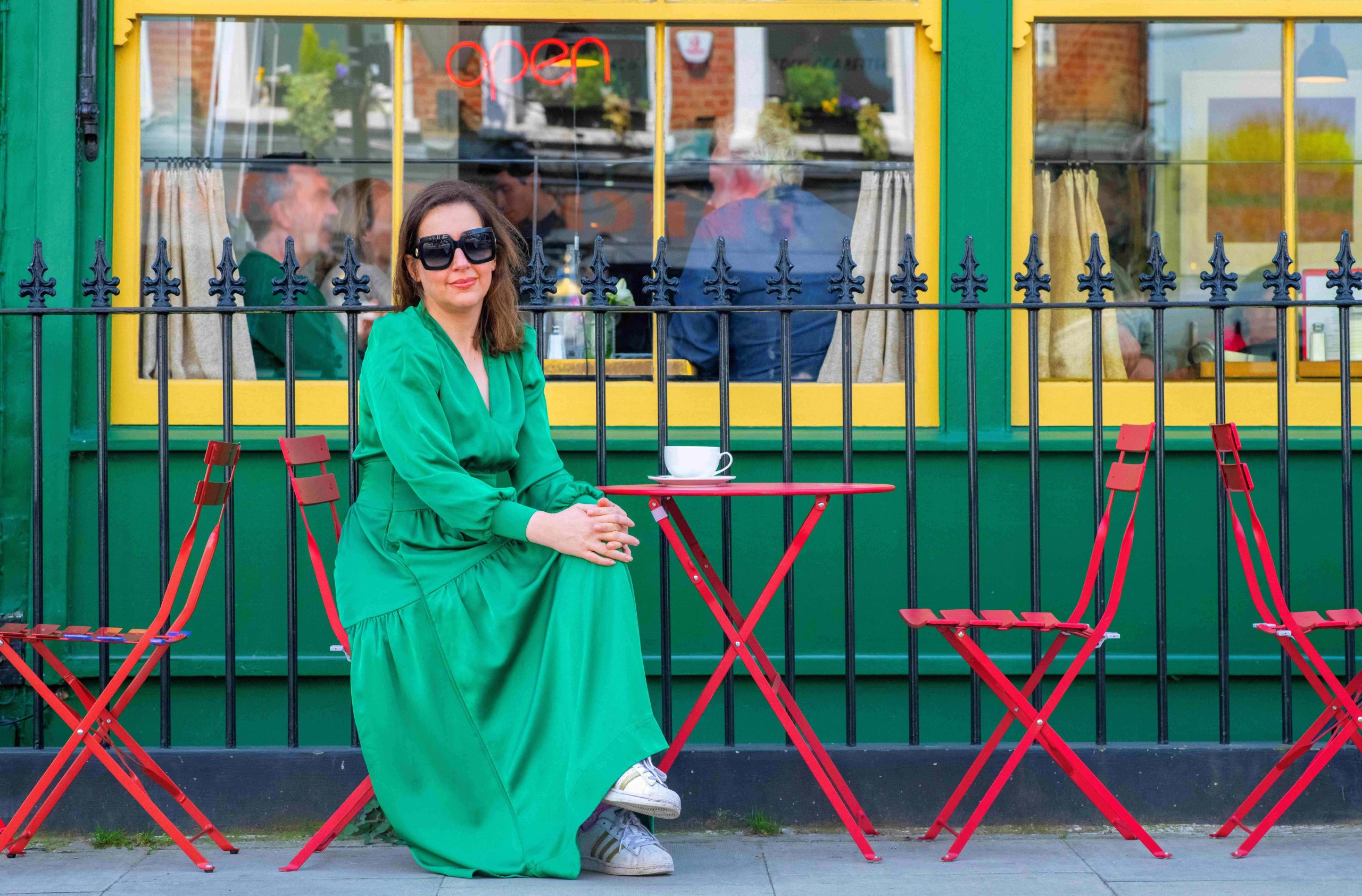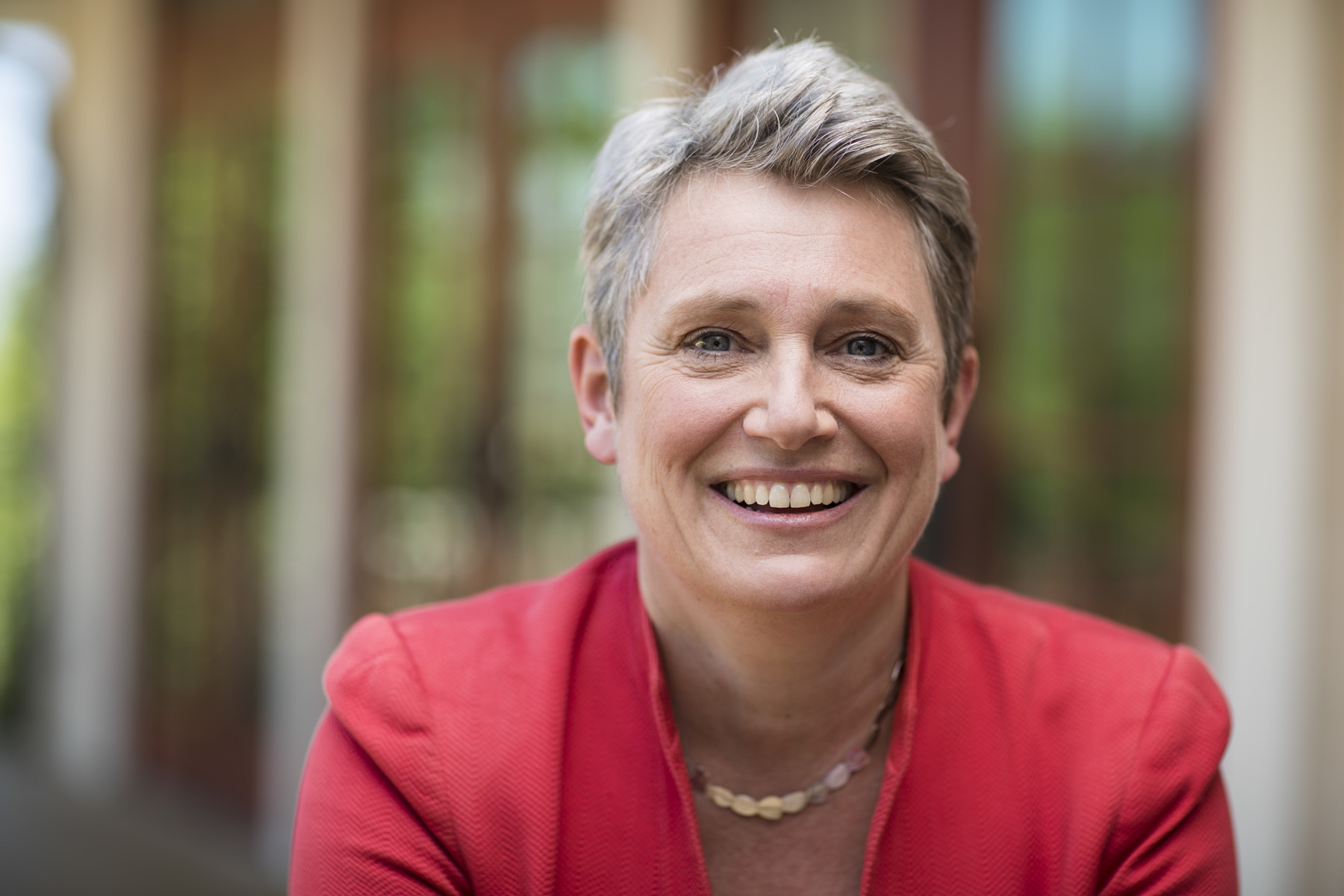As a writer and editor for twenty five years, when I moved to this area I started contributing to On The Hill magazine. I have decided to chronicle what’s happening in the world right now and this is my Corona Diary.
Nicola Manasseh
Week 1
Thursday 26 March
The message to stay at home seems to be getting through. Yesterday when I took my half hour bike ride – I sanitised the bike handles with wipes and wore gloves – the streets were significantly quieter than usual. Often construction workers with face masks were the only people out and about, and joggers of course. I stood behind my sister-in-law’s gate and said hello to her, my brother and their two youngest kids. People are calling this period Love In The Time Of Corona and just this morning, after four months in this block of flats, I met the neighbours who live below me. I now know Wednesday is bin collection day and am becoming familiar with when the bus stops on the street, though rarely anybody is getting on or off. More than Facebook I’m using the Nextdoor App to connect with my immediate community.
When I see old people it’s as if they are exhibits in a museum. I look at them more closely and for longer. There’s been so much focus on them as the most vulnerable and their precarious situation also includes the fact that apparently some care homes are planning to close. Last night listening to TV News, which I never used to do being a radio lover, I cried to learn that London has nine thousand homeless people.
Online I found an inspiring post that says – When you’re in a dark place, you sometimes tend to think you’ve been buried. Perhaps you’ve been planted, so bloom. I do feel like, for now, I’m blooming at home, as I produce paintings and collages that I love, new interesting meals – sautéed okra with sweetcorn and fried onions was a great discovery – and I’m singing more than three songs every day by following the lyrics on YouTube videos. I’m also doing things that only in a slowed down reality would I think to do, like organising my icloud photos or looking through LinkedIn contacts to see if I’ve ignored a good connection.
Sometimes I wake up in the night with anxious thoughts for the future but listening to meditation music soon relaxes me. Also knowing how empty my diary is since my life coach clients have wisely chosen to retreat right now, I’m not bothered if my sleep is interrupted. Imagination and productivity keep me calm and content but I did feel very sad last Friday evening when I couldn’t be with my family for our regular Friday night dinner. In a few weeks we have the important Jewish holiday of Passover and it will probably be the first time in his life that my father doesn’t have the ritual meal with all his family.
Friday 27 March
This should be the day that all the children I know would be starting their Easter holiday break but they’ve already been at home for the last week. Normally at this time parents would be putting their kids in sport day camps, making plans to go abroad, some to activity centres or places where the kids can run around, largely unsupervised. Now even beauty spots in the UK carry the sign – Wish You Weren’t Here. As I passed by a church and saw the familiar sight of a father playing ball with his children in the garden area, I realise that parents and offspring are entering a very unique phase in their relationship, which is characterised by quantity time, and hopefully, quality too.
I went to Roni’s bakery yesterday morning to get a treat cappuccino and the owner had received a letter. He couldn’t decipher the handwriting so he asked for my help and I read aloud the kind words from a doctor, thankful for free coffee. The only other customer in the shop, as we go in two at a time, wanted to ask for something and it was strange but nice to hear her sentence begin with “Good morning. How are you?”
Such a shift to re-engagement is happening in so many ways. We’ve begun a journey that is already showing me what I really need, how much I have and the true value of human connection. As health is the new wealth so kindness is the new cool. In the afternoon I biked to the empty high street close to Camden Market, and for the first time I noticed just how many willow trees there are around the Lock and hidden walls covered in foliage.
At 8 pm, thanks to a single post a week ago hashtagged clap for our carers, London lit up in blue and people from all over the UK, including the royal family, went to their doorsteps and windows, to applaud the NHS. Money and practical gifts like phone chargers have been sent to key workers and this gratitude and unity gives me goose bumps and misty eyes. When we celebrated the new year of 2020, the number felt so promising. Twenty twenty vision, people were saying. Who would have thought that our focus would be on how to fight a killer that we can’t see, that leaves people breathless and dying, and as one TV reporter said from the USA where New York has overtaken Italy and China in the number of people infected and where over three million people are now unemployed and the world’s biggest economy is most definitely in recession, Covid-19 is setting the timetable.
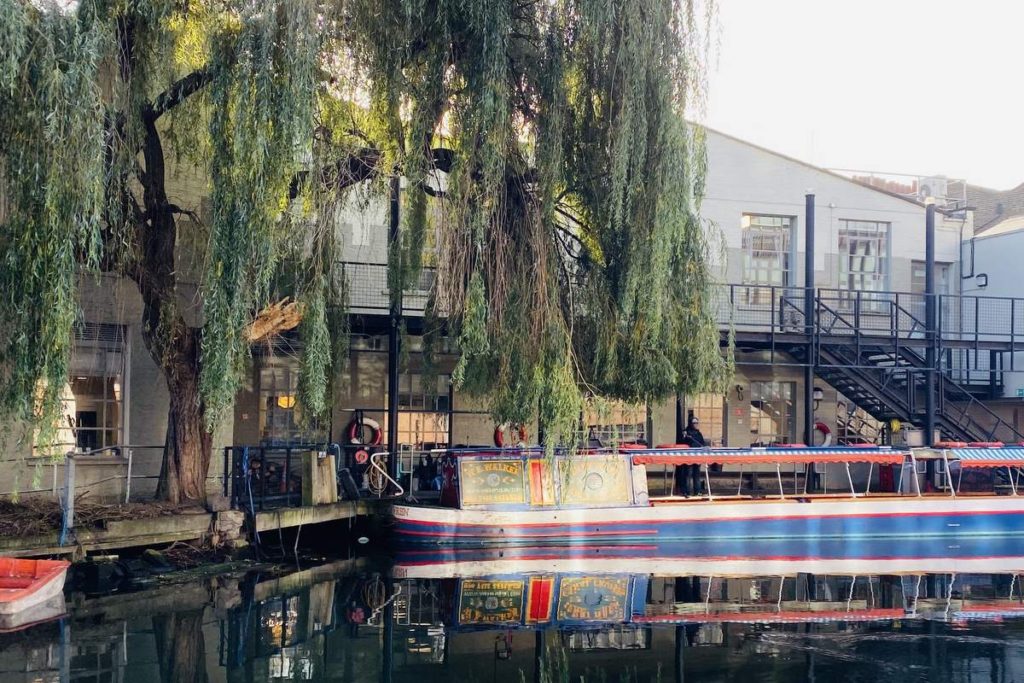
Saturday 28 March
The moment I wake my first thought is about what’s going on in the world and not, as in the past, about my plans for the day ahead. As I said to somebody yesterday whom I’m planning to meet online, I no longer have appointments in my diary, only rhythms to the day. Mornings to create and listen to the radio, afternoons I read and exercise. According to the Health App on my phone, the number of steps I make daily has decreased significantly but I’m also consuming less and mostly eating vegetables and fruits. The well-known expression, we are what we eat, is resonating as I shop more carefully and spend a longer time in the kitchen. After a week in pyjamas and tracksuits, I put on my jeans yesterday and was pleased that they still fit okay. The mono conversation we’ve been having, now includes people talking about the meals they make and I’ve been watching Jamie Oliver’s daily programme Keep Cooking And Carry On to get some inspiration as we, in his words, “claw back on our reliance on convenience.”
Each day new News. Yesterday our Prime Minister and some of his cabinet tested positive for the virus. The number of NHS volunteers rose to 750,000 and people are coming out of retirement from the police force to be of service. The food industry is working twenty-four hours, especially bakers, whilst farmers are wondering how they will find seasonal workers to harvest crops, when normally they rely on people from abroad. Pharmacists who are also on the frontline, are feeling overwhelmed and generally in need of face masks. Sadly I’ve heard that reported cases of domestic abuse have almost doubled and not enough hotels can be convinced to house the homeless.
A life coach colleague said on an online video that hope is an attitude and I find myself signing off emails with the words ‘love, light and imagination to you.’ The bigger picture may be the coronavirus (I refuse to give it a capital C) and a worldwide pandemic, but my immediate reality is one of kindness and optimism. Yesterday as I stood under a canopy of cherry blossom trees near Swiss Cottage library and a confetti of pale pink petals swirled around me, I momentarily felt like a bride in union with nature. I feel blessed that my list of things to do can now be as basic as – visit the trees, make a birthday card, declutter cupboards, do a face mask, plant seeds from the food I’m eating, and finally, after eight days of patient detoxing, shampoo my hair.
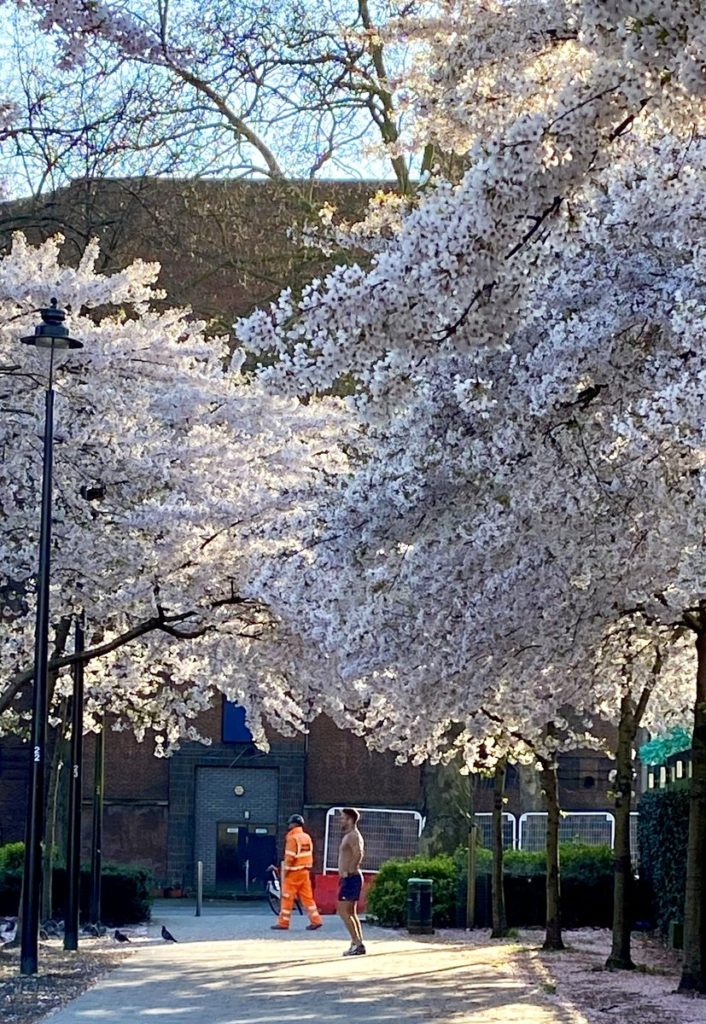
Sunday 29 March
Yesterday I only went outside to my balcony. After a week of sunshine, there was none and it was cold. I stayed solely indoors because I felt exhausted. Ten days of intense concern, constant phone messages and updates, and an onslaught of emotions ranging from fear to optimism have made me deeply tired. Not to mention, all the many changes. I’m sure that I’m not alone in having moments when I feel a tickle in my throat, wonder if the virus has got to me and don’t relax until I’ve had a cup of hot water and realize I’m okay. It didn’t help that in a neighbouring flat, there was drilling all day. Although now us close neighbours speak to each other from our balconies, it was good to be warned that this was going to happen.
Online at Nextdoor, people are complaining that some cafes which sell food are still open in Primrose Hill, and thus encouraging locals to go out for takeaway coffees. It seems we are all learning how to balance safety and service, to thoroughly reduce physical movement and yet avoid mental instability and complete economic standstill. There are now 600,000 infected people worldwide and 27,000 have died. When I heard that as of Thursday night, South Africa went into lockdown I remembered how at the start of February when I travelled there for a week, they took my temperature by laser thermometer at the airport. I pray that our European crisis is not replicated in Africa, where apparently people are already dealing with unprecedented swarms of locust.
So yesterday, indoor-ing, I got creative, sometimes with my headphones on listening to newly discovered 8D music. Although I’ve always painted, I now have the time to work with bigger canvases. I’m using a lot of warm colours, especially red, the colour of the root chakra which also symbolizes belonging and trust. Sometimes I scroll through Google Images to get inspiration or look for bits and pieces in my home for collages. I know it’s important with art to enjoy making it and not fret over the end result. That’s something that hobbies teach us because we often do them with no monetary gain or even someone to witness what we’ve created. A jigsaw puzzle that takes hours, even days, to complete, only to be put back in the box afterwards, is the ultimate teacher of this idea – don’t think about the destination, just enjoy the journey. Strange words to write at this time but it’s also weird that, right now, to be a responsible citizen, you must just hang out at home, unless you’re helping others.
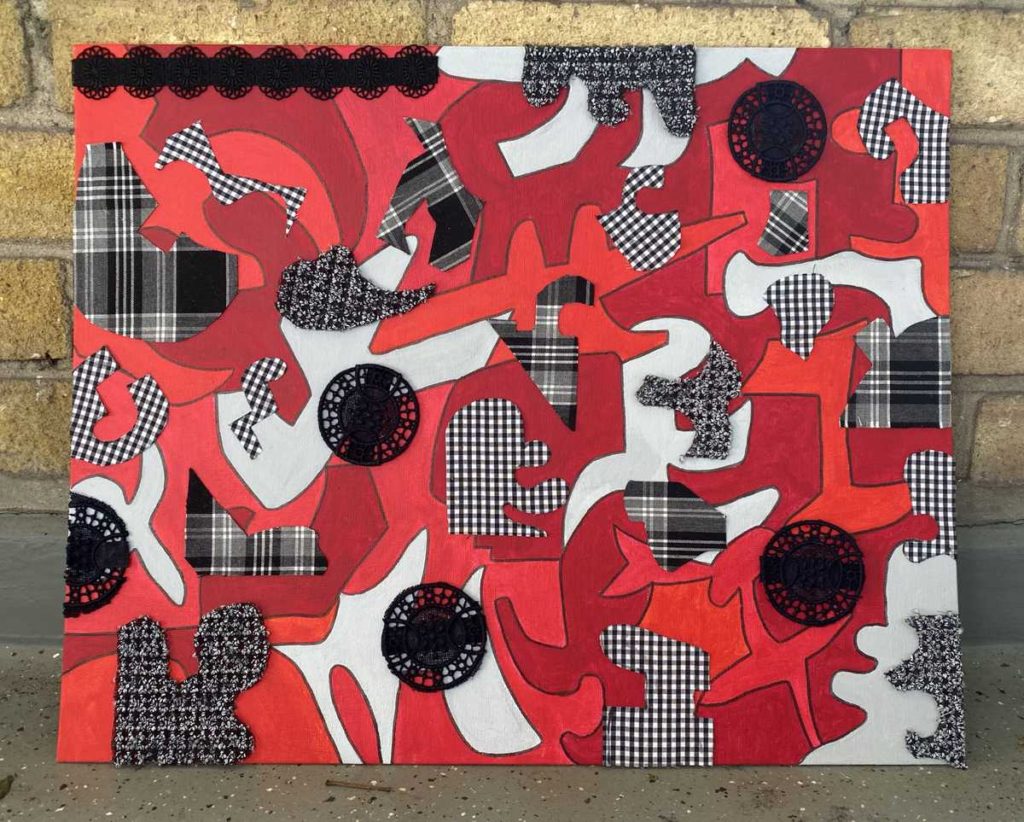
Week 2
Monday 30 March
This morning I planned to do an online free Feldenkrais class. It was easy enough to roll out my yoga mat and connect via Zoom but I couldn’t hear the teacher because of the building work happening in the next door flat. I was told it would go on for another hour so decided to take a very slow walk in the neighbourhood. On Primrose Hill high street, where I can now stroll in the road, I saw that only two food stores and the butcher are open. I wasn’t surprised to see that the two lovely owners of Ethereal had put a sign on their door to reach out to those in need. Heading home, I decided to queue outside England Lane’s Tesco to get some supplies. From behind her partition, the cashier told me that she’s noticed a surge in people bringing their own shopping bags because after all the battle against single-use plastic is still on. I felt humility interacting with this woman, one of our ‘minimum wage heroes.’
We are, it seems, becoming more mindful and present. Not forgetting the stealth at which this virus is infecting and killing people, I keep witnessing small miracles. On this morning’s radio, yes an increased number of corona cases, but I also heard how Morrisons supermarket are giving ten million pounds worth of groceries to food banks and how care packages for the vulnerable have started to go out. With less meat imports and exports, fewer animals are being killed, and in Spain, for example, the pollution level has decreased by fifty percent. In my own life, I’m loving to hear how people I know from my parent’s generation are visiting parks for the first time in years and realizing that life is not just about work. On the News was a young woman whose become famous online with her quarantine workout plan for elderly people; she has them doing weights with tins of food.
Yesterday almost resembled my childhood Sundays when I would visit one of my grandmothers in the morning and the rest of the day was nothing much to do. I can still remember how, unless I wanted to watch Songs Of Praise and that darts game show Bullseye on telly, I was better off reading or playing with my cuddly owls in my bedroom. Two of the oldest people in the world, a man and a woman both British and coincidentally born on the same day, had their 112th birthday yesterday. They’ve lived through two World Wars, the 1918 Spanish flu and now they are experiencing this world pandemic. “Keep life simple,” said one of them, “and trust all will be well.”
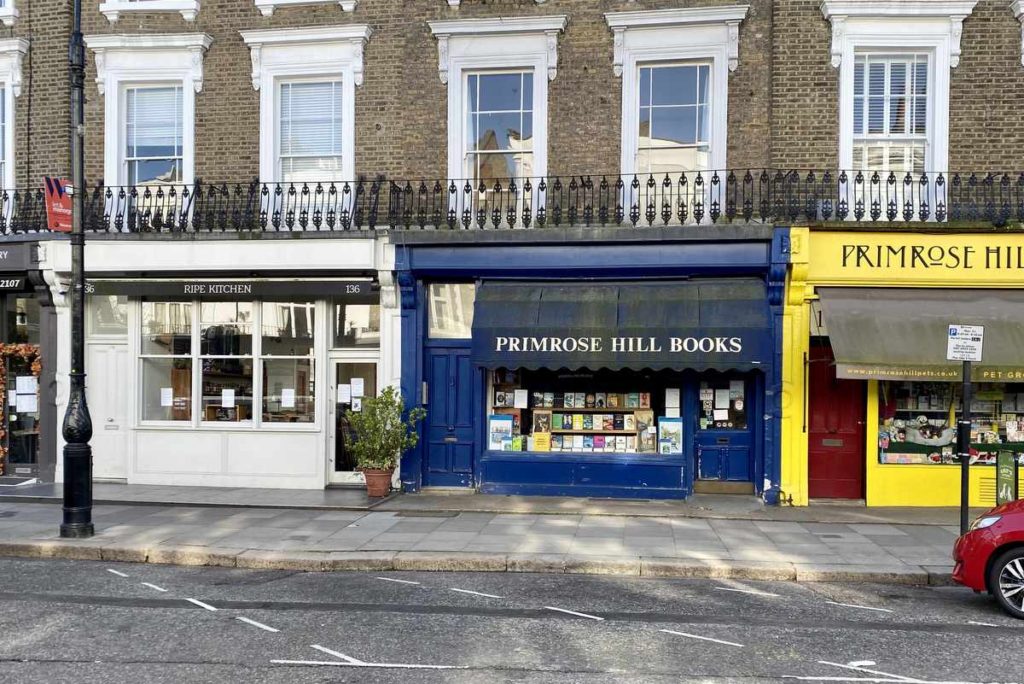
Tuesday 31 March
Our London weather right now is in harmony with our present predicament. Bright mornings to wake up to but cold and wind to put us off leaving home. It’s been over two weeks since I’ve had an evening or night out, and so far, no frustration with that. This paring down of my life to basics and the constant hearing of the word ‘essential’ has made me think about what are my bare necessities and which of them I share with other people. I feel I need films, media and books but it’s music that I would take to my desert island. When I heard Jack Savoretti’s song Andra Tutto Bene, Everything Will Be Alright, I shed compassionate tears and was not surprised to learn that the song is like a national anthem in Italy, where twelve thousand people have died.
I’m learning that things I can do are more important than things to have. Though I believe I’ll be fine dressing again in the future, I see stuff at home like fancy clothes and pretty jewellery, and they all feel slightly ironic. What this crisis teaches is that our values, which come from within ourselves, are fundamental. As I speak to people whose families are in other cities and countries, I also realize how blessed I am to have my family nearby.
On a bench in the park I cloud gazed and watched a small amount of people pass, a few trotting with their dogs on leads. I thought about how one moment I’m so happy that nine thousand people got tested this last weekend in and then I hear that in Germany over one hundred thousand people are tested weekly and feel confused. UK hospital admissions have increased but not accelerated but then I learn that the peak is yet to come. Four thousand beds are being prepared at the new Nightingale Hospital at East London’s Excel Centre yet if I think beyond our island to places like India which is so close to my heart, I’m fearful at what might happen there with it’s one billion plus population, most of whom have to live close together. Already some people have been killed just in the attempt to get home to their villages.
I spoke at length by phone with my sister for what we call ‘a proper chat.’ She said something that gave me an eureka moment, in connection with how this coronavirus attacks the respiratory system. Up until now, many of us have been too busy to be conscious of our breathing which we take for granted. Factories emit pollutants and the Amazon forest, the lungs of the world, has been drastically destroyed. We are now being forced to face the universal truth that breath, and how and what we breathe in and out, is the essence of life.
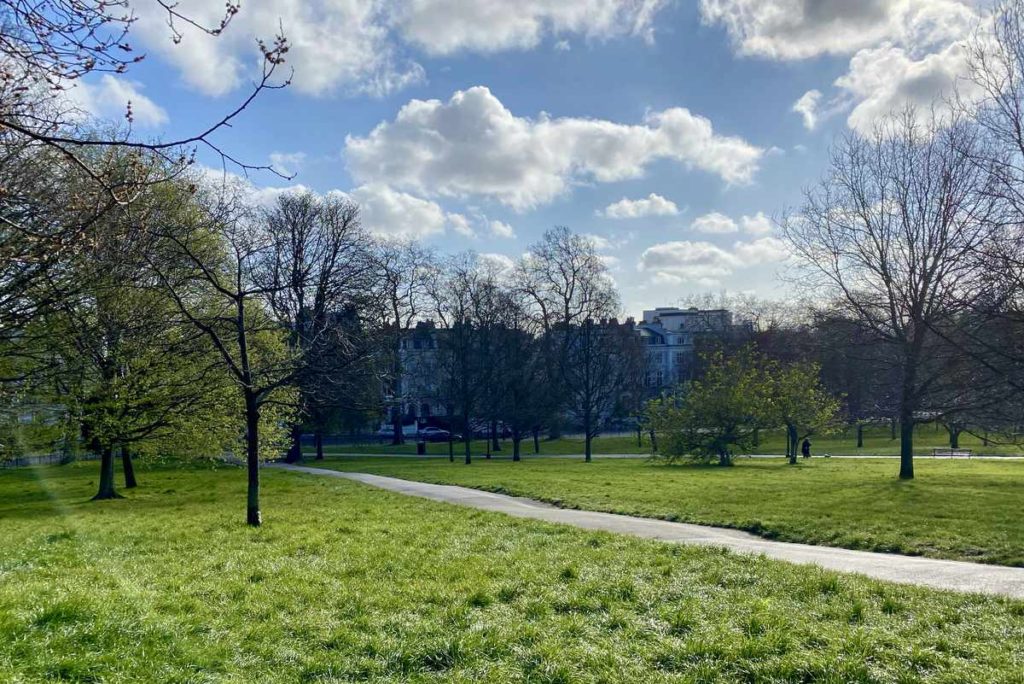
Wednesday 1 April
Last night I watched the News and afterwards felt like I’d been thrown into a fierce storm. The virus is going further faster and the latest facts left me feeling drenched. A global shortage of chemicals for drive through testing, three hundred and eighty more UK deaths since yesterday, including a thirteen-year old boy. London still with thirty percent of all cases but Northwest and Southeast England catching up and one in four doctors can’t work. With nearly 100,000 cases in New York, a field hospital in Central Park has been set up and Italy has now reached 12,500 deaths. Numbers and more numbers, the worldwide count is 858,669 cases and 42,151 deaths. Thousands of UK nationals are stranded abroad, charities are struggling as their shops shut and money-raising events are postponed. Russia has passed a law in which you can be jailed for seven years for breaking quarantine rules and the twenty million people of Lagos, Nigeria are now in two weeks lockdown, but what happens once they come out of isolation?
Earlier in the day I was listening to a radio talk show about how people are coping financially and kept repeatedly saying aloud – what a mess! So many small businesses gone bust, a million unemployed many of whom haven’t yet accessed government help or fall into the small percent not eligible for it, others who have to renegotiate rent and bills and take mortgage holidays. The property market including Airbnb is frozen and most face to face businesses, for now, history. The world economy has fallen into recession. Meanwhile millions of parents have to adapt to a new lifestyle as they’ve lost their offices, must do home schooling and occupy younger children, and with a decreased support system. Whereas some people are bored in isolation, mothers and fathers, and especially single parents, are probably feeling overwhelmed, whilst their children miss normal structures and being with their friends. How we need to be generous with each other, to banish the inner critic and to keep our self-talk positive and encouraging.
When in January I started posting my micro poems online, I constantly used the hashtag We Are All In This Together. Instagram told me that there were one hundred plus posts with this hashtag and today there are 180,000. This uber challenging time is a wake-up call for us to come together as one world, to act local but think global. As the letters of the word TEAM suggest – Together Everyone Achieves More.
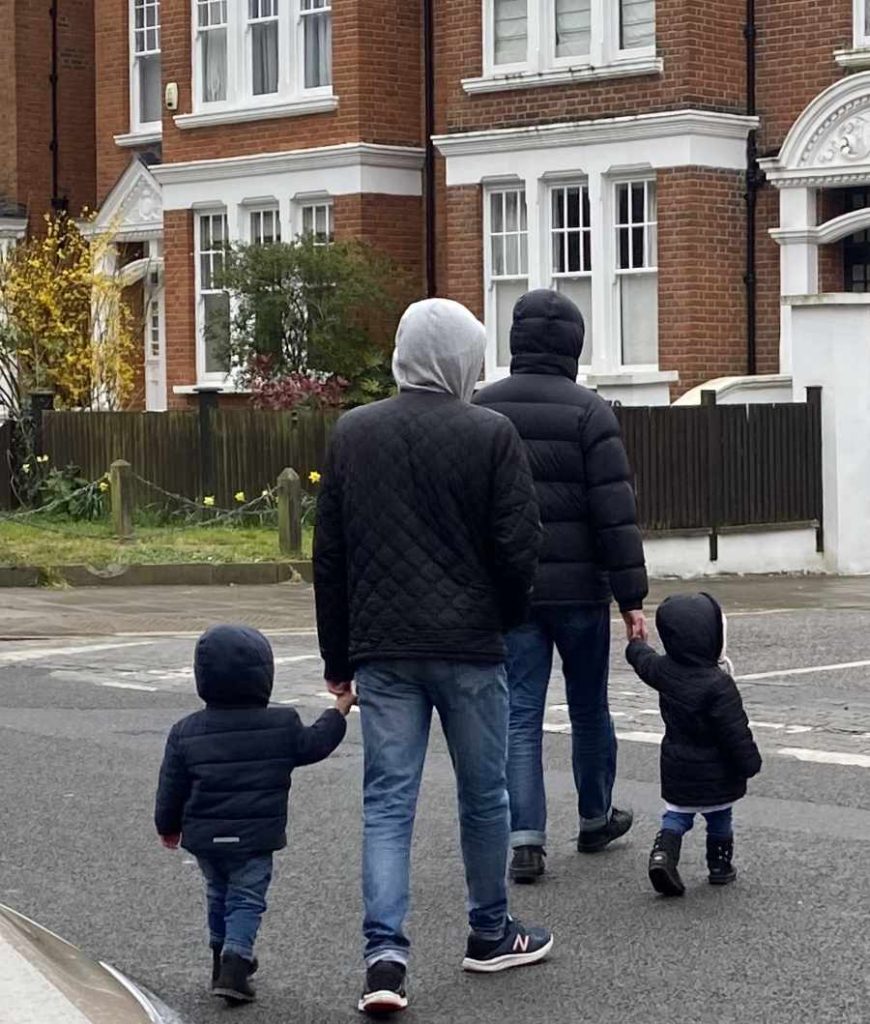
Thursday 2 April
Unsurprisingly, April Fools seemed to be cancelled yesterday. We may need humour right now but not another “Really? No!” The only joke I heard was that some British football clubs will continue to pay thousands a week to their premier players whilst suggesting their non-playing workers, who weekly earn a few hundred pounds and have already taken a twenty percent cut in salary, are paid by taxpayers. Thankfully Gary Linnekar, whose giving two months of his salary to the Red Cross, joined the conversation to say that players themselves will undoubtedly be considering how to donate to people in need.
All aspects of life are being examined. As chiefs, experts, politicians and the public are interviewed from their laptops, we get a glimpse of how people’s homes look and colleagues working online are seeing each other without their usual professional facade. Last night a newscaster signed off as if she was talk show host Ellen with the wise words “look after yourself and each other.” One part of this alternate reality and trending transparency that I’m enjoying is to see photos of unpeopled cities, and to re-appreciate London’s architecture.
David Hockney has sent paintings and a letter to UK people to give them a break from the news. He says the only real things are food and love. That sort of sums up my days – life is preparing and making meals and all my other activities are a form of loving myself and others. Yesterday at my local greengrocer (a place at the top of my gratitude list!) I asked why the sweet potatoes were so up in price. I was told that now that there is only one driver per lorry coming from abroad, some imports are taking double the time to arrive. For instance we mostly get broccoli and cauliflower from Spain until our warmer months come. The greengrocer was selling courgettes at the same price as he bought them from the market and absolutely refused to tell me how much broccoli, which he didn’t have, is going for today. I felt like a better person for learning more about the vegetables that twice daily reach my bowl; and with this isolation, interacting with ‘team greengrocer,’ instead of shopping in a grab and go way, felt like a one plus one for free.
Recently the UK has spent over ten billion pounds on groceries but the verdict, from industry food experts, is that the majority of people weren’t buying way too much. Apparently, on average we bought one extra of most things and this combined with a slower arrival rate of goods, can quickly deplete supermarket shelves. Going forwards we just need to remember, as Gandhi said, there is enough for everybody’s needs but not for everybody’s greed.
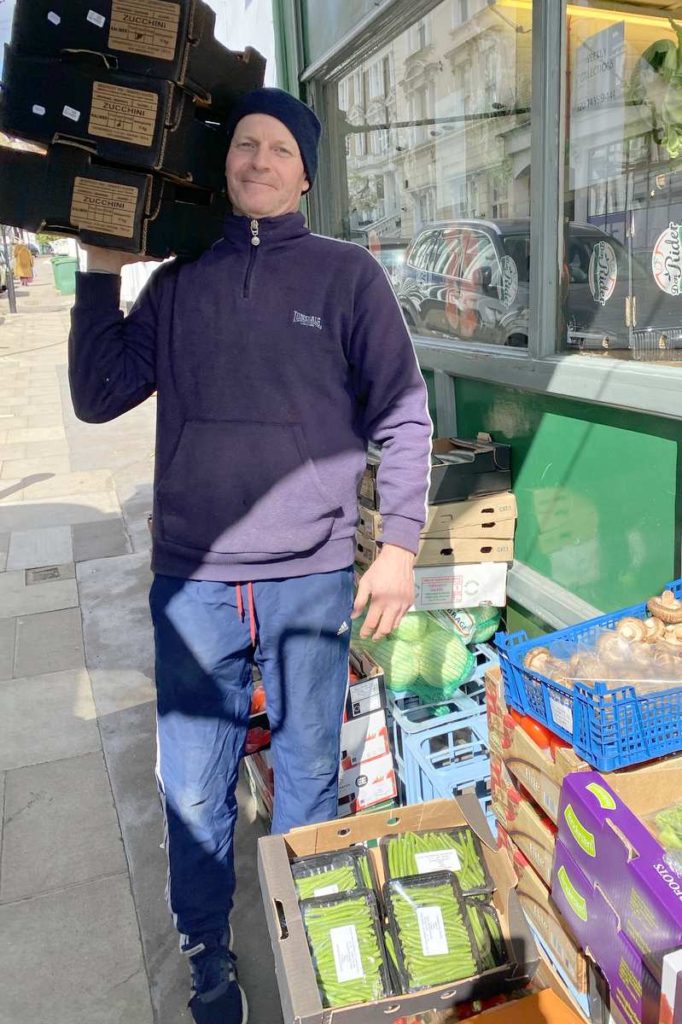
Friday 3 April
Somebody, a neighbour, walks up and down our avenue a few times a day, picking up litter and twigs. I don’t want to judge her, after all she is doing a positive thing. However I do wonder if she is an obsessive cleaner and having had too much time to tidy her home, she is now widening her territory. Seeing her has got me thinking about loneliness. Many people still hold that old-fashioned idea that if you’re not in a romantic relationship or marriage, you’re more likely to be lonely. As I’ve learnt, and as lockdown shows, having or not having a community is what makes or breaks you. Sure there are times when I want somebody to witness the painting I’ve done or taste the meal I’ve cooked, and I’m lucky enough that I can send a photo or video to a loved one here or abroad. What about old people who are not in a digital space or others with fear of the tech stuff, inferior phones or can’t afford unlimited wi-fi?
I’ve heard people call this period ‘shelf-isolation’ as books can be such wonderful companions, provided you’re bold enough to put down a book that is not satisfying you. Though books, like films, give us stories to distract or uplift us, people need people (or animals) and that’s why it’s vital for those who feel lonely or lost to admit their vulnerability, to show their upper lip is not stiff but quavering, so that others can reach them. As I’ve discovered, it helps if you’re living alone, to sometimes talk aloud, especially when you need reassurance. There is in fact scientific evidence that people who speak to themselves, like tennis players do, are more likely to achieve success in life! In the mornings, when I’m ready to get out of bed and am feeling uncertain about what the virus has been doing whilst I was sleeping, the first thing I might say aloud is, “Hello bedroom. Good morning birds…loving those real tweets!”
I look at my diary which is now marked with online meetings, reminders like – free trip to the National Theatre via YouTube, and the upcoming religious festivals. Passover and Easter are next week and Ramadan begins in about three weeks. An Iranian friend told me how challenging it was not to celebrate the Persian New Year in March with her family and I think about how those who observe Ramadan will experience fasting every day and eating the evening meal, possibly solo. The feeling of disconnection can cause sadness, even despair, but lonesomeness is alleviated when you remember it’s not only you in isolation, missing group celebrations. As it is said in Arabic, Inshallah, God willing, everybody observing high holidays will not feel lonely in their aloneness, or as I like to say, all-oneness.
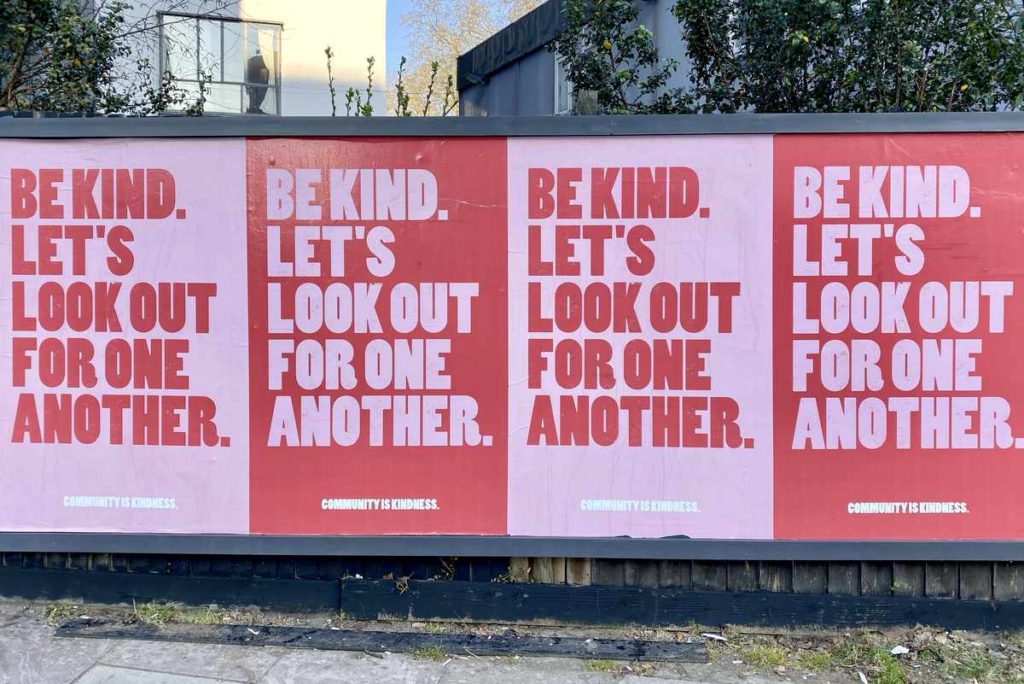
Saturday 4 April
Today is the virtual Grand National horse race on TV, which you can still bet on, but all the bookies’ profits, it has been said, will be donated to NHS charities. If it’s popular, maybe we will have a virtual Wimbledon too. I saw that like many TV shows that are travelling back in time, Match Of The Day has become Match Of Their Day. Today is also when numbers start appearing, not in the thousands but millions. Over one million corona cases worldwide, more than ten million unemployed in the USA and in the UK one million-plus new people on Universal Credit.
Last night I had my first social event in ages. Via WhatsApp, I connected with two school friends whom I usually meet four times a year for dinner in a restaurant in town. All three of us had a glass in hand on our three-way video call. One of my friends is a NHS dentist and these days she is on the phone triaging and giving dental advice. I didn’t realize that NHS dentists are shut and she said that if somebody needs a filling, she will instruct them how to do it themselves with something you can buy in the chemist. “What about if you need a root canal?” asked the other friend and we joked if she would advise them to buy a drill from the hardware shop! At some point we got a little political, because friendship is being able to rant, and we talked about the urgent need for global co-operation, especially from the leader of the Western World. One of us pointed out that when the 2014 Ebola crisis happened in West Africa, President Obama urged the UN assembly to make a considerable effort to help those affected. With the global impact of coronavirus and now that, for example, the European Union is ruling on border control and state aid, quality of leadership and expert opinion really matters.
At some point one of my friends said that she needed to take a bus earlier in the day. “You went on a bus!” us other two responded in synch and shock. Her comment was interesting because, even though she didn’t touch anything on the bus, we thought she was very brave, and, also it was weird how this small detail, usually such an insignificant action in life, could now be a headline in our catch up. I was reminded of twenty years ago when I was backpacking in India and a fellow traveller might ask, “What did you today?” and I might have replied, “This morning I sent an email.”
After almost two hours of chatting we hung up and the first thing I then did was to find my dental floss and put it in the basket where I keep the TV remotes.
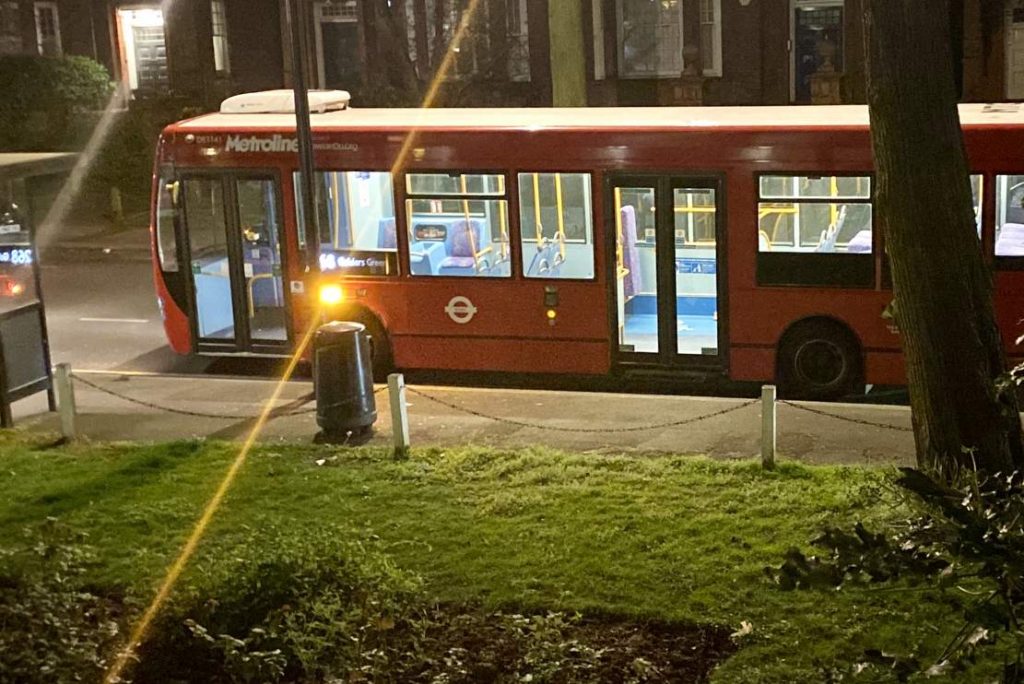
Sunday 5 April
I’ve been waiting as patient as someone about to enter a shop, to ask myself that popular question – What will the new normal look like? There are plenty of unpleasant theories, ideas that would limit our privacy and free will, but I’m not going to consider them because words, whether spoken or written, have intention. When I observe how local strangers now greet me and seem quite happy to chat whilst queuing, I don’t fear we’ll lose public discussions and people initiation, unless we succumb to peer pressure or hoax realities.
Today I took a walk, without my jacket, along sunny roads. Mostly I strolled centre street, along with small kids on bikes and people not walking in a straight line so that they could be two metres apart. I thought to myself what a wonderful world to see so many parents being with their children. At one point I climbed somewhere high and could see down into a very small garden. A father watched his child play and I smiled at the idea that within time, he’ll be hogging the tiny trampoline for himself. As it was, before long, he was playing with his child in an imaginative game and then I stopped looking. At Belsize Terrace it’s obvious that an adult has started chalking with the children.
I suspect on the other side of this virus, there’ll be more value on rest, and hopefully still the sound of birds and music filling our streets. If I stay true to positivity and in control of my perception of situations, then I don’t think I’ll be paranoid about touching things or suspicious of being with people who are feeling in good health. In Japan, where people bow to greet each other, they have always been very into washing hands and usually wear face masks when they have a cough or cold (ever worked in an office and wished that the colleague with a bad cold would cover their mouth?!) There’s also a Japanese law that anybody with a ‘novel illness’ must be hospitalised.
Having just seen on Nextdoor that you can now nominate someone for The Good Neighbours Award 2020, I wonder if our altruism will last? I feel hopeful as so many people have already experienced the emotional reward of doing ‘something for nothing’ and have understood that we are all interconnected, like how key workers can’t do their job effectively without lockdown loungers staying at home. Also previously undervalued hospital workers, carers, cleaners, cashiers, shelf-stackers, service drivers and shopkeepers now have a new social standing and thanks to journalists we are all being asked to think about care home residents, the poor, slum-dwellers, the homeless, refugees, prisoners, victims etc etc, indeed, the entire human race.
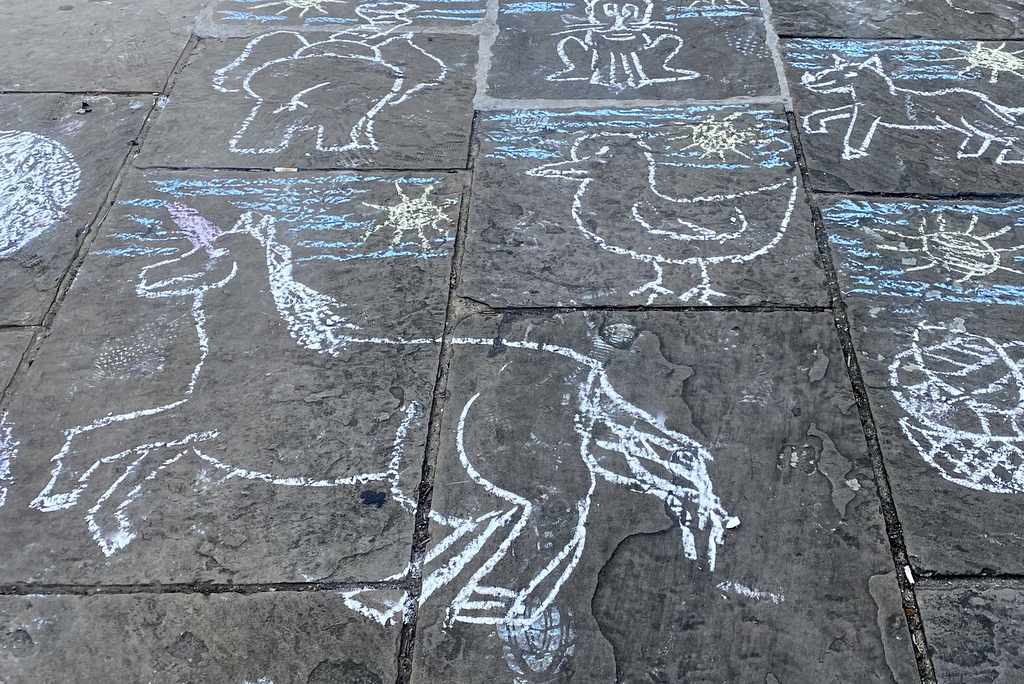
Week 3
Monday 6 April
Yesterday evening I felt very British as I watched another episode of the TV drama Belgravia and before that, the Queen’s speech. I was impressed with how well she spoke about the ‘disruption and enormous challenges’ and the need for ‘pause and reflection in prayer or meditation.’ She remembered her first ever broadcast in 1940 when evacuated children were experiencing the painful separation that so many of us are going through now. She referred to humanity’s ‘instinctive compassion to heal’ and the images that accompanied her speech showed gratitude for all frontline workers and the people who are cheering them on with Thursday’s national applause. In Italy there have been minutes of silence to remember those who have died and, having lived in Israel, where twice yearly there are minutes of silence and stillness, not even a car moving, I hope we may experience more countries pausing to conjointly remember what needs remembering, now and in the future.
Following a summery weekend, we are seeing that individual actions have collective consequences. Some parks especially in South London, where there are the greatest number of corona cases, were crowded with people ignoring the physical distancing rule and choosing to sunbathe rather than go out just for exercise. Hammersmith and Fulham parks have been closed and I imagine that their pavements will now be crowded and isolating people will feel aggrieved. I don’t believe that all parks will be closed because I think people have realised that if you honour autonomy, then you need to take responsibility and not forget, as our ninety-four year old Queen said, this is a ‘common endeavour’ and what of each us does has a ripple effect. As I don’t have a dog or kids, and I do have a balcony and small green spaces around my block, for now I’m staying away from the parks and feel blessed to be able to walk in our lovely neighbourhood with its’ trees and impressive architecture.
In other news, people are changing the lyrics to popular songs, and the coronavirus versions of Queen’s Bohemian Rhapsody are getting online notoriety, ‘caught in a lockdown…no escape from reality.’ Boris Johnson has been hospitalised since becoming infected ten days ago and the newly elected Labour leader Keir Starmer gave a public statement in which he said that no matter which party you voted for in the last election, we need to support our present government so that it will succeed. He gave me hope that constant political conflicts and criticisms will be suspended and replaced by, to quote Queen Elizabeth II, unity and resolution.
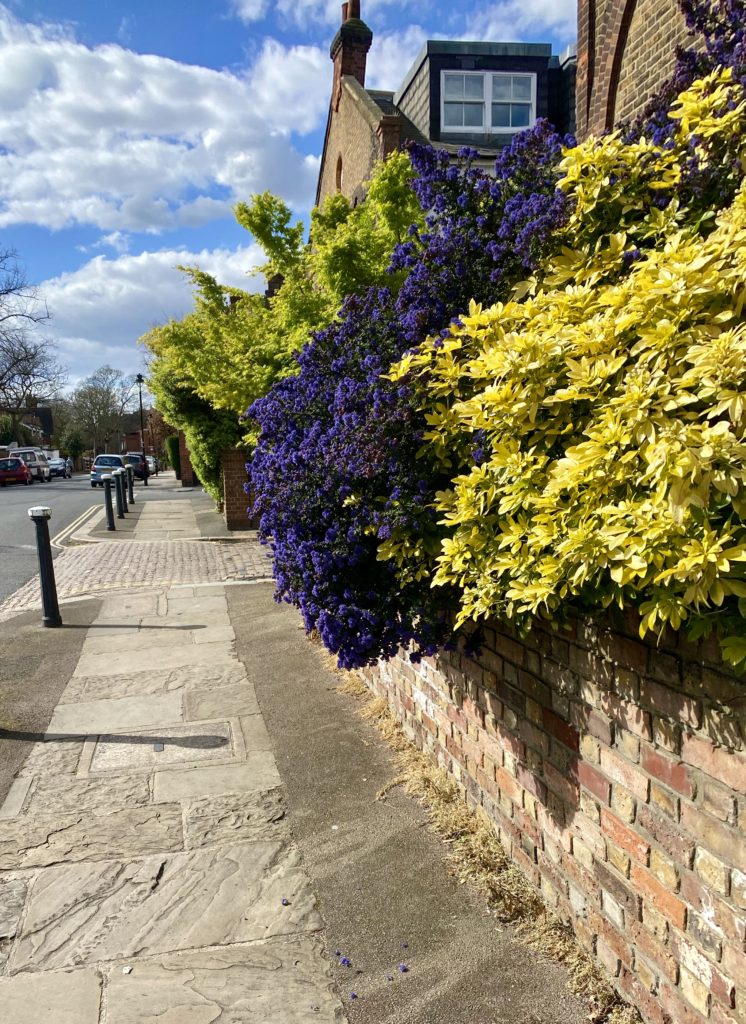
Tuesday 7 April
I can’t get a consistent answer from broadcasts and newspapers as to how many tests are happening a day in the UK. As much as I am for the first time becoming very familiar with my neighbours Scotland, Ireland and Wales, the news about testing is varied. Countries with experience of the Sars virus and which do contact tracing are obviously fairing better than others and apparently because a Berlin scientist believed a test kit would be needed for Covid-19 back in early January, Germany, which also has a large number of hospital beds per person, has a very low fatality rate. Wealthy Iceland, with a population of less than half a million, has tested a higher proportion of its’ people than any other country. I read that Italy, with the second oldest population after Japan, thinks that its real number of cases is probably ten times the official tally. This question of to test or not to test is intrinsically linked to exit strategies, although in some ways we’re still in the entry stage of Covid-19. A plumber speaking on LBC Radio told how the majority of people he visits have to be told by him to keep physical distance.
As much as we’re united by this plague that has no borders I think each country will find its’ own way to exit, just as lockdowns differ. Whilst I heard that in the UK alcohol sales have jumped higher than grocery sales, in South Africa booze is banned and even walking down the road for exercise is not allowed. Whereas in Spain you can’t go more than fifty metres from your home, the Swedish government believe in herd immunity and right now, with about seven thousand cases and five hundred deaths, many public places are open and gatherings of up to fifty people are permitted. France just announced no daytime jogging or running and in Austria, where the curve has supposedly flattened, they plan to open small shops next week. Our government has said that we won’t be taking flights before June 17th, and the August Edinburgh Festival, the world’s largest arts festival, has been cancelled.
The wake-up call that we’re all having is the need to invest more money in healthcare and medical salaries, money that is largely invested in the military because we have this terrible habit of fighting with each other. A columnist at The Financial Times has referred to the cult of the health worker replacing the cult of the soldier. One image from the BBC News that doesn’t leave my mind is of a forklift truck putting a dead person in a refrigerated lorry to take to a makeshift morgue in America where over ten thousand people have died to date. There’s even talk of temporary burial plots in public parks.
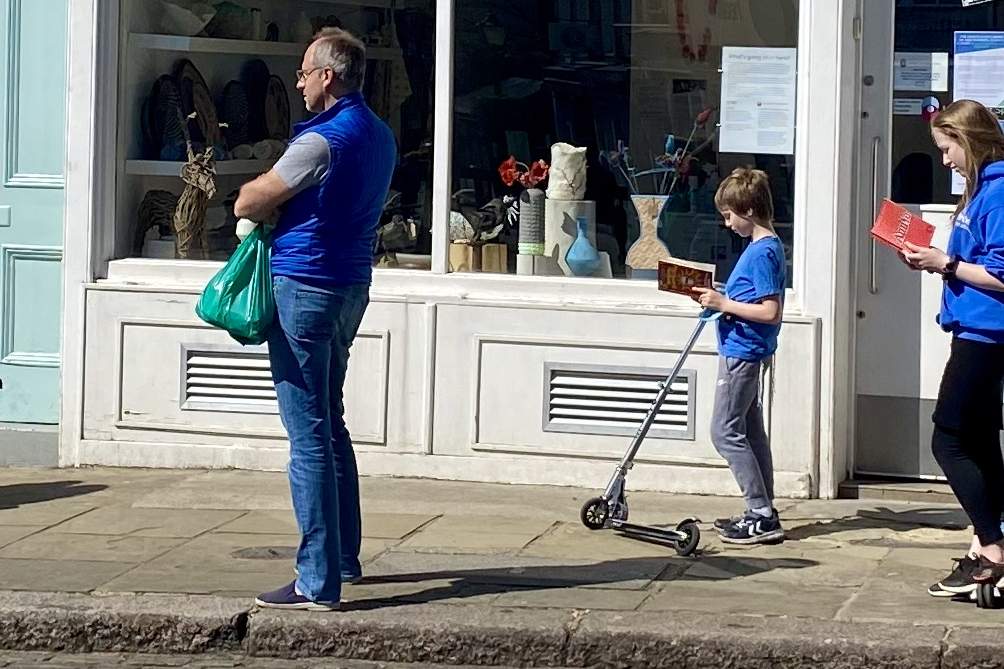
Wednesday 8 April
My wishes for a speedy recovery go out to the Prime Minister who is now experiencing first-hand the work of the NHS, reportedly stable in intensive care. Meanwhile his cabinet and the foreign secretary will act on his behalf. I see in online forums that many of my neighbours are quarantining at home with sore throats, tight chests, headaches, fatigue and thirsts they can’t quench, and most of them having been feeling unwell for weeks. Self-doctoring and self-care are very much the theme of this chapter of our lives. Within one week of the outbreak GPs established virtual clinics, but around sixteen million people in the UK still need treatment for conditions other than coronavirus and for mental health problems. One update is that private hospitals might care for some NHS cancer patients. I feel for women who are pregnant or about to give birth, likely alone, and maybe unable to have a preferred caesarean.
Five evenings ago I got a strong pain up and down my left leg. Not pins and needles, more like nails and hammers. I’ve had this kind of ache before but never so intense. During that night I kept wanting to google my symptoms and know more about what was happening to me. I resisted and instead I kept reminding myself that I was resting though not sleeping and that the hot water bottle I was moving up and down my leg would ease the internal agony. In the morning I gave thanks for ‘passing over’ so quickly to no pain. Today the festival of Passover is on my mind as this evening my London family and I will have a zoom seder, praying and eating together in separation.
In hospitals worldwide the drama is surreal. Last night I watched as cameras went inside and saw how much work and machinery is needed to give people oxygen and keep them alive. Then there’s all the palaver for nurses and doctors, working on twelve hour shifts, to ‘don and doff’ the PPE gear; if they have it. One doctor said that it can be alarming for old people to only see doctors’ eyes as they treat them from behind goggles and visors. Another described entering Red Zones as like ‘jumping out of a plane.’ As once doctors could be more reflective in their approach, now they’re having to make rapid decisions, even over whom they should prioritise for ventilators. Many spoke of the added hardship of keeping distance within their households at home. Unbelievably some people have verbally abused NHS workers for being able to go to the front of supermarket queues. I recommend these thoughtless ‘covidiots’ watch Stuart Ramsay’s ITV report from Northern Italy, Coronavirus – Into The Red Zone, which in terms of genre is horror combined with true story.
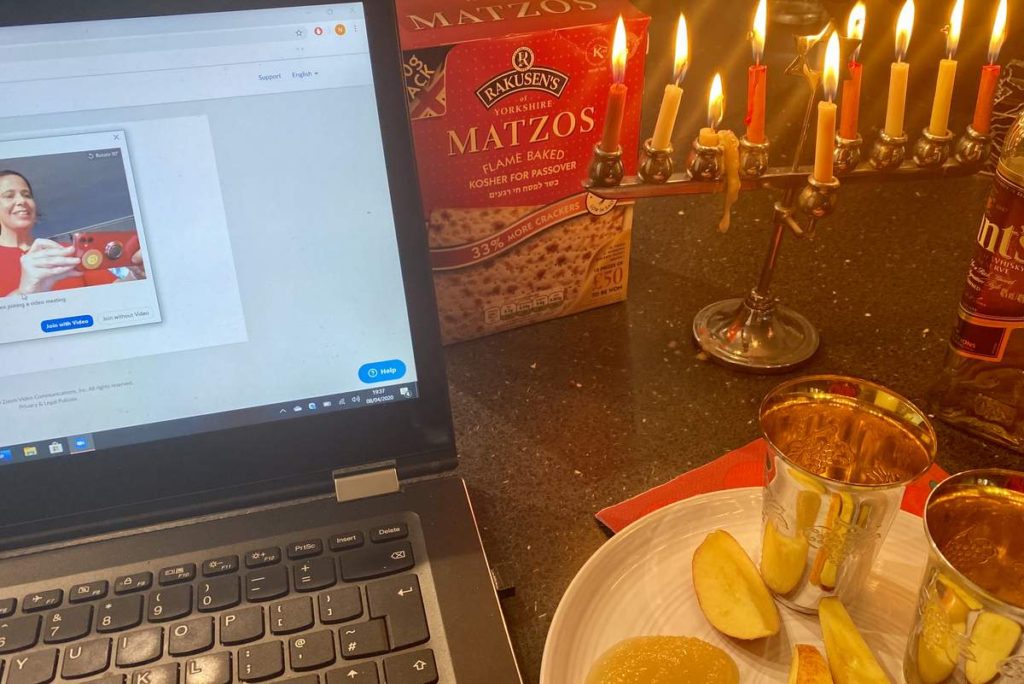
Thursday 9 April
It feels like being on holiday as, on my daily walks, I take small slow steps and notice everything around me, including all the rainbow paintings in front windows. No need for a handbag, nobody ‘bombing’ my photos, no desire to put on headphones because the many birds, including seagulls, are constantly singing. Sometimes it’s difficult for me to walk with no purpose, so today I delivered Easter eggs to the Chalk Farm food bank in Primrose Hill. In the afternoon I was inspired to do yoga postures because somebody across the avenue was lifting weights on their balcony. I think about people who live in high-rise blocks and how much they must value going outside.
In this covid craziness life has been turned upside down and inside out. I heard that with two thousand garden centres shut, fifteen million pounds of plants etc may have to be destroyed and yet the supermarkets are experiencing Christmas every day as people shop like they do in the three days before the 25th December. Iceland has increased deliveries by two hundred and fifty percent, Sainsburys in London have prioritised the elderly and Tesco, making two hundred thousand more deliveries, is asking people to think before they ‘click and collect.’ In the UK it seems our favourite new way to pass time is baking and though millers are milling every hour of every day, flour can’t get to shelves fast enough because of the time it takes for factories to package it in small individual bags. Some top chefs have volunteered to cook free meals for children who, during school holidays, may not be getting enough hot meals and a man feeding masses for free in India, said eloquently, “we have to do things from the heart.” Although thankfully we seem to be less interested in famous people and more into memes from frayed mums who have struggled with home schooling, I’m happy to see that some of my favourite celebs, like Oti Mabuse, David Walliams and Gareth Malone, have joined PE guru Joe Wicks to turn their skills into classes on YouTube and Instagram.
Business as usual has become business unusual with gin distillers making hand sanitising gels, pubs with dedicated phone lines so that people can buy their real ale before it expires, restaurants giving free takeaways to key workers. There are luxury fashion companies (remember them?!) now making scrubs whilst some make facemasks at home. Hearing that eighteen percent of prisoners, the lowest risk and pregnant ones, may be released from prisons, I thought about crime and if some crime rates will drop. After all, you can hardly break into someone’s home when everybody is at home.
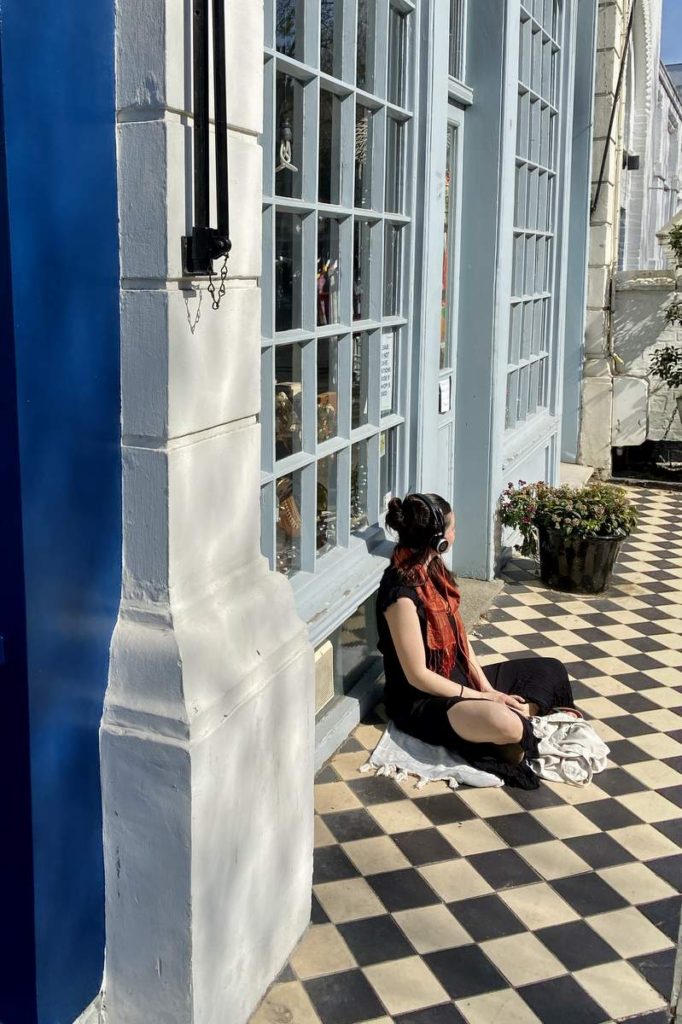
Friday 10 April
Making my first tea of the day, I said good morning to my Alexa device, the only other voice in my home. She told me that on this day in 1849 the first safety pin was invented, apparently in three hours. It got me thinking about how quickly we can make a difference in the world when we are determined or inspired to do so. As I learnt from the excellent BBC4 documentary Age Of The Image, soon after World War II Italians came up with the Vespa, semi-automatic espresso machines, the Alessi cocktail shaker and influential film directors like Federico Fellini emerged from out of the darkness.
Humanity’s speed to respond and adapt is showing in just how many people are staying home and have offered to help their vulnerable neighbours. I read that in the UK rather than having about ten million unemployed, thirty to forty billion pounds has become available to furloughed workers, an amount we might normally spend in one year on military defence. Unfortunately many self-employed people who are trying to claim from Universal Credit are finding themselves in a very stressful situation. Though it’s been said that at least a fifth of small businesses will not survive the lockdown, already in its third week, the divide between those who can work from home, like lawyers, financiers and software developers, and those who can’t, like our one million care workers, has been exposed, and transparency is the best starting point for fixing injustices.
Inequality is in the spotlight, as rich people isolate in their large homes and I’ve noticed the quantity of Amazon cardboard boxes stacked by bins in my neighbourhood. In poorer communities, where people have lost their livelihoods and might be living in shared accommodation or hostels, physical distancing must be just one of many challenges. As higher income people spend less money because arts, leisure, sports venues and retail shops are closed, so many of the low income earners who were working in those sectors have lost their jobs and probably don’t have enough or any savings.
Today is Good Friday and up in Cumbria, where sports centres are being converted into makeshift hospitals, police are checking that B&Bs are not open to those who would like a long weekend in such gorgeous locations. The government has said that we must not throw away the gains we have already made by self-isolating. I’m sorry for the people in the hospitality business and though they may not be able to count money, I hope they can count blessings.
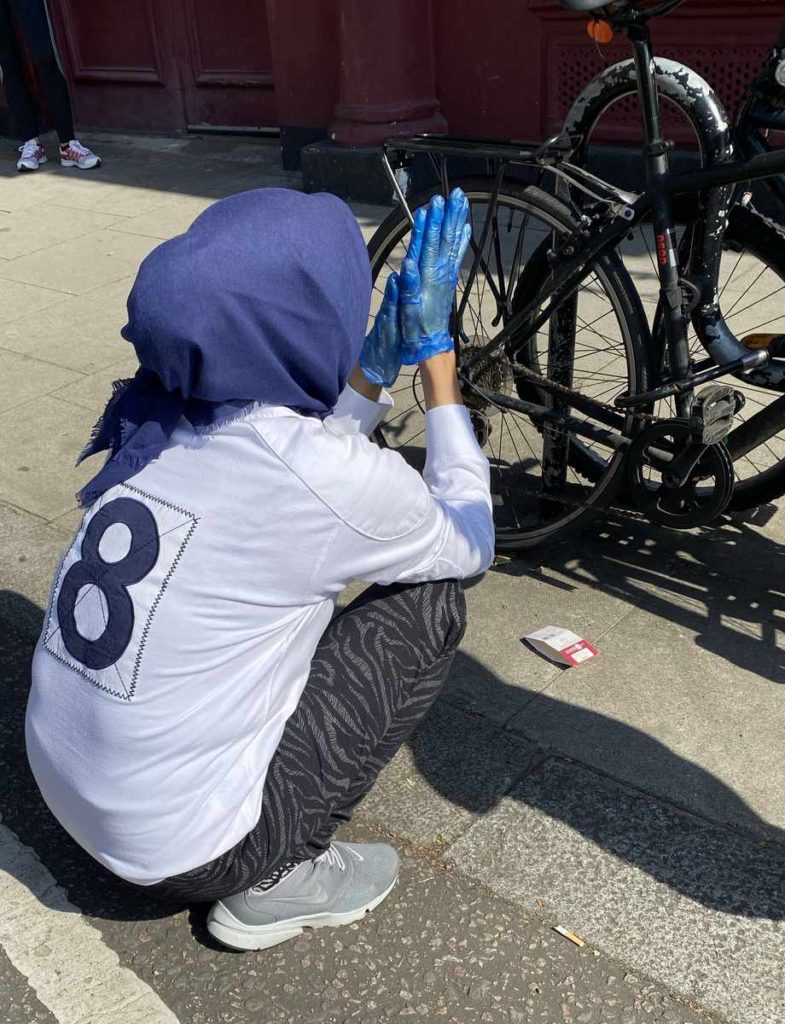
Saturday 11 April
This morning I was excited about my plan to bike to Oxford Street, which usually has about half a million daily visitors. It was the fastest thing I’ve done in weeks. From Park Road to Selfridges, I counted ten cars and maybe double that number of cyclists. There were so many buses, which I didn’t understand, as most of them were empty. I photographed somebody asleep on the street separated by glass from a shop mannequin and then I met a clean and tidy man, just sitting. He said that he didn’t want to sleep in a dormitory because he feared catching the virus from strangers. He’d been told at a shelter that he could have a private room if he had a friend to share it with him but when he went back the following day with a friend, they were both turned away.
Somebody has spoken of this virus as an ‘equal opportunity pandemic’ because it attacks both the prince – literally Prince Charles – and the pauper – as proved by the bulk burying of impoverished people in New York, which has experienced up to two thousand people dying in one day. Though the state has twenty million people, New York has had more deaths than any country.
The World Health Organisation has just declared the end of Ebola in the Democratic Republic of the Congo, and I do hope that this coronavirus doesn’t transmit rapidly in nations with fragile economies and healthcare systems, and which rely heavily on supply chains. On TV I saw the many migrants at Calais, queuing for their daily sandwich. These people are not criminals but war victims, some of whom have been tortured and violated. As much as we want science to give us cures, we also need to be heart-centred and not forget that we now have a growing quantity of hungry people, from refugees to the newly unemployed. Moreover my fingers are crossed, my prayers are in, that the war that has been going on in Yemen for about five years, and where millions don’t get any humanitarian aid, will come to a permanent ceasefire.
It seems to me that I keep recording so much bad news. I haven’t even yet mentioned today’s global death toll of over one hundred thousand and the feeling here that there’s not enough protective clothing for NHS workers. Scanning for good news, I did read that actors Helen McCrory and Damian Lewis have raised one million for their charity called Feed NHS. Perhaps I ought to remember that the only words I’ve overheard today were, from a neighbour talking to her dog and another on the phone enjoying the sun, what a beautiful day.
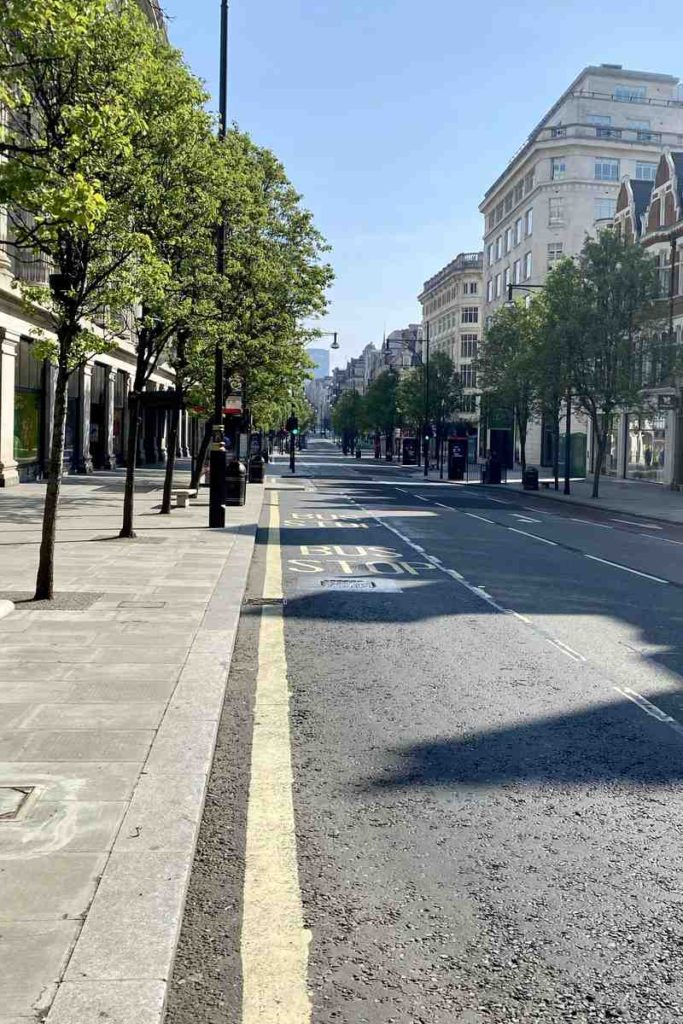
Sunday 12 April
All the people I’ve approached in queues are quite happy, even keen, to talk to me about how they’re feeling in the shock of Covid-19. The word ‘anxiety’ comes up often and these are people who don’t have clinical mental health problems and whose confidence and well-being have not been affected by financial insecurity. Mostly my interviewees are adapting to constant domestic life and trying to manage a new range of emotions. I spoke to one man who’s frustrated that whilst his wife is working online, he’s building forts with his two children who keep asking him how come they can’t get close to their friends when they meet them in the park. He’s told his kids that there are ‘germs’ about to explain public distancing. A woman confided to me that her teenagers argue over the interpretation of government guidelines and don’t understand why they can’t meet with their friends but keep metres apart. Listening to younger generations, I’m repeatedly reminded that friendship is the meaning of life. In other communities it’s also about children and teenagers having places to play and gather together and I do hope the prediction that many youth clubs will be permanently closed is wrong.
Whereas one neighbour informed me that she and her husband have become more aware of fighting with each other because their children are always around, another joked that I’m welcome to have her husband as she is fed up with him! I wonder if our ‘stay home, save lives’ agenda, which works against anybody having an affair, will lead to more need for marriage therapy. I do think that there’ll be less babies born next year as people have to spend so much time with the children they already have and might be more hesitant to bring a new being into our world as it is right now. An expert on the radio said that births decrease during economic uncertainty and that in the lockdown, accidental teen births will dramatically drop ‘as you can’t get pregnant over Snapchat.’ She also pointed out that fertility treatments have stopped.
Yesterday my best friend, as is our tradition, delivered me a fancy egg, so finally – yay! – I’m back to chocolate. Here at this unique Easter, when usually millions come together for a shared meal and the churches are full, those who have limited or no wi-fi may be struggling to say hallelujah. Apparently Westminster Abbey has never been fully closed in a thousand years. Where is God now? said somebody to the Archbishop of York. He replied that the question is not where is God, but where is humanity? Now more than ever we need faith, hope and, that one thing I keep unintentionally repeating, unity.
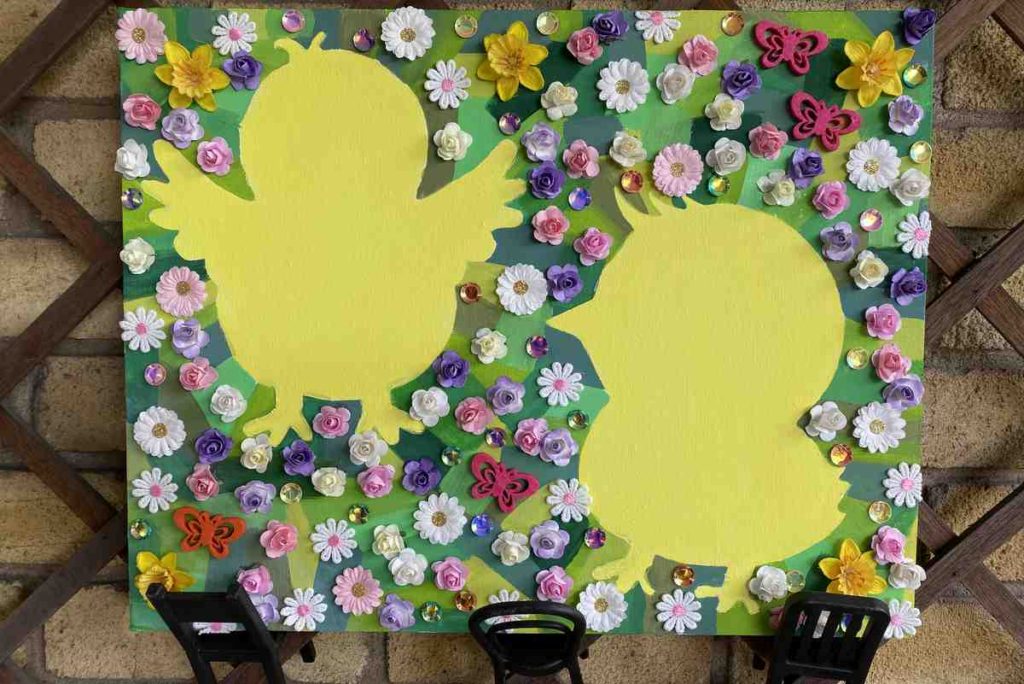
Week 4
Monday 13 April
Bank Holiday Monday and I know it takes time to get organised but apparently out of the three hundred thousand people who have applied for state-backed business loans, the banks have granted only four hundred. On television it seems like they have increased their advertisements, declaring how easy it is to make payments and deposit cheques, as if a majority are being lavished with money. Now that I’m slipping into moan mode, let me add – enough with sentences beginning ‘In Germany…’ So well-prepared Germany is top of the class in fighting the virus, does it help to be reminded of this in so many reports? Though public dialogue is vital and looking across the globe can guide our actions, being belittled by Germany’s prowess is not helping my morale.
What does help me is to give thanks for every blessing. For instance now, in my well-equipped kitchen, I consistently make rice that doesn’t stick to the saucepan and our rubbish continues to be collected on schedule. I’m fortunate that my neighbours are considerate and friends inviting me to online house parties believe me when I say I’m on a digital diet – the only excuse I can find! Also on the bright side I’m not stuck on a cruise ship or in a country where you can’t buy bathroom basics, considered non-essential. I listened to a man who’s recovered from coronavirus and has a new perspective on what brings joy. He said he now takes nothing for granted. I was thinking how lucky that we haven’t had any major climate catastrophes (although News is just Covid-19 and other deaths) and then this morning tornadoes hit southern US states.
Over the weekend my local trees grew small green leaves, Victoria park re-opened, and wildlife trusts are setting up webcams in nature so that people can take virtual walks to reduce stress levels. In the traffic-free streets of a Welsh town nature is streaming live as wild goats roam around. Yesterday Pope Francis spoke of the ‘whole human family’ having ‘a spirit of solidarity’ and Andrea Botticelli’s singing touched our souls. Portobello’s Portable Priest was in the streets of West London with a microphone, announcing if people can’t come to church, the church will come to the people. (Whilst on this subject I recommend the 2019 film Two Popes.)
In the spirit of honesty, I must confess something. Earlier on my walk I stroked a puppy not from my household. Her owner was saying how her dog missed contact and Roxy was looking at me with big pleading eyes and, knowing that I was near home and would wash my hands straightaway, I kneeled down and had my first touch in ages.
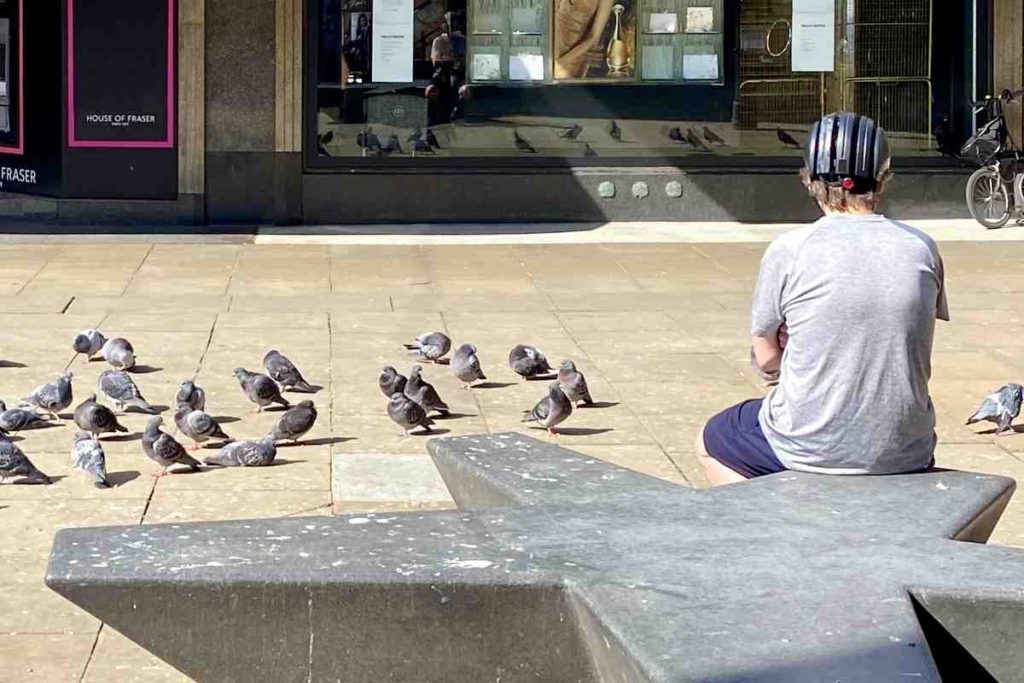
Tuesday 14 April
One of the workers, Emilia, at my local bakery and takeaway café, came to the door to tell the man ahead of me in the queue that he could enter. He replied, “Can you bring me four croissants?” and she went back inside. I told him that it was safe for him to go in as there was nobody else in the shop. He said that he still didn’t want to. “Maybe you’d be more comfortable with a face mask?” I continued. He shook his head. My boldness growing I said, “So maybe those croissants are really not essential?” He agreed and I added, “You know the staff here are not at our beck and call. You could have at least said please.” Emilia returned with his order and the card payment machine and as I went inside I could see she was now annoyed. She told me how sometimes customers blame her if the shop is not selling something they want – What only plain bagels no seeded ones! – and her colleagues have been reprimanded for not having better English.
I would love for people lashing out because of present hardships to listen to Radio 4’s The Reunion in which Terry Waite, Brian Keenan and John McCarthy talk about their five years as hostages, mostly in solitary confinement. They had to dry used tissues so they could be re-used and when eventually one of them got a book it was a manual on breastfeeding. John’s mother died during his captivity and he found out a year later.
These days there’s plenty of good stuff on the radio and television. Ironically, I watch streaming services much less than usual and my two hours of telly are filled with wonderful dramas like Noughts + Crosses, In My Skin, Trigonometry, Liar, The Nest, Quiz and documentaries of which my favourite has been Harry Birell: Films of Love and War. It is weird, however, to immerse in these dramas and then, as a corona diarist, watch the News and be suddenly located in a world where another few hundred people have died, excluding all those in care homes, and I’m viewing plateaus, peaks and dips of the infection rate.
Usually I listen to a lot of comedy which I think is good for my health and though Radio 4 has Now Wash Your Hands and I’m catching up on ITV’s The Stand Up Sketch Show, this is a tricky time for comedians to be presenting new material, and those on the live circuit are out of work. As ordinary people enter the spotlight, I did have a little chuckle watching new social media star, the seventy-three year old ‘skipping Sikh’ from Slough who has advised, “stay home, exercise, eat sensibly and don’t get upset.”
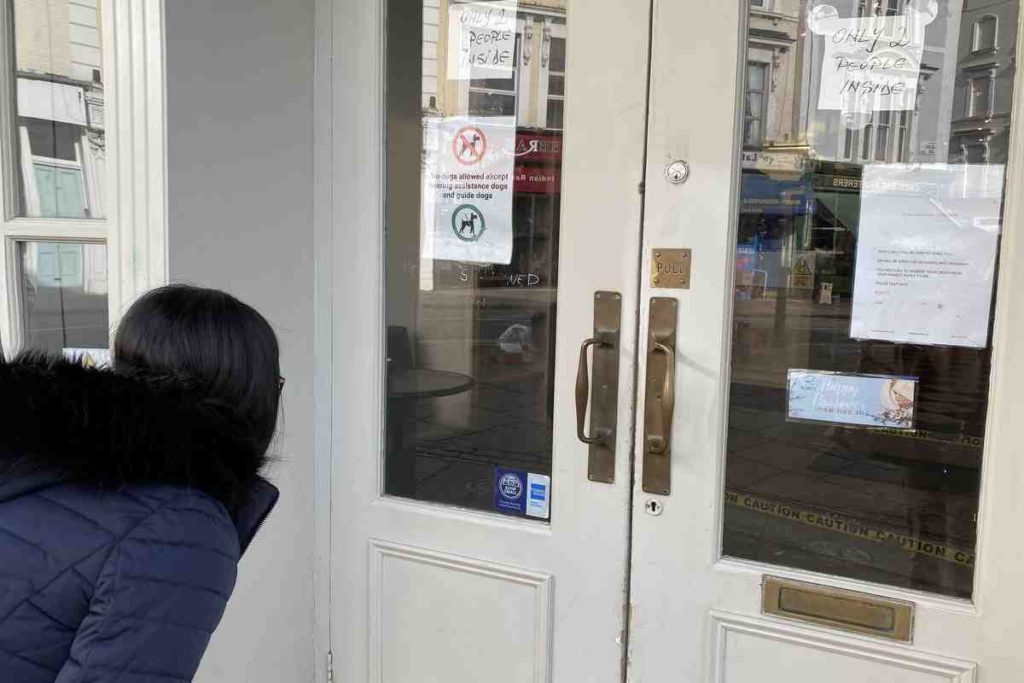
Wednesday 15 April
As a traveller I’ve learnt that there’s a difference between a two-week holiday and a longer journey abroad. Whenever I’ve been away for a substantial period of time in a different place from home, not only have I got more perspective on the regular life I’ve left behind, but also insight into my habits. As our lockdown continues and I’m in my twenty-sixth day, I notice my new normal in this novel routine that I’m settlling into. Unlike in the past, I never forget to take my own cup to my local café for coffee, where I also get brief face-to-face interraction. Slowing down in the kitchen combined with a feeling of experiencing some kind of war, I’m really on it when it comes to recycling and being less wasteful. I’ve even put some packaging in a cupboard for possible use when I’m crafting. Yesterday, for the first time in weeks, I shopped in a small supermarket rather than at the greengrocers. When I got home and put my purchases on the kitchen table, I was amazed at the amount of plastic.
I listened to a programme in which some eloquent environmental experts talked about how this pandemic is showing us how we can ‘rise up when we are threatened.’ They believe we will have the same determination ‘to come together’ as we recover and reconstruct in the future. They explained how road traffic is down by thirty percent, rail even more, and as we practise remote working, some daily commutes may be reconsidered post Covid-19. The overseas holiday market, in their opinion, will not shrink but people might do less quick meetings abroad. They were concerned about corporations and financial institutions, especially in America, being able to suspend green standards and stop tracking their pollution if their business has been impacted by the virus. On the subject of the postponed UN climate change conference, COP26, these environmentalists are hopeful it will be more successful by being delayed, especially if by then some new presidents have been elected.
The number of people being counted for coronavirus deaths isn’t always accurate or inclusive of everybody, and I’ve realized that information is constantly changing. At one point I wrote how women will have to give birth on their own, only to hear a week later from a chief officer that new mothers will only be alone in ante-natal care. I’m somebody who’s usually quick to berate myself for what I consider to be my mistakes but my new habit is to be more gentle and forgiving. Finally I’m connecting to the loving parent within me who consistently says – it is what it is and this too will pass.
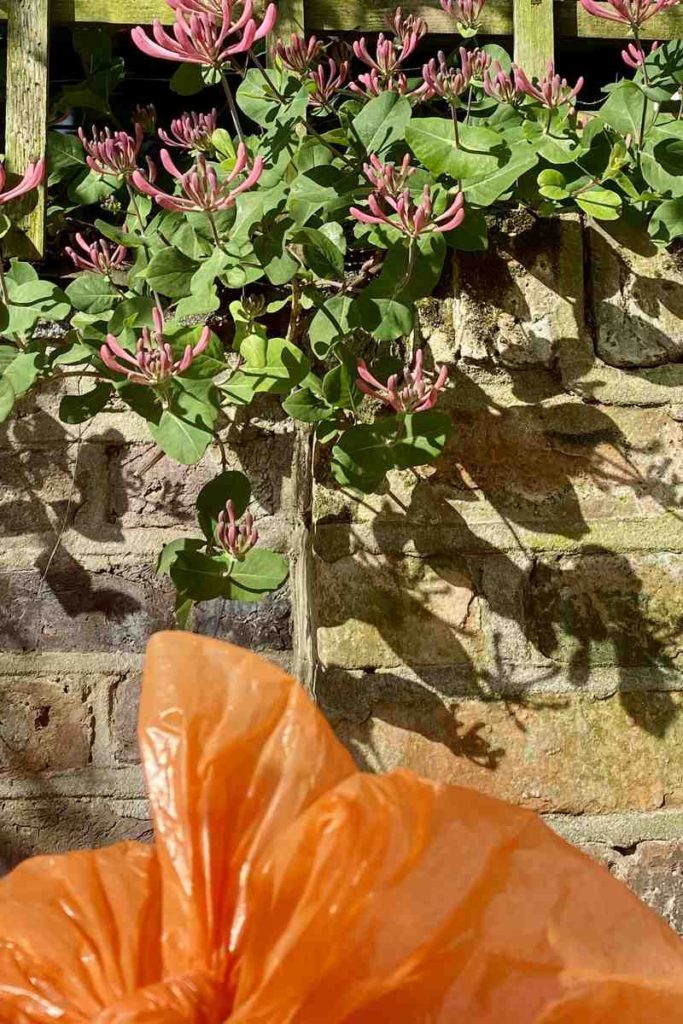
Thursday 16 April
It’s late in the night and still no internet. Anyone on Virgin broadband in our area has been disconnected all day. As neighbours update on Nextdoor, I think that there might not be internet until tomorrow. When I found out the situation this morning, I wobbled. Not so much because I needed internet but rather this was something unexpected within the bigger picture of uncertainty and once again I had to acknowledge my lack of control. Thankfully my mum who runs an IT business asked her tech wizard to guide me through connecting with personal hotspot.
On a street stroll I met actor, filmmaker and Primrose Hill resident Julian McDonnell. We found ourselves talking about joggers, still a popular topic on Nextdoor. I was surprised to learn from Julian that in Primrose Hill Park, runners, often in couples, jog too close to the public, panting, spitting, even clearing their noses. The police will move somebody on whose doing gentle exercising but the joggers, many of them unapologetic amateurs, continue to dominate public space. As if to prove Julian’s point, whilst he was talking, two joggers ran between us, ignoring the physical distancing rule. We wondered why they weren’t running on the side of the quiet road, or as in France, at allocated hours. A slim cat also passed by, according to Julian, taking its daily slow walk, always the same route.
A friend told me that twice she’s been asked to leave the park by the police, who as we know can be over-zealous and unsympathetic in their new role and seem to be exempt from social distancing. The first time my friend, who doesn’t have outdoor space at home, was very much alone on the park’s outskirts, sitting fully clothed. More recently she was doing government-allowed yoga in a secluded spot and had just laid down to finish her practice properly with a few minutes of restorative calm. As, for days, she’d been feeling too much anxiety and vulnerability, she was grateful to feel the earth beneath her and to have done some much needed conscious exercise and breathing. She was abrasively reprimanded by two police officers who wrote something in a notebook and told her to go home. As she turned the corner at the park gate to the road, she almost collided with an earplugged jogger.
Later in reflection I thought about how both Julian and I have had to give up swimming and how these new joggers, with their vigorous, hurrying action, feel out of synch with the fears and not knowing that we’re all experiencing, and, our overwhelming need for community co-operation and support.
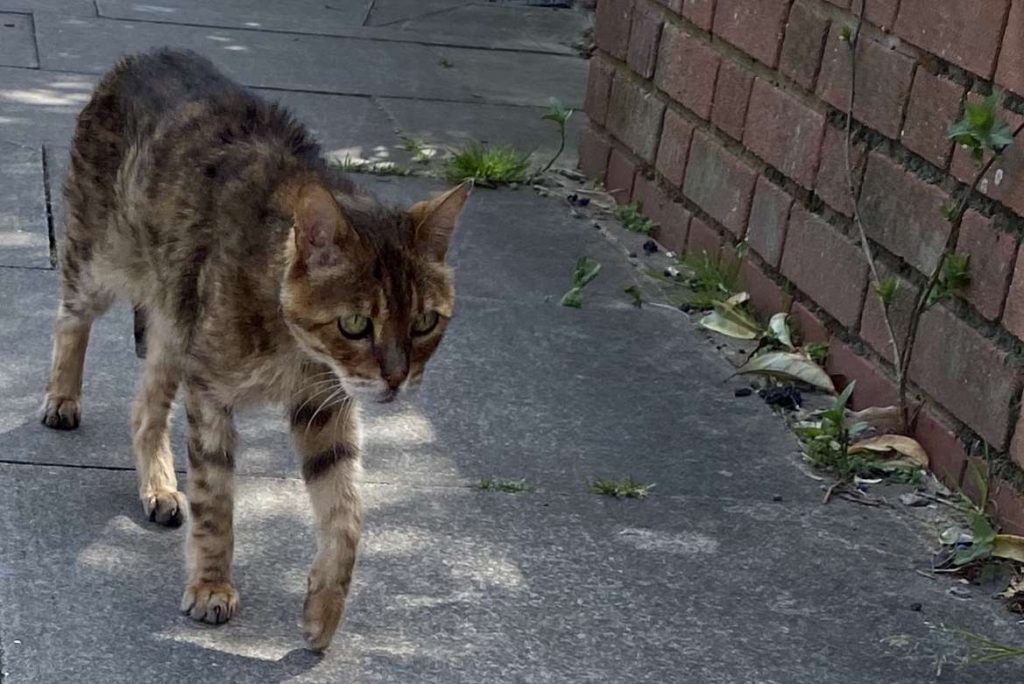
Friday 17 April
So three more weeks of lockdown. A national poll suggests that ninety-one percent of our population agree with this and New York is also extending its lockdown, until mid-May. We’ve been advised to isolate until infection rates drop, the NHS is not inundated, testing increases and there’s no chance of a second peak. Having had more than fourteen thousand deaths in the UK, I hope we are at the peak we were warned would come.
Recent focus has been on British industry manufacturing more ventilators and the urgent need for PPE, as supposedly many of our erratic supplies from abroad have been sub-standard. National clothing companies like Burberry have started sewing and smaller fashion retailers are ready to assist. I’m loving to see big brands doing their part – in Italy, Ferrari have assembled respirators and Armani and Gucci have been producing aprons and face masks. As well as providing the ‘armour’ for NHS staff, we have to improve safety for social and community care workers as this virus sneaks into old people’s homes and data shows that nine out of ten deaths happen to those with underlying conditions like heart disease and diabetes. People living with family members who have disabilities are also under intense pressure.
As countries like Denmark, Norway, Austria, Spain and Italy make tentative steps to open nurseries, small toy and bookshops and to resume some construction and manufacturing work, we are in a position to recognise the right moves at the right time when we do unlock. Some Asian nations like Singapore have had to re-tighten restrictions as they struggle with a resurgence of infections. The pros and cons of compulsory face masks, especially on public transport, are being widely debated. Our government doesn’t want to discuss exit strategies yet but even as foodbanks see a sixty percent rise in hungry people and two million have lost their jobs, it’s clear that our nation’s health is being prioritised.
At the international Recovery Trial, set up in nine days, scientists are readily sharing knowledge in order to find treatment options for Covid-19 and at Oxford University and Imperial College they are working to create a vaccine. As much as this global disaster has uncovered our weaknesses such as the undervaluing of people who are in the health and care sector and the competition and blame that exists between some governments, it has also shown, the brilliance of scientists and engineers worldwide, with their rapid, determined response to destroy the perpetrator of this pandemic.
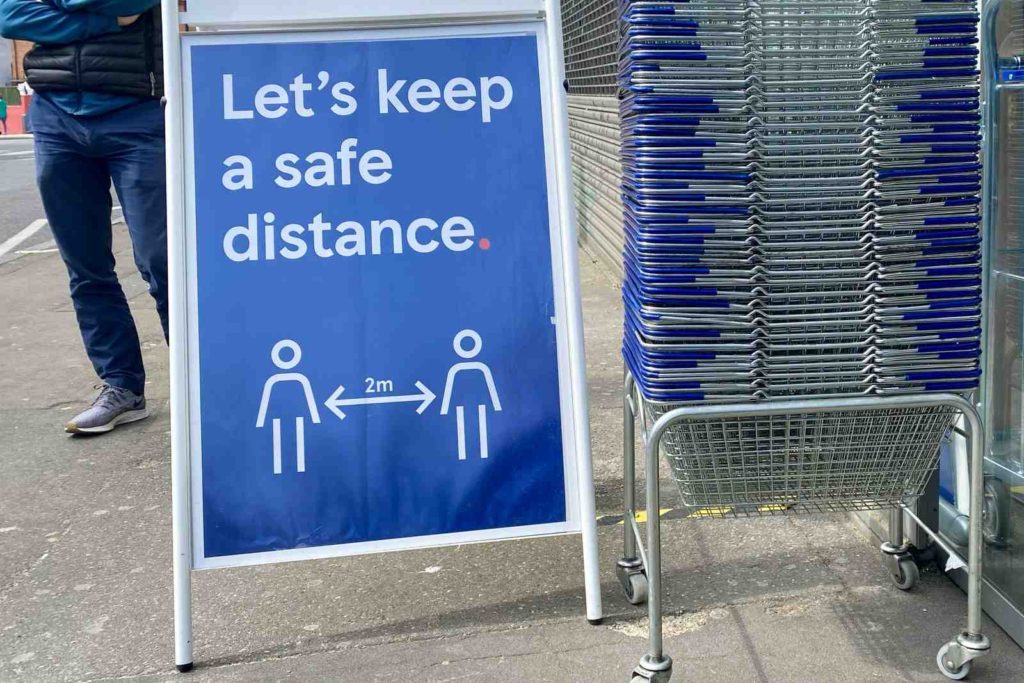
Sunday 19 April
Yesterday I took a day of rest from writing my corona diary. Friday night was a tricky one. The evening had been lovely, eating at Zoom with my family, watching The Graham Norton Show and still finding him funny without the laughter from his absent live audience. I went to bed late but couldn’t sleep though I was tired. Suddenly I started sobbing. It wasn’t a self-pity meltdown because I have a purpose with my diary, enough entertaining things to do at home and Friday afternoon I met with my best friend in her street. Her sporty boy has been very challenged by the lockdown so I wanted to give him a book I felt he would enjoy.
They were tears for fears. Will we ever feel comfortable hugging and kissing each other again? When will all fourteen of my London family be able to meet for dinner every Friday as we’ve been doing for years? Will I have the courage to go out and about, even when I’m allowed to do so? And as New Zealand’s Prime Minister Jacinda Ardern said in one of her friendly Facebook live messages, will we have to ‘hunker down’ in our private ‘bubbles’ for as long as four months? Of course, my stress was for my own reality and truth is I couldn’t make myself feel better by thinking about people in a worse situation than me – about the families who, in the last six weeks, have lost somebody in the worldwide death count of one hundred and sixty thousand. In the end, clutching a soft toy as if I was a kid, I made herbal tea and had a conversation with my God, which, as always, began with gratitudes. I’m not surprised that Google searches for the word prayer have ‘skyrocketed’ since the outbreak.
Today, as Jamie Oliver takes a weekend break from his TV cooking classes, and has already completed twenty episodes, Captain Tom is still doing sponsored laps in his garden. With his walking frame, and now aged one hundred, he’s raised twenty-five million pounds some of which will contribute to food parcels and counselling sessions for NHS staff and electronic devices so that patients, days and weeks alone in hospital, can talk to their families.
Though I promised myself a day off from also researching for this diary, I did listen to two past episodes of Radio 4’s Woman’s Hour and You and Yours, partly because I find the presenters Jane Garvey and Winifred Robinson have such calming voices. In the night I watched the pre-recorded Britain’s Got Talent auditions and it was quite uncanny to hear the four judges talking, before the pandemic, about the valuable work of hospital staff and carers and Alesha Dixon saying that nurses are walking angels.
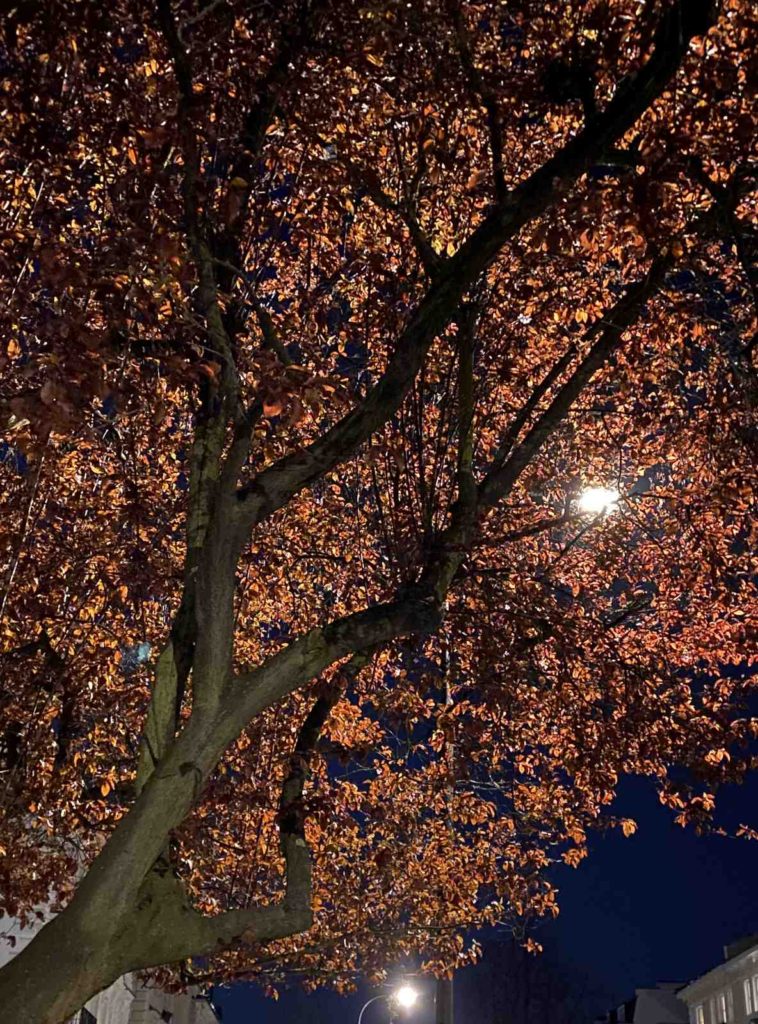
Week 5
Monday 20 April
Every time I take a walk to observe nature, even hug a tree, as encouraged by some forestry services, I feel fine. Sometimes I have to force myself outside, remembering as actor Idris Elba says in one of those virus-related commercials, we must not quit. Nature right now is my charger and how lucky that this adversity is not happening in winter but here is spring with its vivid colours and hopeful blooming.
Sunday evening I enjoyed BBC’s excerpt of the Together At Home eight-hour global broadcast in which more than one hundred musicians performed in their homes to celebrate health staff and all those workers, usually taken for granted, now heroes. The event, organised by Lady Gaga and dubbed a ‘Wi-fi Woodstock,’ included superstars like The Rolling Stones, Elton John, Tom Jones, Jennifer Lopez, Taylor Swift, John Legend and Stevie Wonder who sang Stand By Me to honour the recently deceased Bill Withers. There were hellos and thanks from Oprah Winfrey and Michelle Obama and the BBC opened with George the poet whose podcasts inspire me. It was an emotional event, especially when we were shown families looking through windows at new-born babies that they couldn’t hold. The concert has raised more than one hundred and thirty million pounds from USA companies and private donors. Timing couldn’t be better as their president has just withdrawn America’s contribution to the World Health Organisation, now making the Bill and Melinda Gates Foundation the largest funder, followed by the UK.
Representatives from the UN and WHO asked us to embrace ‘this unique opportunity to put aside differences’ and hope this pandemic ‘never happens again.’ As this coronavirus has probably come about because of a wet market, for this catastrophe never to be repeated we need new global measures around the selling of live and dead animals. China has issued a temporary ban on keeping animals like wolf pups and pangolins in small cages, often in filthy conditions where they can incubate infections easily transmitted to humans. Every year there are about three million deaths worldwide from such zoonotic diseases, and especially because on intensive farms animals are inhumanely crowded together. As conservationist Jane Goodall has said it is time for our poorer neighbours to have a viable alternative to being dependent on the capture of wild animals for food and income. This Wednesday marks fifty years of international Earth Day, hopefully another reminder of our need for environmental awareness and actions that protect our one and only planet.
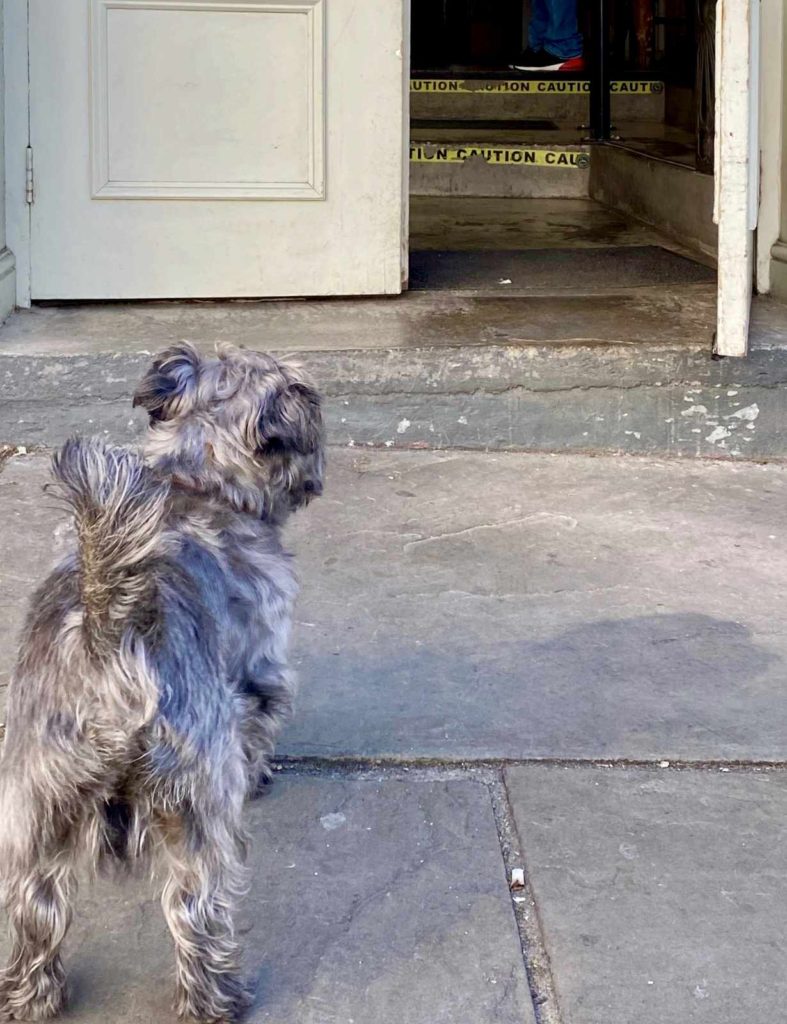
Tuesday 21 April
For years my friend Grace has been caring for her mother and brother in their shared home in North London. Since lockdown she no longer takes her mother, who has become more confused and forgetful, to their local community club for socialising and singing or to Sunday church. It is up to Grace to do the shopping, home chores and make regular trips to a laundrette because her mother is incontinent. She spoke to me about being constantly vigilant, like ensuring her family don’t see the News because the few times they have, their stress levels rose. Grace’s brother, who has mental health problems and is not eating enough, has finally agreed to speak to a professional. Like many others he’s been reluctant to bother a doctor at this time. About a week ago the NHS had to put out a message urging those who need medical help, other than for the virus, not to be afraid to get in touch or go to A&E.
Mostly everyone is dealing with negative emotions like fear, grief, panic, loneliness, anger and doubt. People with physical illnesses must be anxious if their operations have been delayed and those with mental health problems have the hardship of losing face-to-face support groups. The charity Respect which focuses on aiding perpetrators of domestic abuse to control themselves has seen a seventy percent increase in calls in the last four weeks and all other charity helplines at least double the usual amount. I keep hearing of people who are not sleeping well or having intense dreams, and others experiencing physical pains as they work from laptops instead of office computers. Then there’s the adverse impact of abandoning routine which most psychologists would agree is vital for emotional stability. Financial worries and having no work, no formal purpose, can also create dis-ease.
It takes motivation and discipline to survive and thrive in this global crisis and upheaval. Days after being told that he could no longer work as a chef, a dear friend in California started a food delivery business which requires an immense amount of hard work and careful organisation. From the obstacle of being suddenly unemployed he created an opportunity. And take Grace, a full-time carer and workshop guide who has managed to adapt her skills and passion to benefit herself and others. In order to keep grounded and joyful she chants every morning and then sends recordings of those chants to a growing WhatsApp group, most of whom want to donate to her. On the phone she reminded me of a well-known quote that has inspired many entrepreneurs – it’s not the life you have, but the courage you bring to it.
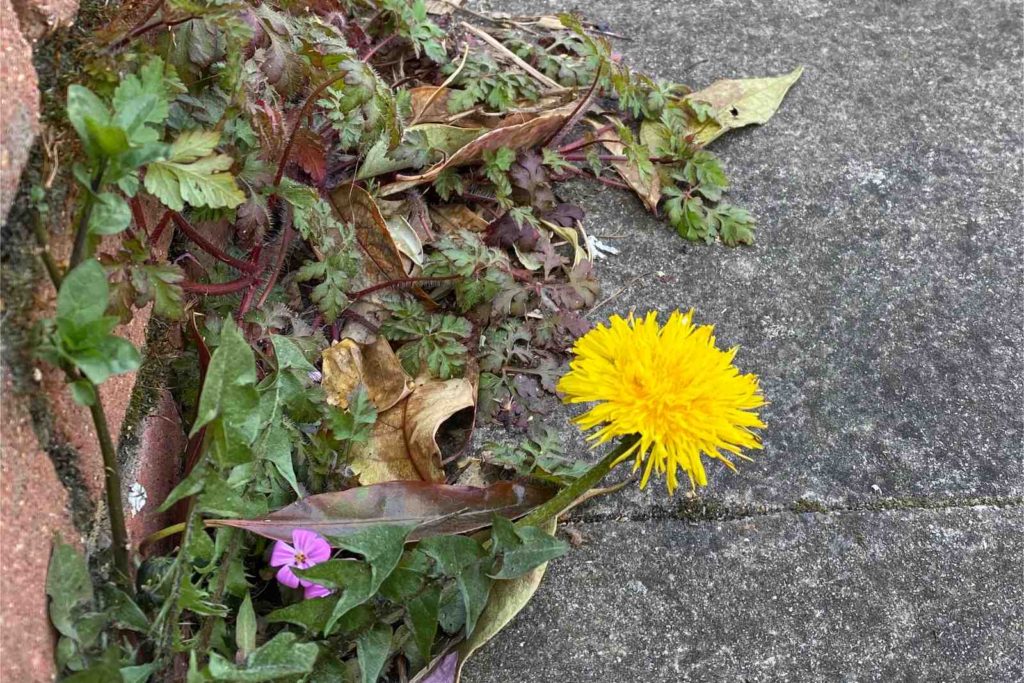
Wednesday 22 April
One story that stays with me is of a woman whose husband was taken by paramedics to hospital as he couldn’t recover from the virus at home. On the day of their fortieth wedding anniversary, she heard that her husband was being made as comfortable as possible. How many times lately have I heard those words ‘palliative care.’ This woman was allowed to visit her husband on his final day – though I’ve heard that some people have to choose between saying goodbye to their loved ones and then going into quarantine, or being one of a few who can attend a funeral. She sat by her husband’s bed and he said goodbye by phone to his two children in two other countries. His wife described his last moments as ‘struggling for oxygen…a very difficult death.’ I think of this widow going home alone having lost her partner of decades, her children unable to fly to her to give each other consoling hugs. Now she must deal with funeral arrangements that are largely out of her control and in the bigger picture her husband is another statistic.
Thankfully there are stories of ‘treatment over tragedy’ and right now in the UK, except in care homes where the number of deaths has doubled in the last five days, more people are recovering in hospitals than ever before. Mother Earth is also in some ways healing, especially with less pollution worldwide. I heard that in Thailand, with coral reefs and marine life regenerating as tourists stay away, so there have been sightings of sharks and turtles once again coming near to shores.
Most of the countries who seem to be coping best, like Germany, Denmark, Norway, Finland, Iceland, New Zealand and Taiwan, are run by women. While the battle against this virus is not a global competition but a call for local and global co-operation, and, although I absolutely don’t believe that any gender has a monopoly on intelligence or sympathy, I feel we are experiencing the birth of a more feminine, intuitive time which will lead to more balance. Whereas masculine qualities include bravery, strength and innovation, the feminine traits of humility, caring and collaboration are getting miraculous attention and seventy-seven percent of NHS workers are females. Balance is not just about finding a middle way and avoiding extremes but also about keeping peaceful and resilient, especially when the unexpected occurs.
Finally, Happy Birthday to the Queen who sensitively chose to have no public celebration yesterday and congratulations to my kid friend JJ for his beautiful paintings of a bear and a dolphin.

Thursday 23 April
As my nieces, nephews and godchildren put on their headphones to go to Google classrooms, and one of them with a school jacket on, I’m doing a jigsaw that I’ve taken out of the cupboard where I keep my kid-friendly toys. As this puzzle is not my usual one thousand pieces, I’m making it without looking at the picture on the box cover and loving that it’s easy. I find it harder to concentrate these days. Thus I’m reading fiction with shorter chapters and yesterday I made flatbread that only required mixing flour with yoghurt.
We’re going through something so challenging that I’m happy to hear that most of the children I know are finishing online classes at lunchtime and my best friend is relieved to no longer have that early morning rush and drive to school. My eight-year-old nephew has proudly shown me the laptop that belongs to him all day and where he ‘facetimes’ with his class.
Online education gives children their teachers and much needed structure but I also believe that this period of kids not going to school has advantages. One of my clan has discovered she likes making clothes and her mother has taken her sewing machine out of storage. Another, passionate for gymnastics, has created practice programmes that last for hours. Years ago a friend of mine home schooled her child until he was about twelve years old and with the freedom to explore what he enjoyed most he became an authority on wildlife, learnt photography and music, and along with fiction classics he like to read encyclopaedias too. After just a few years of formal education, he studied at college and then had a choice of different professions to pursue.
Although at the moment there are plenty of children’s authors live-streaming, free audible books and online educational sites, my hope is that lockdown to date will have shown parents that children can grow their independence and confidence by learning skills that are sometimes not on the school curriculum and which focus on them using their hands; practical activities like cooking, cleaning and gardening. Also kids having time to talk or game with their friends gives them a sense of normality and fun and gives their parents precious break times. I do believe that over-burdened parents are not in the best interest of their offspring. Also what today’s youngsters are learning in school is often different from what we were taught, especially in Maths. There’s been joking about how some children’s lessons reveal to them how little their parents know, but seriously, bravo to all parents who have become teaching assistants and many of them whilst doing their own work from home.
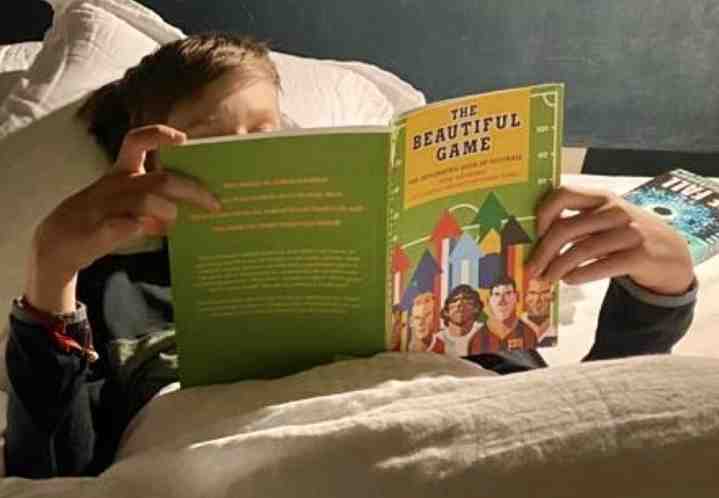
Friday 24 April
In the spirit of St George we are slaying the dragon that is Covid-19. At the daily Downing Street coronavirus briefing a new alliteration was announced – Test, Track, Trace. Essential workers who suspect that they may be infected and their households can now be tested online or at one of the thirty centres throughout the UK. The army will take mobile testing sites to care homes and the first British trials of a possible vaccine have begun. Some car manufacturers and construction firms who promise to temperature check their employees daily and keep the social distancing rule will resume work in ten days’ time and more restaurants, including two in Primrose Hill, are organising themselves to do takeaways. B&Q have been allowed to open over one hundred stores, so phew!, less plants and flowers will be thrown away.
Seven new hospitals have been built and one of them thanks to Captain Tom whose version of the song We’ll Meet Again is number one in the charts. The war veteran has inspired an ex-rugby playing quadriplegic to raise money by going up and down his hallway stairs with the aim to complete the amount of steps that it would take to climb Mount Everest. There’s new distribution lines for hospitals and, though the problem of insufficient PPE is not over, it was wonderful to watch carers putting on the lovingly-made gowns that costume designers have sewn for them and to hear that many architects are using their 3D printers to make headsets for hospital staff.
Food bank volunteers continue to do a stellar job and a recruitment scheme for farms that need to harvest crops is proving effective, although some seasonal workers have been flown in because picking is not always unskilled labour. Our nine main supermarkets have made updates to shifts and systems so that more people can get food deliveries. There are no more holiday makers stranded on cruises and the target of housing the homeless by 2025 has happened in a few weeks. Most are only in temporary accommodation, but again we have proof that situations can be changed dramatically when urgent. Domestic abuse is an ever-increasing challenge, but at least it is dominating headlines. On Thursday’s Big Night In telethon the word to text was HOPE.
We’re at almost two hundred thousand deaths worldwide and ‘la vida lockdown’ continues yet this is the first time in five weeks that I find myself writing optimistically at length. Of course I could choose to criticise and doubt other people’s actions but it’s the positive news that is going to enable me to keep calm and carry on.
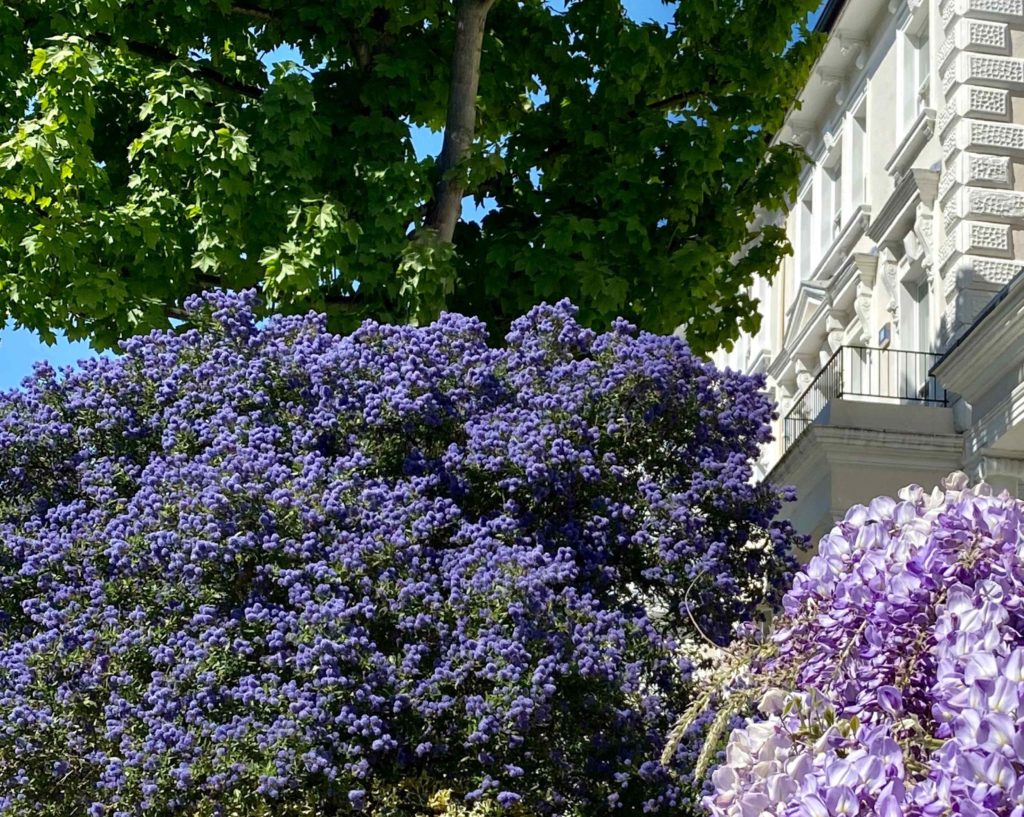
Sunday 26 April
Reflecting on Saturday’s excursion to Poundland in Camden so that I could buy some things for our local food bank, seems like I was in a dreamscape. As I left the shop, a dishevelled old man was shouting frantically in the quiet street, “Somebody please give me £4.40!” Instinctively I opened my wallet and took out a note. I explained that I would put the money in the basket of my bike for him to take. He was afraid it would blow away but it didn’t and once he had the money in hand, he tearfully said to me, “May God reward you.”
Many of us have seen a poem circulating online which was popular during the 1918 influenza pandemic. There’s a couple of lines that resonate with me, ‘Someone met their shadow/And people began to think differently.’ Right now coming out of the shadows and into the spotlight are the disadvantaged and vulnerable and those in jobs previously undervalued or barely acknowledged. We are for the first time in my life, consistently facing our shame.
In the UK, Covid-19 is overshadowing all other illnesses, including cancer which normally kills about four hundred people daily. Data shows that in the last month there were one million less people visiting hospitals for accidents or other emergencies. Many general practitioners report being less busy and say that if people don’t seek medical advice for pains like in their knees or hips, as well as calling for help immediately after a heart attack or stroke, then we will not overcome the darkness we are in.
Politicians and experts are asking why a disproportionate amount of ‘Blacks, Asians and Minority Ethnics’ are being killed by coronavirus. Theories abound but what concerns me is how often these individuals are referred to as a homogeneous group under the acronym BAME. We use the term ‘minority’ when in fact most of these people have been ‘minoritised.’ Diversity is a fact and enrichening but I fear that not enough humans accept the oneness of the human race. If you put a mirror under the word ‘me’ it spells ‘we.’
This weekend I confronted a shadow as I listened to an update about starving and dehydrated Rohingya refugees being rescued by Bangladeshis, after a long time of not being able to anchor their boats anywhere. I once watched a compelling documentary about the long-standing persecution of Myanamar’s Muslims in Burma, but seeing their situation in the context of Covid-19, I found myself more motivated to pray for these and other displaced people, and to want to write something where my last word must be compassion.
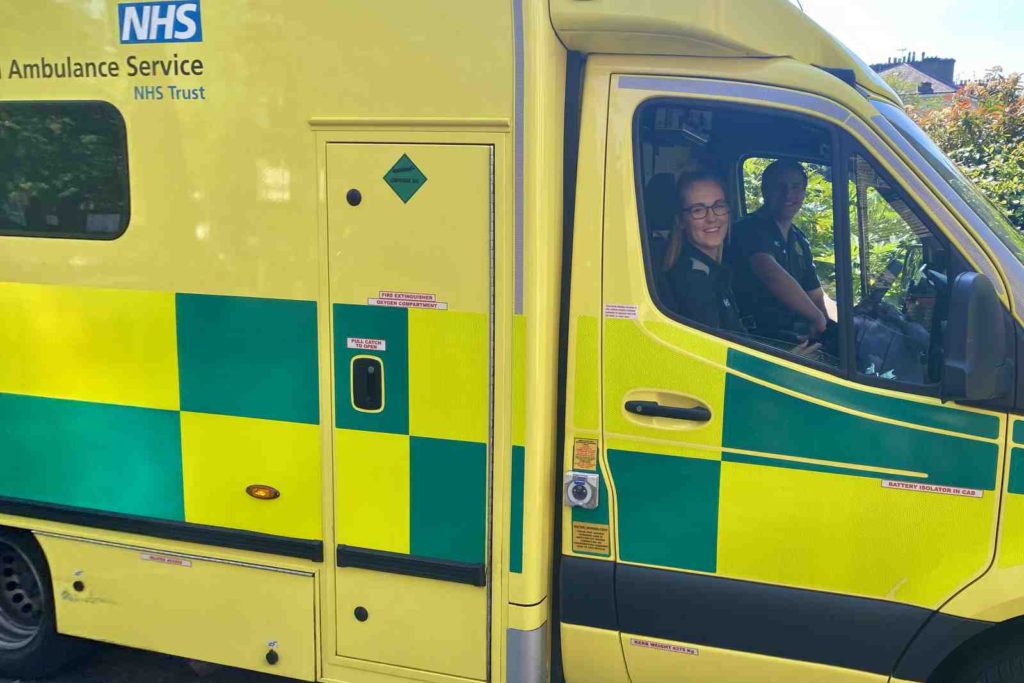
Week 6
Monday 27 April
Lately the proverb ‘waste not, want not’ has been spontaneously coming to mind. This afternoon a friend told me how during the coronavirus initial panic-buying phase she stocked her freezer with all kinds of meats only to find herself wanting to become a vegetarian soon after!
Usually, and unbelievably, a third of food worldwide is thrown away by supermarkets and shops or because it’s spoiled. Right now farmers who because of Covid-19 don’t have distribution or restaurants to supply to are being forced to bin produce. How terrible it is to see cows still at work only for thousands of litres of milk to be thrown down the drain. And all this while the number one human killer is starvation.
Half of UK food is imported so when a supermarket shelf becomes empty it is probably because there’s been a disruption in the food supply chain. Apples and pears can grow relatively well in the British climate but in the main it’s cheaper to buy them from abroad. Sometimes fruit is grown in one place, sent to another country to be packaged and then flown back to its country of origin to be sold. I feel our present crisis is showing us how we really need more sustainable food systems and locally sourced ingredients.
Even before this pandemic, I was concerned with the issue of waste. In January I decided to set a monthly cap on how many clothes I could buy each season. Yesterday I found a list at the back of a journal of all the items I had bought since my resolution, no entries for the last two months. The retail market has been the biggest casualty of lockdown with a thirty-five percent drop in sales and a neighbour who sells handbags online is wondering not when but if people will buy luxury goods as much as they did before. She now goes out with phone and keys in her pocket and a reusable cotton bag, just in case there’s no queue at the greengrocers.
Practical and self-care online shopping are trending and a spokesperson for Sainsburys said that in their busiest two weeks they got a year’s worth of calls. The share price for Amazon continues to shoot up and apparently we spend ten thousand pounds a second with this e-commerce giant. I reckon that there must be wealthy people passing through this disconnection by fixing up their homes or shopping out of boredom. If the latter is somebody’s reality, I would recommend Plato’s motto, ‘necessity is the mother of invention.’
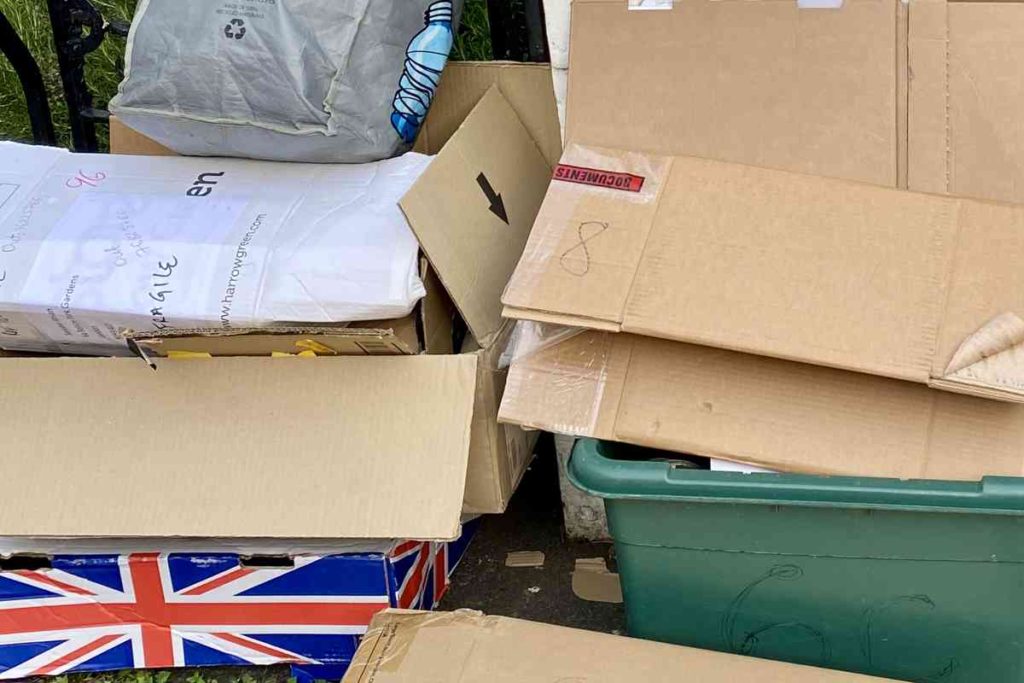
Tuesday 28 April
I wake up to a light, steady rain and hope it reconciles people to another day of being grounded. As Boris Johnson made his first public appearance yesterday since recovering, he urged us to keep up with our ‘forbearance, good sense and altruism’ in the biggest challenge we’ve had since World War II. Sixty thousand civilians were killed in the six years of the second world war and to date around twenty-five thousand people have died in the UK, and a third of them in care homes. This morning we had our first minute of silence to remember the workers and carers who have died trying to look after and save virus-infected people.
As I live alone there are times lately when I’ve been fighting with the quiet. I have had to remind myself that reflection, daydreaming and working things out independently are valuable to my creativity and self-development. Yesterday I scrolled through my contacts, wondering who to call. I could energetically hear a tween or two saying to me, Shut Up! Although they usually use this phrase when they are angry, on this occasion the memory made me smile. Funny enough, I ended up having a quick chat with a teenage nephew whose mastered the art of hush.
Consider facemasks symbolically and again the emphasis on talking less, although bizarrely some people wear facemasks in the street and pull them down when they want to speak to a cashier or a neighbour. On TV I saw a hairdressing salon newly opened in the Czech Republic and I thought about how the masked customers are probably not offloading to the masked stylists as often happens at hairdressers. Also in my experience fewer people are walking and phone talking simultaneously and when they are, I notice their diminished awareness. Recently I was able to jump further away from a man on crutches who dramatically sneezed twice but somebody on the phone whom he passed by was not so lucky; hopefully it was an allergy sneeze.
As a Life Coach I know that before asking clients accurate, incisive questions it’s essential to listen to them with a quiet mind. Also anybody who’s experienced a retreat will know how golden silence truly is. I once spent ten days in isolation at a desert camp, no phone, internet or books and only brief interactions with the people who cooked my meals. In that time, with nature as my companion, I was not depressed but in deep rest and I was able to find clarity where I needed it. Afterwards I re-emerged from the silence and stillness more sensitive, self-reliant and determined to live life fully.
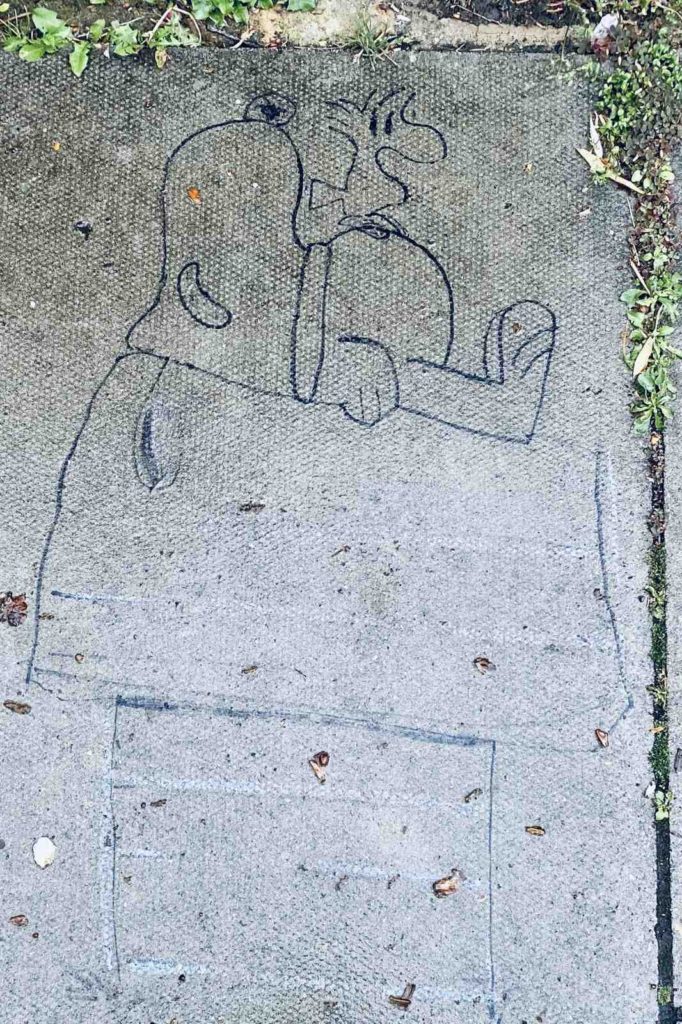
Wednesday 29 April
The main public question being asked is when and how lockdown ends. Now that the ‘curve is starting to flatten’ and testing capacity is almost at the target of one hundred thousand people per day, we wonder how businesses will reboot and, of course, preparations do need to be made. It’s being said that schools may re-open by staggering classes, with different ages being taught at different times. I heard one headmaster talk about installing sinks at the entrance to his school and hoping to give teachers protective clothing.
Curators and administrators of public spaces like museums and theatres and those in the hospitality business have a lot to work out. There may be limited opening hours and in restaurants new rules on diner density. Sadly, some restauranteurs are going from the extreme of having customers book months in advance for a table to not surviving shutdown, if it goes on for too long. Many of them, and pub owners too, are asking for a national time out on paying rent. Cinemas could reduce seating capacity but they also need new films and for distributors, who are presently making huge profits from online streaming, to continue to give cinemas priority on new releases. And from Hollywood to television soap operas the question is when can filming safely begin again?
As much as we want the unlocking process to begin, I wonder how confident we will be to venture back into the world, with or without compulsory face coverings. I might hold back on taking a flight somewhere until I’ve seen others do it first. Some British airlines, already laying people off, believe that it will take a while before we’re back to having affordable holidays abroad. What about public transport? This week I had to take three bus rides, and nice though it was not to pay because of the new rule to board through the middle doors, I stood timidly with my collar over my mouth, not touching anything.
The government has a responsibility to explain how we can avoid a second wave of infection once we’re out of isolation, like shopkeepers having perspex screens next to tills and the two metre rule for shoppers, but I think that each of us individually will decide how we want to act. For instance, last week some employees left their jobs at a warehouse because nobody was physically distancing. One thing I feel for sure is that we’ve been staying indoors and keeping apart for long enough to realise that after this shutdown our future success is not going to just be about productivity and material achievement, but also our ability to consider each other’s well-being.
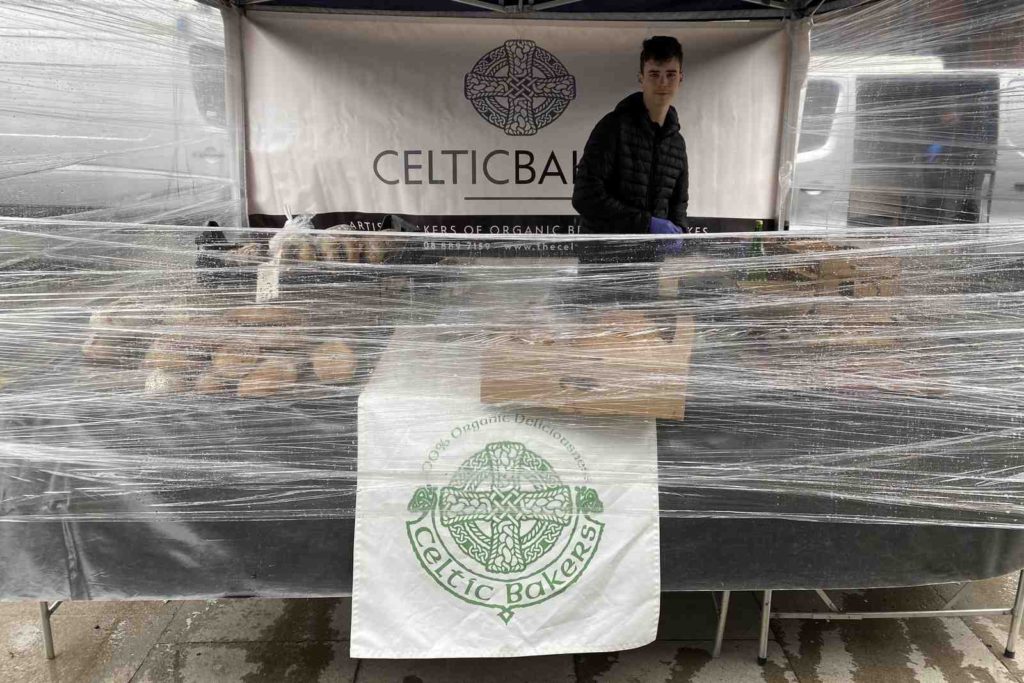
Thursday 30 April
Many of the photos that I include in this diary, happen to be of pictures that children and adults have chalked on pavements. On social media, instead of selfies, people are sharing the landscapes from their windows, and, as we talk to each other through the windows of our screens, mostly our bookshelves and paintings are on display. Even just on national television, there are plenty of programmes about visual art, including my favourite Landscape Artist of the Year and the popular Grayson’s Art Club. Around two thousand UK artists have offered to paint the portraits of NHS staff and whereas musicians are unable right now to perform live or tour, artists are still being commissioned during this time of economic disruption. I particularly love The Getty Museum Challenge where you have to recreate a work of art with anything you can find at home. Having seen some inspirational reproductions of iconic paintings, remaking Joan Miro’s Running Man is on my list of creative things to do. I plan to substitute his circles of colour with balloons, use a household rubbish bag for the background that’s orange and luckily I have a yellow towel.
Artist Grayson Perry says art is at the heart of being human, and that’s why we were doing it even when we lived in caves yet it seems to me that because of Covid-19, some sort of art reawakening is happening now. We have an opportunity because most of us are more mindful and receptive; even Uber’s commercial thanking me for staying at home makes my eyes smart and recently a TV presenter on a talk show found himself crying spontaneously over a colleague who died from old age. Art connects us to an anything is possible world and it also echoes how we are feeling. I find myself returning to Edward Hopper’s empty cityscapes and isolated figures, after somebody pointed out that we are living his visual reality.
My sister Lulu who exhibits and sells paintings and sculptures, describes art as a prayer, that often takes her out of her comfort zone, but always brings her joy. As a mentor she tells beginners to approach making art as if it’s a foreign language. The key, she says, is to boldly imitate images which resonate with you and to realise that in the challenges, you grow. I know what she means because I’ve been working on this small canvas for weeks, every morning fixing it, and I realise that in the adding of more and more paint to make it feel right, I have given it depth. Over the last weeks I’ve expressed myself on paper, canvas, fabric, pots and rocks and I can honestly say that to draw, paint and glue, along with the writing of this diary, is to stay happily at home.
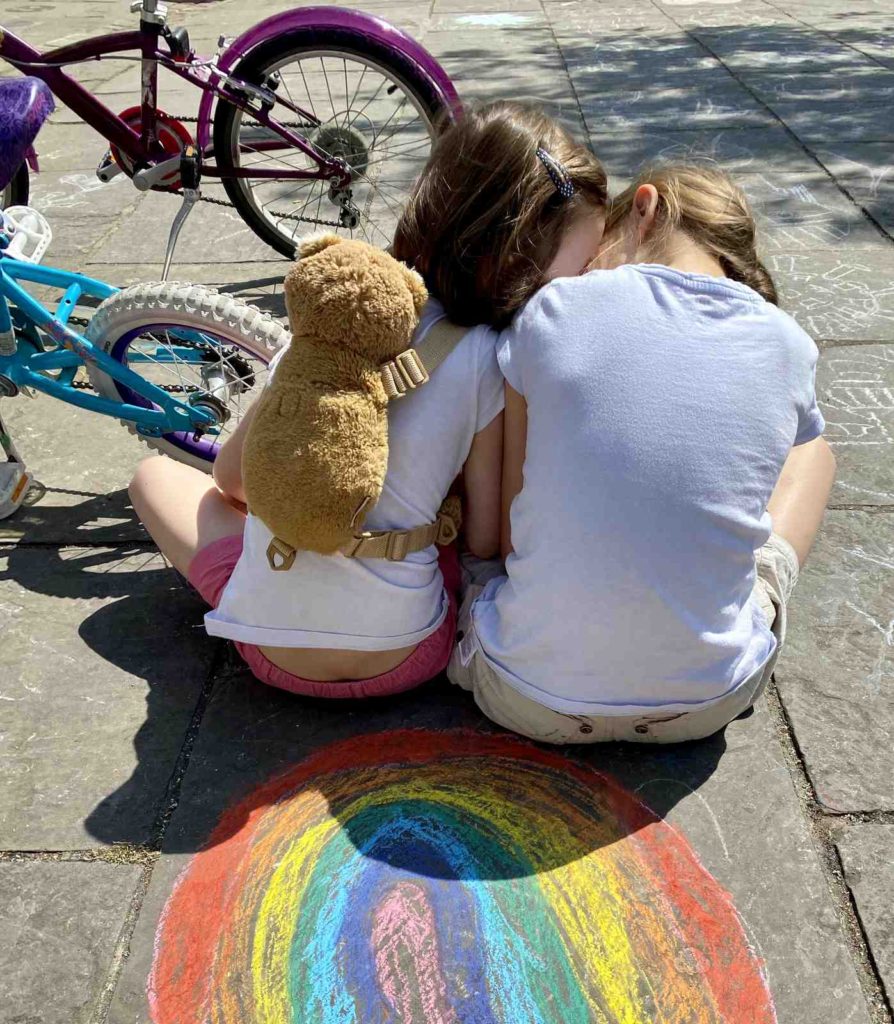
Friday 1 May
Mayday, when historically we celebrate spring with picnics and maypole dancing. Mayday is also a distress signal said three times in a row, such as by ships or planes, when there’s a life-threatening emergency. British Airways and Ryanair seem to be sounding alarm bells right now, as they feel forced to make pilots, cabin crew and other workers redundant. Sir Richard Branson wants to mortgage his private Necker Island for a government bailout for Virgin Atlantic. Our chancellor of the exchequer (nicknamed by some as dishy Rishi,) suggested that Branson first approach his shareholders for help. EasyJet is deliberating over the idea to leave the middle seats on its planes empty when flights resume and I suspect that all UK fliers may be temperature screened as happens in many Asian airports. Executives at Heathrow and Gatwick think it will be a tough task to implement physical distancing and high hygiene standards at terminals. The aviation industry position is further complicated as companies that make parts for aircrafts and maintain them have been affected by lockdown and staff, like traffic controllers and engineers, have time-limited qualifications. In the UK international flights are down eighty percent, and most of the passenger flights that have happened in the last six weeks were nationals being brought home from abroad by the government.
When I think about the journey we go through from arriving at an airport to reaching a holiday destination, there are so many moments of human contact and touching. Usually a good flight is one where you hardly have to queue anywhere, there’s time for duty-free shopping, you manage to put your cabin-size baggage in an overhead compartment, and once seated, you might use the in-flight entertainment or relax into sleep. Now when I speak to my frequent flying friends, nobody is feeling revved up to go abroad and for me after all this quarantining, a trip to another part of London feels exotic enough.
Last night a news reporter was in the ghost city of Benidorm and I learnt that Spain is one of the top three most visited countries in the world. However only today the Spanish government, which has made thirty million masks available to its public, is allowing adults and children to go outside their homes for a walk, and at specific hours, within their municipalities. Even when we are ready to ‘vamos a la playa’ will Spain, and other global tourist hotspots, be ready to receive holiday-makers? And imagining my own ideal getaway, I wonder when I will be browsing in the markets of Marrakesh, hanging out at beach cafes or doing laps in a swimming pool again.
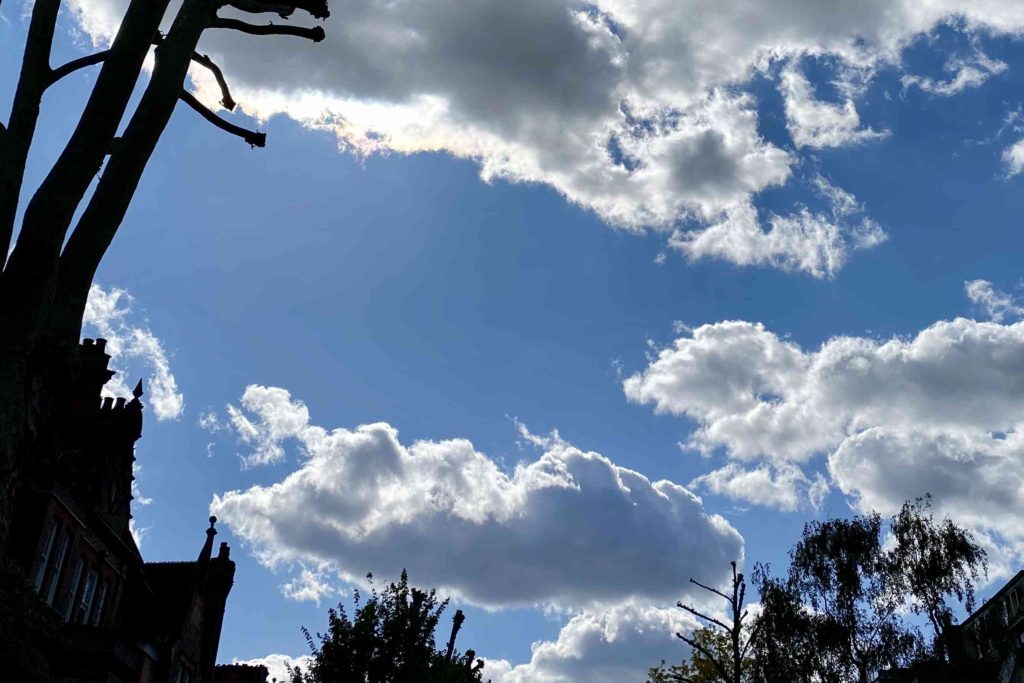
Sunday 2 May
I’m determined to maintain the distancing rule with my fridge and to only open my snack cupboard in essential moments. However last night, whilst watching It Was Alright in the 1970s and being shocked by what a sexist, racist and homophobic world I was born into, I cheekily pinched some sweets that were in the bag to be delivered as soon as possible to my local food bank.
I admit when house arrest began in the distant past, my very first reaction was: I must not put on weight. Whilst others were stock-piling toilet roll, hand gel and tinned food, I went out to buy sunflower seeds. Having lived in the Middle East I knew they would be the ideal long-lasting low-calorie snack for evenings on my couch. Also when I discovered that supermarkets had run out of pasta, I took it as a sign to embrace a lower carb diet. However as my bank account becomes slimmer, I find myself exploring all the varied ways potatoes can be cooked.
A recent UK survey has revealed that our top concern at this time is about putting on weight. I’m not surprised – how many times have I been greeted with the words, “Have you lost weight?” I haven’t checked my temperature once during lockdown but I often put on a certain pair of trousers to make sure that they still hang from my hips. In order to avoid overindulging I serve myself bowl-size meals, eat slower by using chopsticks where possible and I put my treat pudding (jelly, custard and blueberries) in a small glass tumbler.
Recently a Facebook friend sent me a video about intermittent fasting. I ignored it until I asked my thin, fit Brazilian relatives how they resist bingeing. They told me that they were fasting for sixteen hours at a stretch (and I hope that includes sleep time!) and explained how going through a state called ketosis is really good for the body and mind. People observing Ramadan right now are proof that you can function without eating all day, although there is a phenomenon called ‘being hangry.’
At my local shop, no longer a mere newsagent and where I’ve learnt the names of all the cashiers as they are my new community, I scan the shelves for inspiration and give thanks that this mini supermarket doesn’t stock too many ready-made meals. At home I often declutter and organise the kitchen, partly to distract myself from another peek in the fridge. And with hospitals and key workers having to use so much single-use plastic, I now have an exemplary relationship with that low-down cupboard where I stash plastic shopping bags.
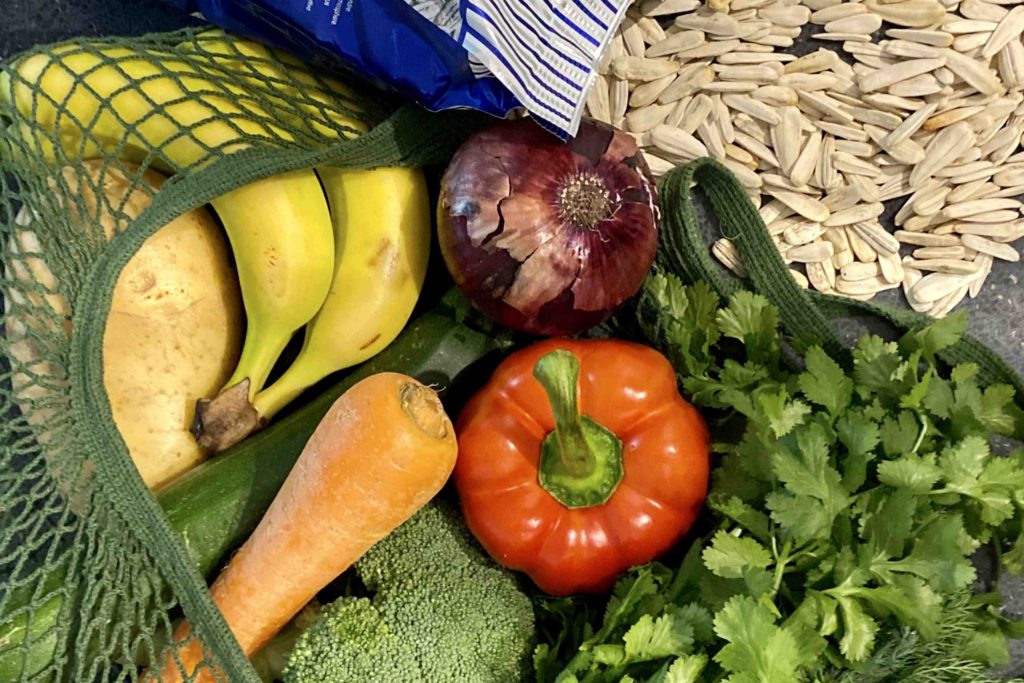
Monday 4 May
The runner-up national concern on a certain UK Gov Poll is not having enough exercise. I have biked more than usual, but I’ve not done a single live workout. Energetic cleaning of my home in short sharp bursts and once carrying a hefty bag of soil from a supermarket are the closest I’ve come to sweating. At first I was annoyed with myself for not being able to clean my windows perfectly and then I realised the disguised blessing that I will have to keep doing this domestic exercise if I want smudge-free windows.
Even professional sports people who have gyms at home, are troubled by lockdown. The postponement of this year’s Olympics means that many have to rethink their intense training programmes which have been expertly devised over years. More than forty thousand people will wait until October to run the London Marathon. Thankfully it will still happen as charities, who have had to close shops and halt fund-raising activities, significantly benefit from the millions raised by the runners. At least Tom, the captain who was promoted to colonel on his one hundredth birthday, single-handedly raised a third of the amount last year’s marathon made and many people did the alternative 2.6 Challenge. Now there’s a new sport called Garden Athletics which began the other day with champion pole vaulters competing against each other in the safety of their own backyards.
I feel for those who regularly watch sport and right now can’t experience the excitement and camaraderie that a sports match delivers. The only live football to be watched is in Belarus where its president has called this virus a psychosis and advised that drinking vodka can cure you from infection. My dad, who has rediscovered his love for reading as sport events have been cancelled, and whom I constantly nag to do more exercise, is now walking in the countryside around his home every day. When I phone him and he happens to be, what he describes as, climbing up a hill, his huffing and puffing his music to my ears.
Yesterday my sister invited me to play catch in Primrose Hill park. Yes we are in different households but this was my first invite to a live social event in six weeks and obviously we were going to physically distance with metres to spare. Afterwards as we walked home, my nephew, whose main passion is for climbing and has had to swap indoor bouldering centres for street walls, literally transformed into spiderman and scaled up an enormous tree. As I held my phone aloft to video him I could feel the strain in my upper arms and got further resolve to carry on cleaning windows.
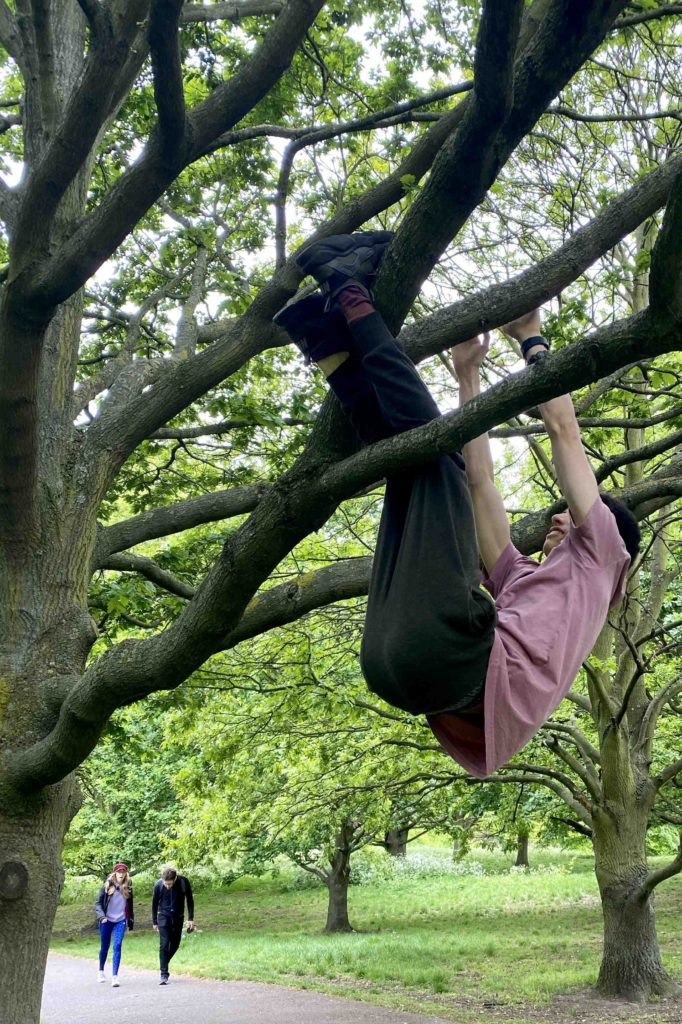
Tuesday 5 May
In the UK and USA coronavirus has been particularly cruel. Here we have had about thirty thousand deaths, possibly more than any European neighbour, and in America, although the population exceeds three hundred million, there have been almost seventy thousand deaths. Over thirty million Americans have filed for unemployment claims since mid-March and TV footage has shown too many people queuing for food handouts, albeit, unlike India, in their cars.
In some American regions, people have protested with banners, even guns, for their right to return to work, as unemployment causes ill health too. In Operation Gridlock, demonstrators marched to the centre of Michigan to protest the lockdown issued by its governor, threatening her with the slogan that Donald Trump once used in reference to Hillary Clinton – ‘lock her up.’ The conflict is largely between rural and urban America with cities being the worst affected by the virus and some rural community residents feeling that their governors should re-open more places than just beaches and golf courses. As the managerial class continue to receive their corporate salaries, many are watching their small businesses be destroyed. The governor of Georgia, in defiance of White House guidelines to wait for a two week decline in cases, has allowed restaurants, gyms, hair salons and tattoo parlours to re-open. Worldwide falling demand for oil has also brought more calamity to the USA.
Back in March, President Trump believed the virus to be just another flu or a democratic hoax. As events unfolded he took the pandemic more seriously, culminating in a misinformed recommendation for people to inject disinfectant or be blasted with ultraviolet light. Now, with the general election six months away, he is said to be supporting governors who plan to reopen their states’ economies. Meanwhile the Navajo nation has more cases per capita than all US states except for New York and New Jersey and apparently it is still waiting for a federal stimulus package, better healthcare and in some places, clean water. Some help has come through fundraising and in particular from the Irish who remember how struggling Native American Indians sent them money during the four-year potato famine that began in 1845.
One thing we have learnt is that poorer neighbours are more likely to be ‘mugged’ by Covid-19. In the UK the infection and fatality rate is highest amongst people who have bigger social and economic challenges, live in more crowded conditions and where childhood adversity has led to diseases like obesity. The question now is – what do we do about this inequality?
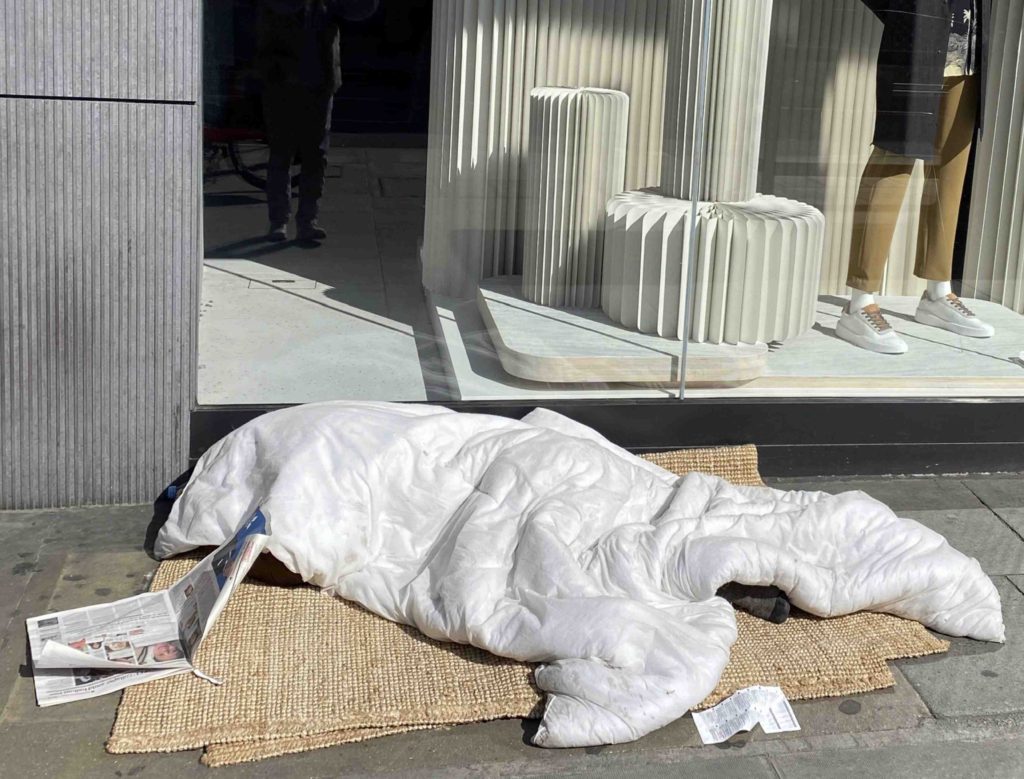
Wednesday 6 May
What I like about following the News at this time is that with such a singular focus on coronavirus, I’m getting a panorama of most of the world. I see which leaders are taking the pandemic less seriously and which ones have stepped up admirably to the challenge of reducing the infamous R rate to below one. I’ve learnt that in Hungary, a country I’ve always wanted to visit because I’m a quarter Hungarian, Prime Minister Viktor Orban has used the outbreak as an excuse to rule by decree. In his authoritarian position he controls media companies and recently he ended the legal recognition of trans people. Now, honestly, I’m not so keen to visit there. Over in Brazil, President Jair Bolsonaro has been described as a ‘tropical Trump’ as he appears to be ignoring his country’s rising death toll and the desperation of poorer, fearful Brazilians.
These days, with local crimes hardly being reported, I feel fully up to date on the main virus-related issues in the UK and in countries not so far away. On Monday, after being the first European country to go into lockdown, four million Italians went back to work and have permission to visit each other, provided they have a travel document and are still distancing. As a reward for two months of strict isolation up to fifteen people can now attend an Italian funeral. Sweden, with its herd immunity attitude, continues to be the European economic superpower although the virus has killed more people there than in neighbouring Norway and Finland. As of this week Denmark may give us some tips on how to re-open nurseries, which I think we need to do if we don’t want a predicted quarter of them to collapse.
Yesterday, on the Isle of Wight, the NHS launched a new Bluetooth-based app for smart phones. It is hoped that if sixty percent of the UK population use it, then alerts can be sent to people who have been near a carrier of the virus. Contact tracing is one of the methods that is attributed to South Korea’s success in containing coronavirus. Today South Korea is planning to review mandatory social distancing measures. With its experience of viral epidemics, the country has had one of the lowest fatality rates and apparently there have never been more than nine deaths a day in the very large capital of Seoul. Ample supply of testing kits and a public willing to digitally track the virus meant there was no need for a complete lockdown, and for the last three days there have been no new infections there. Watching a TV report from South Korea where masked kids were enjoying fairgrounds and sneezing into their elbows, I was reminded that this is the place that brought us Gangnam Style.
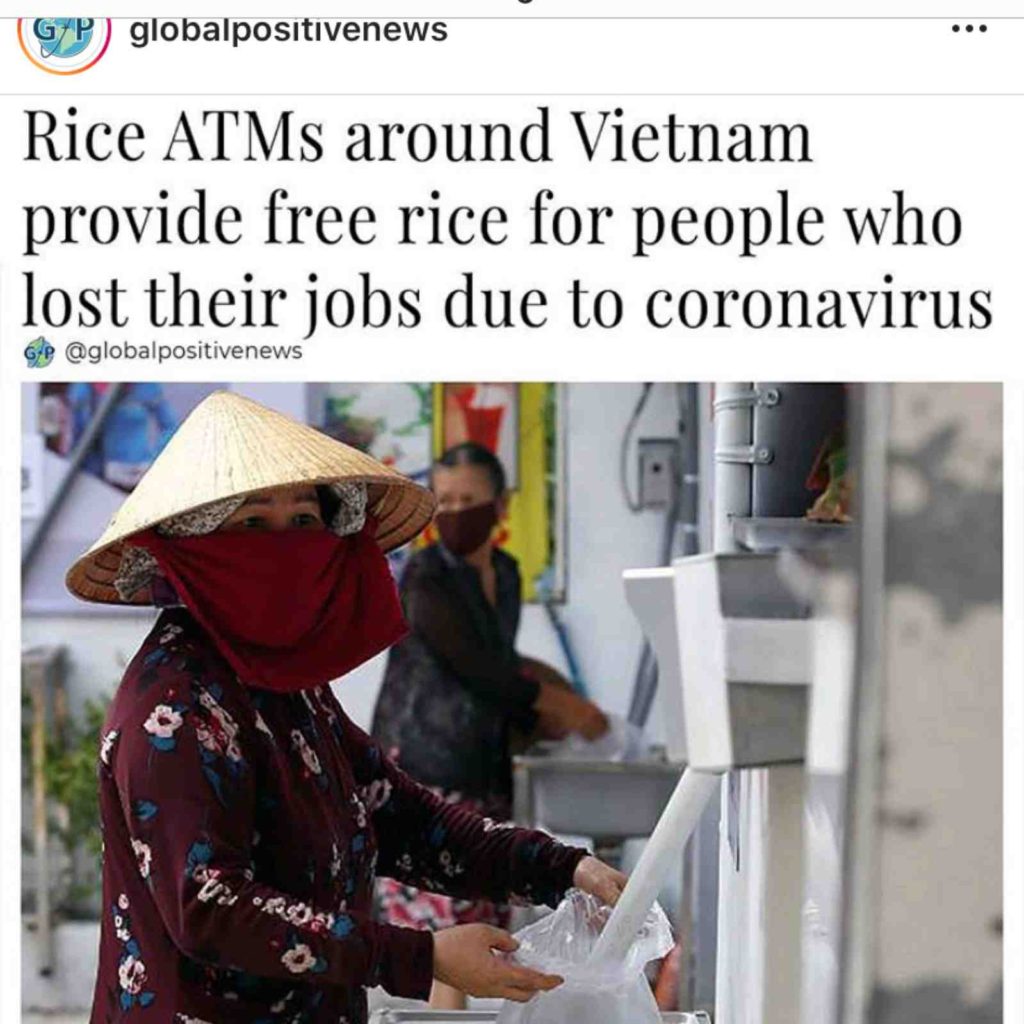
Thursday 7 May
Following the science – how many times have I heard that expression – I think that chief adviser Sir Patrick Vallance made a valid point when he stated that we should have started testing sooner. Although accurate data is not easy to find, clearly we have neglected care home residents and their less than minimum wage carers who have not had enough PPE. Professor Chris Whitty said that the twenty thousand care homes in the UK, Northern Ireland and the Channel Islands house around one percent of the population, yet sixteen percent of all Covid-19 deaths have occurred in them and in Scotland almost half the deaths recorded up to the end of April happened in nursing homes.
Last night I watched an episode of Rhod Gilbert’s Work Experience which he filmed before the virus outbreak. In a touching documentary he gave us a glimpse of what it’s like to be a care worker speeding from one home visit to another, giving constant emotional and physical support. In the beginning he feared having to wash bed-bound patients but by the end of the programme, he really didn’t mind cleaning other people’s bottoms because he had bonded with those he was looking after.
I don’t have any family in a care home but I grew up knowing that humble crew of people from the Philippines who often look after the elderly. When I lived in Tel Aviv and once volunteered to be a companion to a widow called Moshe, I was always impressed with the young Filipino, Alex, who travelled a great distance six days a week in order to be the old man’s arms and legs. Alex had a genuine bond with Moshe because of their years together which makes me think about the sorrow many care workers must feel when one of their dependents die, a sadness much greater than is experienced by hospital staff who may just spend days or weeks with a patient. Of course with the relentlessness of Covid-19, both NHS workers and home carers must often be going through the kind of trauma that soldiers on the frontline of wars might feel. Looking at the picture from all sides there are also millions of disabled people who are unable to see their regular carers right now and families who must look after disabled relatives where before they could rely on others to help with everything from feeding and washing to entertaining and reassuring.
Once again tonight we will be clapping for the NHS and other carers. Even as the government has given almost two billion pounds to councils in this unprecedented time, we need to make sure that in the future the nation puts its money where its appreciation is.
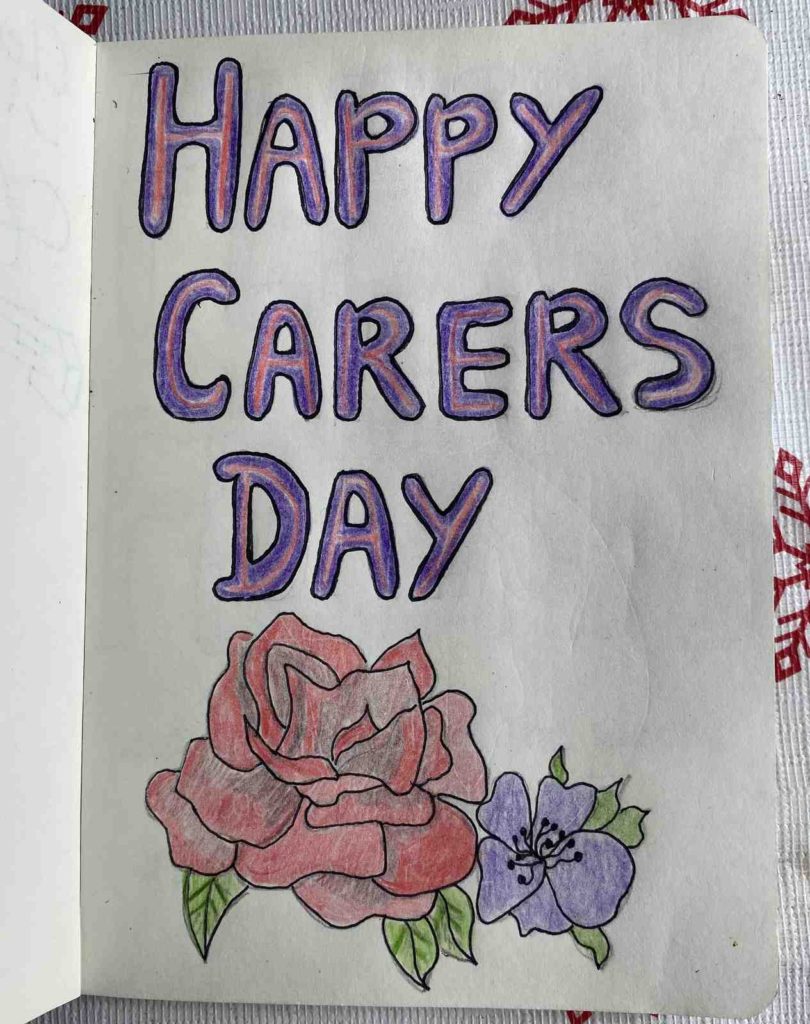
Friday 8 May
A bank holiday and, dare I joke, another opportunity to stay at home! It’s the 75th Victory in Europe commemoration day and I’ve been remembering those who made such a huge effort to free us from Nazi oppression and occupation. This morning, two spitfires flew over the White Cliffs of Dover, the Red Arrows did a ceremonial flypast over London, and a field gun at Edinburgh Castle announced two minutes of national silence. Later the Queen will address the public for the second time in five weeks. People have had afternoon parties on their doorsteps, recreating a time when teapots and teacups were used. The generation who fought in the second world war are now coming to the end of their lives yet continue to isolate rigorously.
On Regent’s Park Road there were many walkers enjoying the warm sunny day, and I saw one cluster of neighbours celebrating on their pavement, different households at a measured distance from each other. Back home I watched a BBC programme about the war, how people lived for five years separated from loved ones, with no street lights, blackout curtains in their windows, food rationing, and I can’t help but add, no internet. Julie Andrews, on the radio, when asked to compare now and then, said that as her parent’s generation knitted socks for soldiers, here we are making masks for key workers.
Although the celebration of VE Day has been sobered down by the stay at home rule, we can learn from the indomitable spirit of the men and women who worked together during World War II. I lost most of my grandparents’ relatives to the Holocaust, and as I revisit stories of what they and other victims went through, I empathise and cry in the moment and feel determined to live bravely and with optimism in the long-term.
The NHS was created directly after the six years of fighting and so I ask myself what great good will come about when we can finally hug again. I believe there will be a refreshed emphasis on our duty to care, and, more awareness of the boundaries that protect us from being hurt. These days I tear so easily when I witness acts of kindness and, on the other hand, I’m much better at ignoring other people’s negativity projected my way. Today as veterans polished their medals, cakes were being eaten and the song We’ll Meet Again was constantly coming to my mind, I thought of the people who have lost a relative, friend or colleague to Covid-19. If worldwide more than a quarter of a million people have been killed by the virus, what is the maths on how many are grieving?
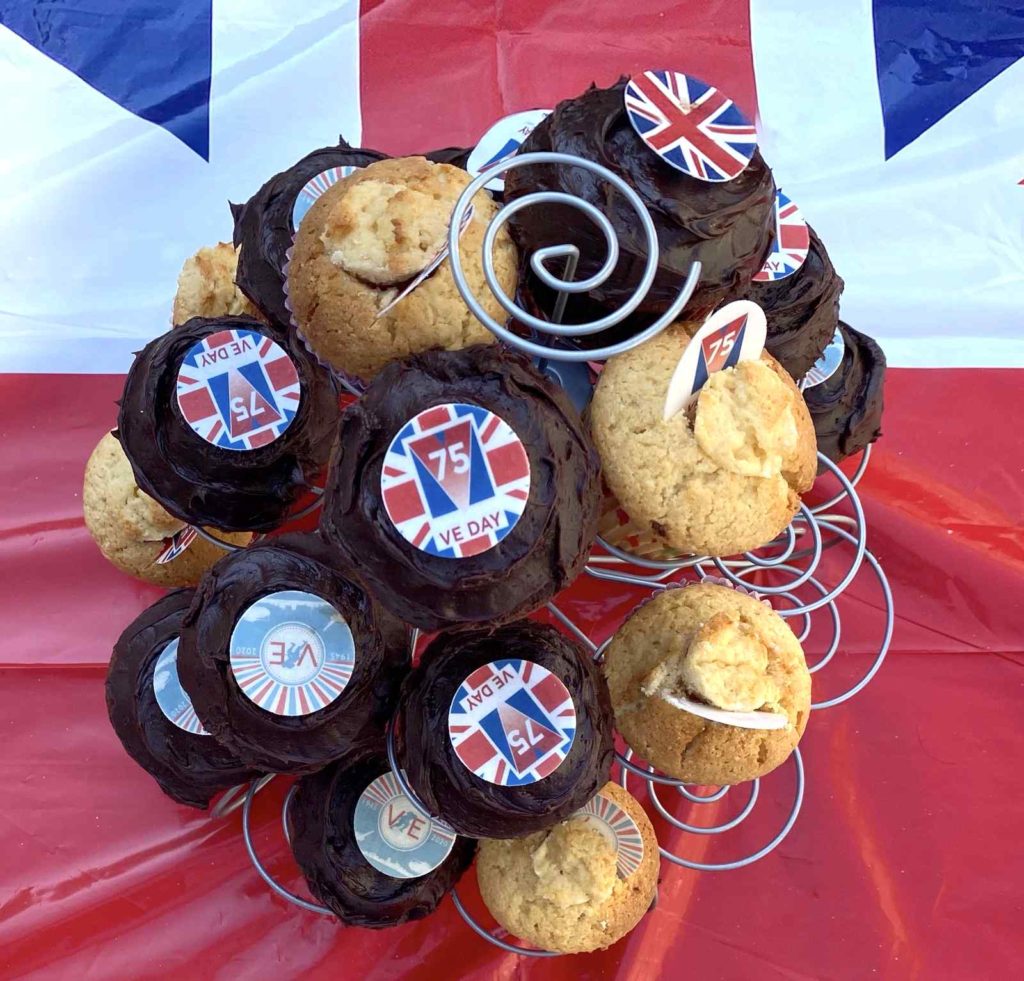
Sunday 10 May
To use or not to use a face mask? I’m not sure but yesterday I did buy a couple of homemade masks from somebody who had advertised on Nextdoor. At the risk of appearing shallow, I confess I was inspired by her choice of fabrics. We arranged to do the handover outside the Finchley Road O2 Centre. On my way there I noticed that other pedestrians were being blasé about the two-metre rule. I was constantly having to jump into the road, weave around bus stops or use polite hand gestures. That short trying walk made me feel like my decision to buy face coverings was not such a bad idea.
It seems that some people, fuelled by tabloid headlines, are rehearsing the freedom that they think the government is going to give us this evening when Boris Johnson will publicly address the nation for ten minutes. Two days ago a Nextdoor neighbour posted that she was willing to make home visits to those who need a haircut and she sparked a very lively dialogue, with some people rebuking her and others saying it’s about time. Having already heard the First Minister of Wales declare that the only change to lockdown for the Welsh is that they can exercise more, go to garden centres, libraries and recycling facilities, I don’t think we are going to see any major shifts in our present situation in England.
With forty-six days of standstill completed, emotions are running high and our mental health is being challenged by austerity. I’ve heard that forty percent of people aged eighteen to twenty-four years have reported that they are not coping. Some of them who should be in their universities are having to adapt with few live online sessions, pre-recorded lectures, closed libraries and laboratories, and final year students had already missed a lot of teaching because of strikes that happened earlier this year. Whereas in theory you can get your money back for a holiday that you can’t take, at present university students can’t get a refund and some of them have rented accommodation which they are not using. Universities are also looking at a bleak future with possible pay cuts and job losses, as they are so reliant on foreign students.
There has been data suggesting that sixty-five percent of people are afraid of lockdown ending. With over two hundred thousand people in the UK now infected, twelve thousand in hospital, and news of the virus resurging in Germany and South Korea, in truth, I’m apprehensive about resuming my pre-pandemic activities. I must say though, those stylish facemasks now hanging on my hat stand are giving me some emotional support.
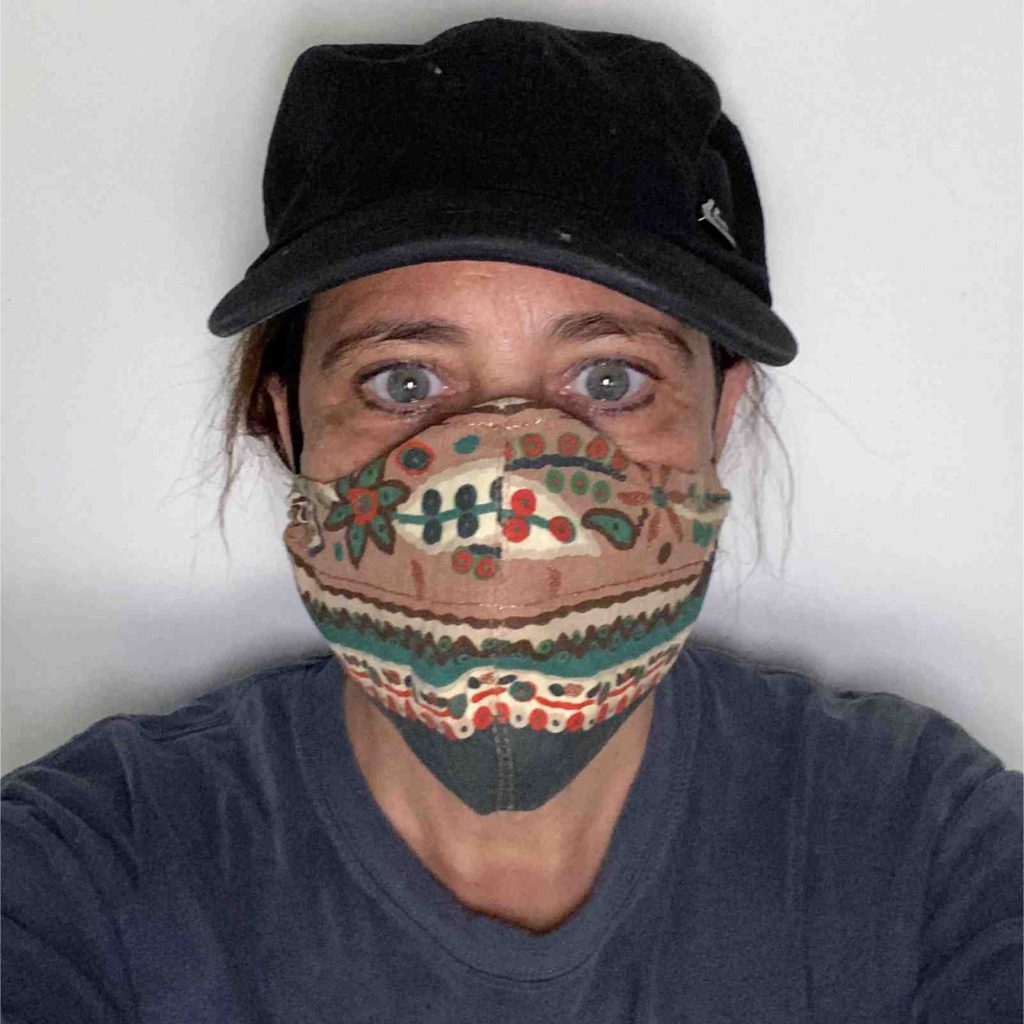
Week 7
Monday 11 May
Last night, after Boris Johnson thanked us for our patience, common sense, fortitude, thoughtfulness and self-sacrifice (a thanks you can see that I’m clearly clinging to,) I spoke with one of the members of Our Song Club, which is a local singing group that I started a few years ago. This friend whom I shall call Janet was in a bad mood. Although Stay At Home continues to be the slogan for Scotland, Wales and Northern Ireland, in England, as in France, we have a new motto – Stay Alert. Now British people have permission to exercise outside as much as they want, to have one-on-one physically distanced meetings in public outdoor spaces and from this Wednesday have been encouraged to go back to their jobs if working from home is not possible, Janet is afraid that her restless husband will go out wherever and whenever he wants.
“Where do you fear your husband will go?” I asked Janet. Her spouse doesn’t fish, play golf or tennis and he’s unlikely to take a long drive to a countryside location where he can’t stay the night. Besides as we’re just out of danger zone level five does he really want to go too far too soon? Yesterday I thought to treat myself with a meal from a local restaurant doing takeaways, and despite my ambition I ended up buying a frozen pizza as my first step into dining out.
Janet’s husband has said that he wants to drive to his office a few times a week. I asked her to imagine what that would like and after she pictured her husband wearing protective gloves in a workspace which would have been thoroughly cleaned and which he doesn’t have to share, his secretary at a distance, maybe masked, she didn’t feel so scared. Today in Parliament Boris Johnson is going to deliver more details about how employers can resume business safely. Many in manufacturing and construction have already been working during this last month according to government guidelines. The Prime Minister has suggested that people walk and bike to their jobs if they can and wear cloth coverings on public transport. I’m hoping the new pop-up bike lanes will become permanent and that our national recovery will be greener.
Even though Janet thinks we are loosening the chains of lockdown too fast, she realises that her anxiety is pointless because her husband’s actions, indeed all the world’s movements, are conditional on what Covid-19 does. She came to the conclusion along with me that just as we must be vigilant and prepare for worst case scenarios, we need to hear the shaking of that bunch of keys that will bring us more freedom and allow people who don’t have Janet’s financial security to make money and in some cases, to be able to feed their families.
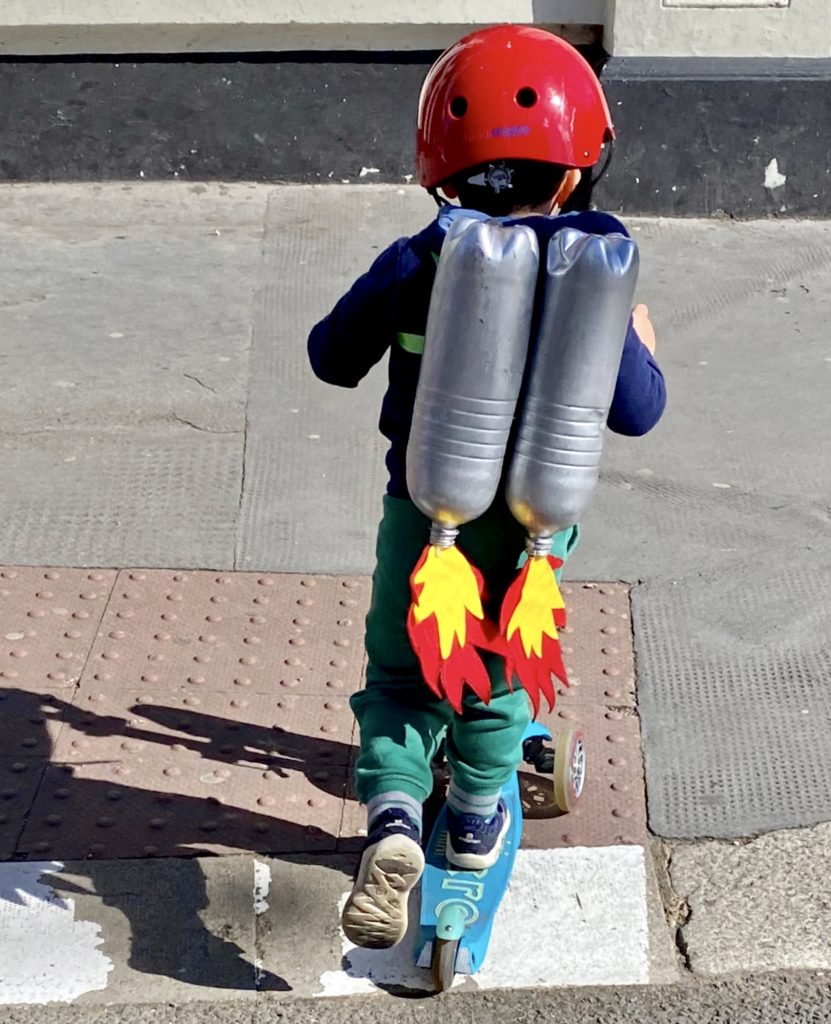
Tuesday 12 May
Feelings can influence perception, attitudes define interpretations, weaknesses and strengths in everybody. The man whom I met this morning outside our greengrocer was dissing the government, with several remarks I’d already seen online yesterday. “Oh the blame game!” I instinctively responded, and not because of any political allegiance or indifference to people’s hardships, but because I didn’t want to be in that angry place where my government has failed me and queuing for vegetables would irritate me. Surprisingly, the neighbour replied with a chuckle, “Absolutely, too many new rules and regulations and I’d be complaining that we live in a draconian state.”
Greater Manchester’s Mayor and Labour party member Andy Burnham has said, “we don’t want an over-prescriptive government but to live in a country where we can apply individual discretion and be credited to be able to join the dots and think for ourselves.” I also agree with him that the four nations of the UK need to be flexible in their lockdown measures because different regions are being affected by the virus at varying paces. Presently northwest England is being hard hit whilst in London the infection rate is decreasing.
There are a minority tweaking national guidelines but still making sensible decisions, highlighted with caution. Whatever one’s viewpoint on the government’s proposed three stages of easing lockdown, which include from June a phased re-opening of shops, nurseries and primary schools (but not compulsory for children to go) and hopefully from July hair and beauty salons, restaurants and pubs, leisure centres and places of worship will be revived, I do believe enough people understand that our actions must be with awareness of this easily transmitted virus which we are still learning about, and the need to socially distance and frequently wash our hands.
Even people who have been breaking lockdown rules have found that they can not ignore the reality we’re in. I was lounging in Primrose Hill Park last Friday (before we were allowed to do that, oops) and six metres away I could hear a woman talking loudly on the phone. She was going on about a connection she had with some guy and how they had been in each other’s homes during lockdown. She felt that recently he was seeing too many friends and now had this dilemma of either insisting he meets less people or cooling things down between them. Her conversation reminded me that really the only one to blame for any upheaval, frustration, discontent or grief is Covid-19.
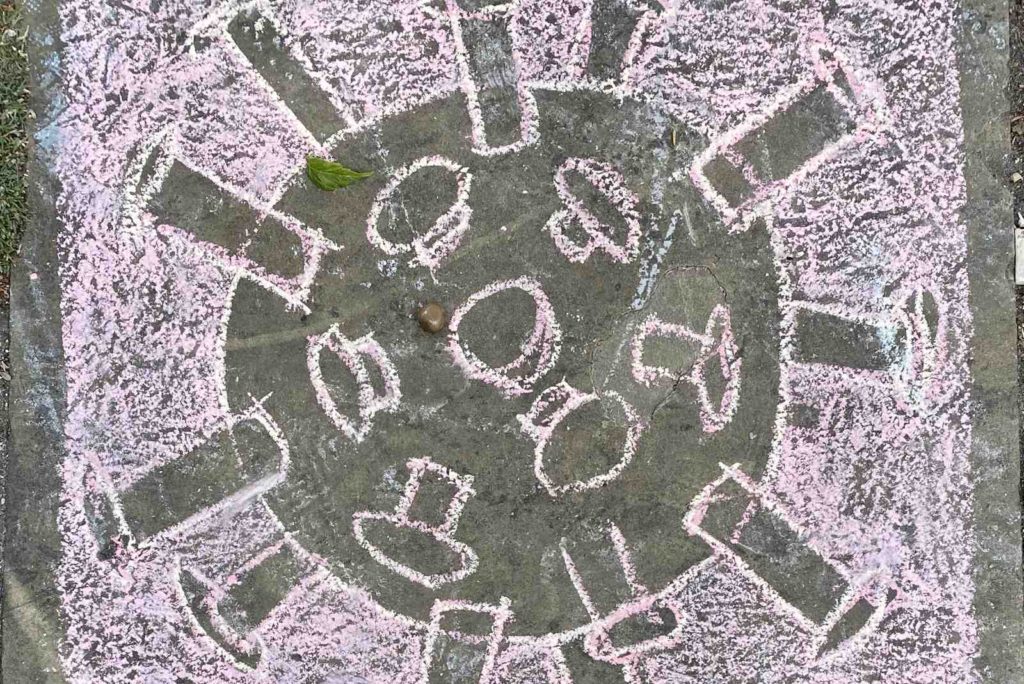
Wednesday 13 May
Oh dearie, dear. Looks like I might not have a summer holiday abroad this year. Even if airports can accommodate us with the two-metre rule and airlines like Ryanair believe they can devise safe flying by July, unless I go to France, Ireland or the Channel Islands, it has been said I may have to do two-weeks quarantine on my return. I could train to somewhere in the UK, give a boost to our own economy, but all I can think about now is how I get a refund for my already booked flight to Spain for mid-June. When the Health Secretary said summer holidays abroad are unlikely, I once again felt sympathy for all the hotels, B&Bs tourist parks, restaurants and cafes, created to give us pleasure, and yet high on the list of economic casualties. In the UK the hospitality industry is the third largest employer and eighty percent of its employees have been furloughed.
Whilst we wait for more insight on how public transport is going to evolve because people are returning to work and according to yesterday’s footage they’re hardly wearing face masks or keeping distance from each other on the underground, we have been updated about the government’s job retention scheme. The Chancellor said he will continue to support over seven million workers in eight hundred thousand companies until October, but from August employers will have to contribute to paying furloughed wages. Some staff will be allowed to work part-time but we might still see a spike in redundancies thereafter and many more than three million people on Universal Credit.
The UK, unlike poorer countries, can borrow unlimited amounts at a low interest rate and because we’re not in the Eurozone we have control over our own currency, but we are clearly in a recession. Looking forwards, taxes will likely rise and the government and bank regulators will need to intervene if a significant quantity of companies become insolvent. Our national recovery is also dependent on international trade and whether other economies will be going in and out of lockdown over the next months. In the USA the slogan on the iconic red baseball cap has gone from Make America Great Again to Keep America Great.
On the bright side, I heard that someone has invented a video game in which the aim is not to save your own life by killing others, but to rescue the world. Your final score on this free computer game, which apparently is already proving to be popular, will depend on how many lives you can save.
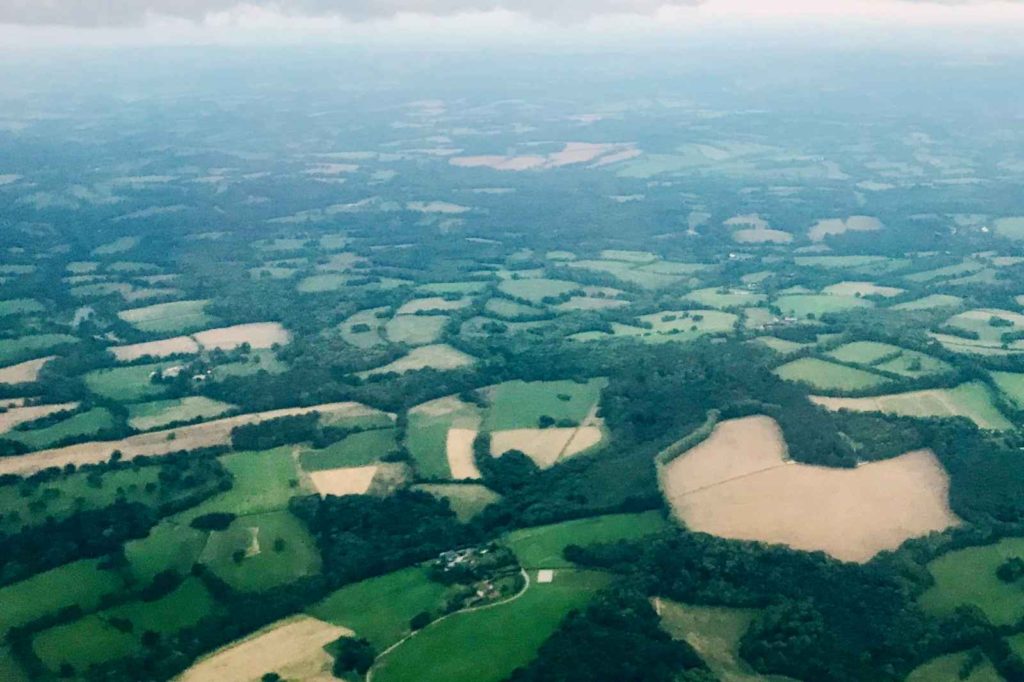
Thursday 14 May
This is my first year that I did not miss the news that on Tuesday was International Nurses Day, a celebration started fifty-five years ago in the UK and observed in many countries. It marks Florence Nightingale’s birthday which was exactly two hundred years ago. Usually there’s a service held at Westminster Abbey but this year, senior members of the Royal Family thanked the world’s nurses in video and telephone calls.
I heard that there’s been a three-fold interest in people wanting to become nurses and it is good to know that their bravery is contagious. We’re in the process of nursing the world to health and although the NHS now has capacity to deal with Covid-19 victims and can offer better supportive treatments, the work of our doctors, nurses and carers continues to be rigorous. The latter are still mostly underpaid, on zero-hour contracts, without free visa extensions and a quarter of them haven’t been tested. Each day I discover something new. Now I know that when a patient comes out of a coma or has survived intensive care, their rehabilitation needs a huge team effort by health psychologists, dieticians, physical and speech therapists. Also coronavirus isn’t just a respiratory illness, it can attack the heart, kidneys, even the brain.
We are being told that the number of people every carrier is likely to infect, the R rate, is between 0.6 and 0.9. I listened to a pathology expert who said that this transmission estimate is dependent on many variables, like how infectious people behave and what does it really mean to be asymptomatic. Although we now have an approved antibody test, he added that at present scientists don’t know how long natural antibodies protect people who’ve had the virus and that any predictions that are being made are “less laboratory science and more like weather forecasting.” We need to learn to live with coronavirus in a sustainable way and should establish hospitals which are solely for treating people with infections, he concluded. Data has shown that non-covid admissions were down fifty percent over the last two months and there’s been a scary drop in people who may have cancer being screened.
I made a cup of tea after the pathologist’s rather bleak but credible prognosis and switched the radio channel from ‘coronaversation’ to music. The Beatles’ Yesterday was playing and I was reminded of one of my favourite John Lennon quotes – Everything will be okay in the end. If it’s not okay, it’s not the end.
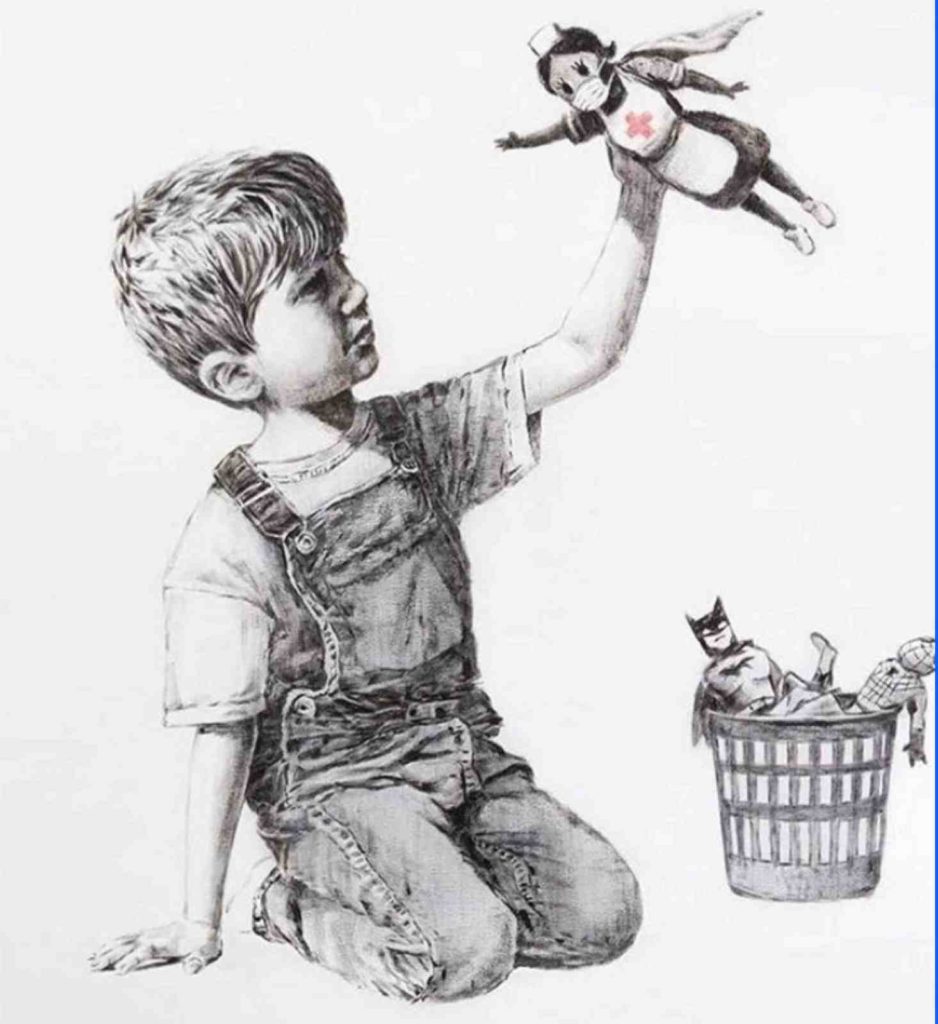
Friday 15 May
With the proposed June re-opening of nurseries and reception year at primary schools, controversy is circulating. Education unions have said that it is reckless and unrealistic to expect teachers to be with children up to six years old who can’t know how to ‘stay alert’ and keep physical distance. Fact is that only two children have died after testing positive for coronavirus and preliminary research suggests that if children become infected it is in a mild way and they are less likely to be infectious. One care worker, whose been living apart from his family all this time, has responded by saying that if children, who normally transmit viruses like influenza easily, are carriers, “sending my youngest back to school will simply undo all the sacrifices I’ve been making.”
The government may be viewing teachers as carers for children whose parents are going back to work and there are already about eighty thousand children of key workers in nurseries. They insist that early years of education are vital for developing social skills, yet reality is that most of early school activities are practical and involve touching. Then there’s the argument that in our new ‘digital divide’ disadvantaged children, who are still chasing vouchers for free lunches, haven’t had sufficient home schooling.
Year six children have also been invited to go back to school, with the suggestion that classes be no bigger than fifteen pupils. Two eleven-year-olds whom I know already have classes this size, in buildings with narrow corridors. More optimistic headteachers imagine giving students packed lunches at their desks, asking them not to wear uniform so that they change their clothes more often and staggering start times. They hope their staff will have access to protective clothing and infrared thermometers. In the excellent documentary The Country that Beat the Virus: What Can Britain Learn? I was impressed to see the thermal imaging scans that South Korea uses in public places.
I don’t have children so I can’t say whether I would send mine back to school, although I’m sure many kids are eager to be with their friends again. In these uncertain times I don’t think I would want a younger child to spend their day focused on virus-appropriate behaviour and in the care of a teacher who may be hesitant. Besides there is this newest report that in the UK, France, Italy, Spain, The Netherlands and the USA about one hundred children are critically ill with an inflammatory condition never seen before that doctors have linked to Covid-19 because these youngsters tested positive for the virus.
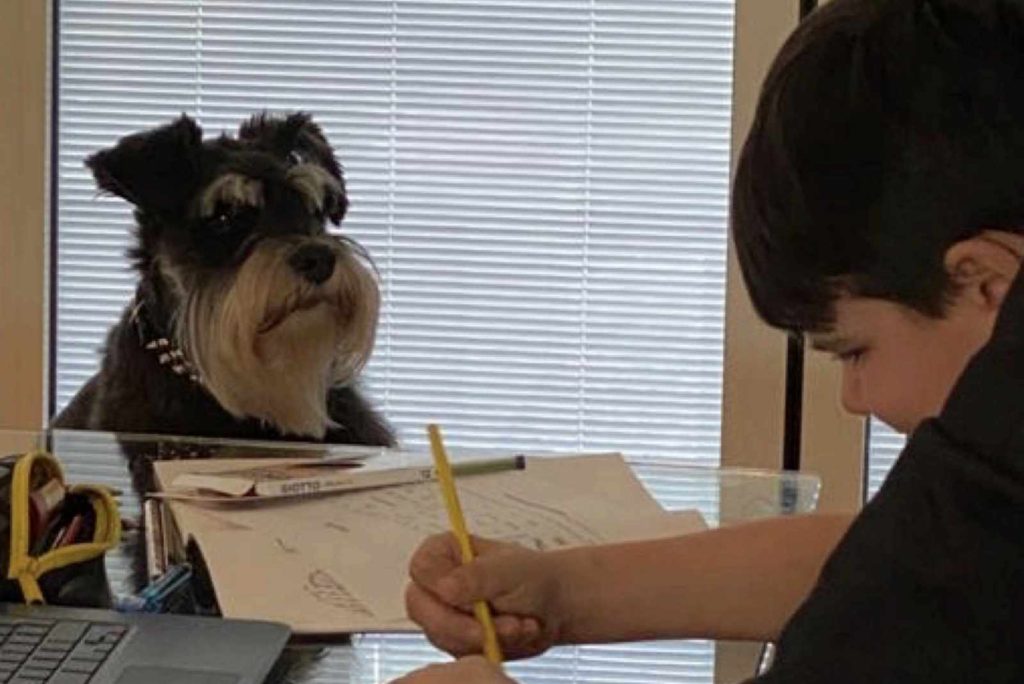
Sunday 17 May
Yesterday evening I had no dinner menu because the fridge was empty save for condiments and a potato which I baked and accompanied with vegetarian sausages from the freezer. Fortunately it’s hard to run out of viewing options. As I had finished Normal People on BBC iPlayer, was up to date with Killing Eve and reluctant to watch my very last episode of The Durrells, I decided on the isolation version of Eurovision, seasoned with Graham Norton’s sarcasm. A world pandemic can’t stop the music and the sixty-fifth European song competition was hosted in The Netherlands with all the participating countries performing via satellite. It was a bonus that each song was only thirty seconds long and there was none of that arduous scoring. This year my ‘douze points’ went to artist Diodato whose song Fai Rumore has gone platinum as it’s so comforting to the Italians. At the end of the show all the performers sang the 1997 UK winning song called Love Shine A Light.
Today with the sun yet to appear I feel I need love to shine like flashing strobes. I woke up and put on a top that I bought on a recent holiday and felt an ache as memories of a clear aquamarine sea and carefree sunset moments with loved ones seem unreachable. Inspired by the Premier League who are considering how football games can go ahead, partly so that they don’t increase their difficulties by having to refund huge broadcast payments, I too, this morning, am focused on my own Project Restart.
I don’t have a car to go somewhere pretty and if I did there would be no pub lunch to crown the walk. What I do have is the power to be kind to myself and and for me music is the ultimate lifejacket. Impressed by Gareth Malone’s January documentary The Choir Aylesbury Prison, I am following his daily sessions on the Great British Home Chorus in which he teaches cheery, nostalgic songs with harmonies. Singers are invited to upload a portion of a song and then all the contributions will be edited together.
Musicians and performers have been dealt a mighty blow in our economic shrinking. Even when they can return to their stages, a two-metre rule will mean that for many it’s not financially viable. With free music at my fingertips and having never needed to ‘spotify,’ I can’t complain. And the music keeps on giving because from this June classical concerts recorded in empty halls will be live-streamed every lunchtime. Realising that ‘gently does it’ is my best Sunday mantra I will now shut the windows, plump the cushions and phone in hand embark on a mood-saving, spirit-raising karaoke search.
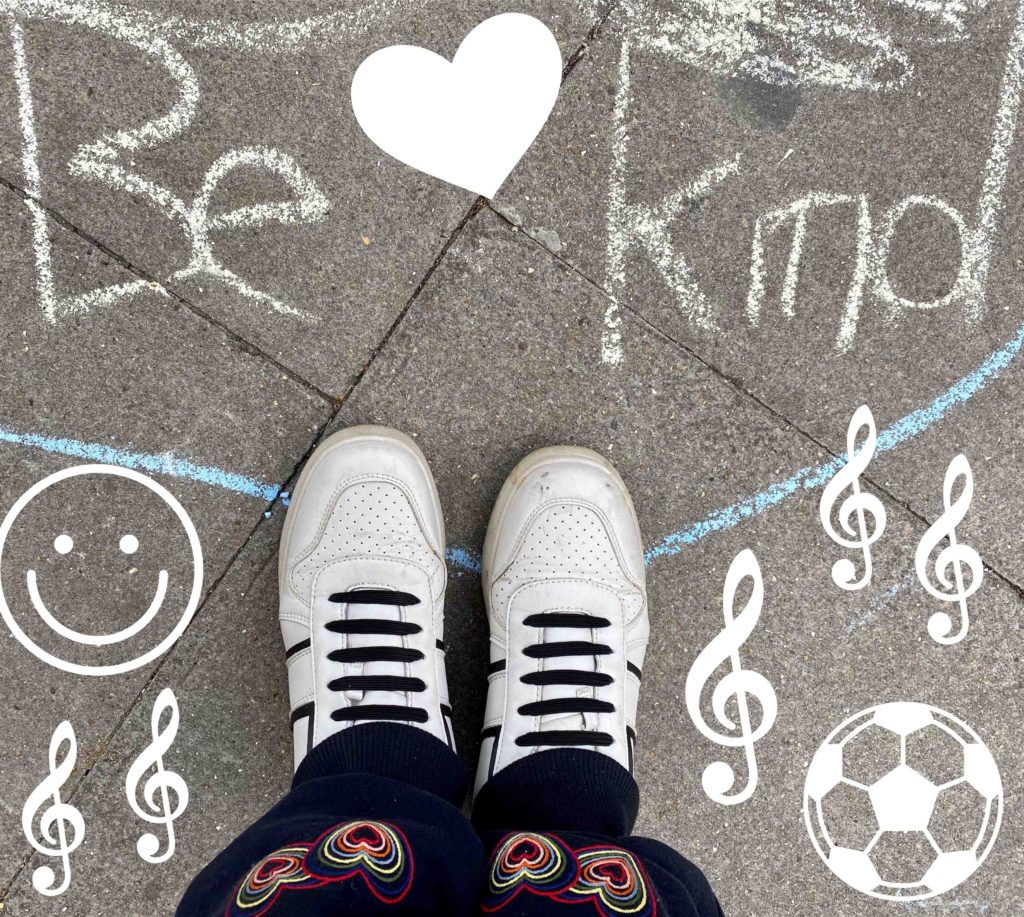
Week 8
Monday 18 May
For some people Monday is no longer another Sunday. They are, since last week, back in their workplaces and having to decide how to get to their jobs. The government have suggested we wear a face covering on the underground but are not following the Spanish example of handing out free face masks at stations. The common sense of us common people is prevailing as the answering machine messages of all the bike shops I’ve called have explained that they are struggling to cope with an unprecedented (oh that word again!) amount of people wanting bicycles.
After a week of explanation by politicians and the media, the government’s new Control The Virus message has become clearer and lockdown has definitely eased. The death toll is no longer six hundred plus per day, anybody over five years old with symptoms can be tested, although fact is that it can take many days to get a result. In France, Austria and Denmark distanced gatherings of up to ten people are allowed and Italy hopes to be ready for tourists by June. Strict lockdown rules in some African countries, like no buying alcohol or cigarettes and night curfews, are being slightly relaxed.
I read an amusing article about how you can learn a lot about countries from the way they lift their lockdowns. The writer pointed out that in Italy the first businesses to start up were bars selling takeaway espressos and in Greece, churches and hairdressers were first to open their doors. You can now go to a shopping mall in Thailand and quarantined German footballers are ready to compete but without live spectators. In England an alternative Chelsea Flower Show is on screen but recycling tips and garden centres have opened.
During lockdown, more than cooking or reading, people have found solace in gardening and the lucky one in five UK households with a garden have probably been topping up on essential vitamin D, which some are saying is helpful in the battle against this plague. Every morning I check my balcony boxes to see if the seeds I’ve randomly planted are growing and I get such a feeling of hope and faith when little green shoots start coming through. I’ve planted more seeds than I originally planned because I love handling the moist soil. When overnight a bud opens I feel like the flower fairy has left me a gift. I inhale the scent of the colourful flowers around my neighbourhood and this being the age we live in, photograph them too. Now I have the time to make good on that quote – Stop and smell the roses; and if I can’t, then along with an inability to taste, it’s a sign of you know what.
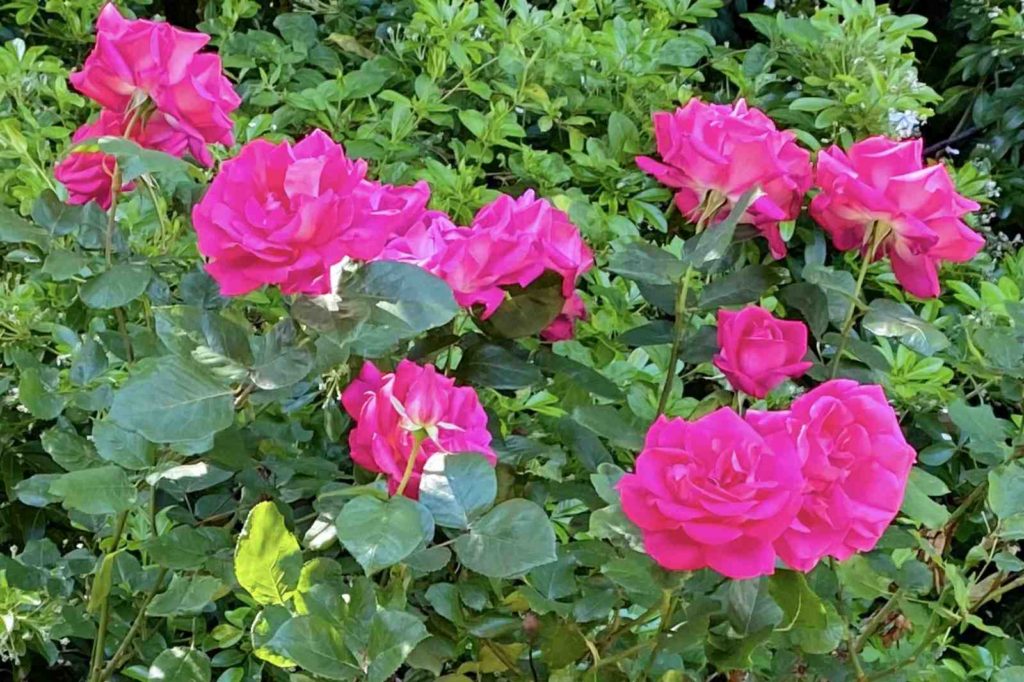
Tuesday 19 May
Now that it’s been over four months since Boris Johnson first talked about coronavirus as a flu-like illness which might disrupt trade, we have had time to reflect. At the beginning of March, a factory in Collingdale was sending test kits to South Korea and our prime minister was proudly shaking hands in public. We had our first death on the 5th March whilst the World Health Organisation was urging “test, test, test.” We stopped community testing in mid-March, and about that time it was reported that a celebrity, Tom Hanks, had the virus and more of us took notice. The Cheltenham Festival went ahead although the Premier League cancelled football matches. Thereafter we were advised not to go out but venues like pubs were still open. We went into official lockdown on the 23rd March and ten days later our death toll was over two thousand.
During April nearly twelve thousand infected care home residents died. Previously in March some fifteen thousand patients, untested or Covid-19 positive, were moved from hospitals back into the community, mostly to care homes. One wise interviewee has said, “you have to know where the fire is burning. If you don’t, you can’t put it out.” The government knew where the flames were rising, as early research had shown that elderly people, especially, with diabetes, chronic lung diseases and dementia were most vulnerable.
Lack of focus on care homes, the delay in essentials like protective equipment, test kits and test results to carers find many agreeing that “the social care can has been kicked down the road.” In 2009 a stockpile of PPE was set up but despite old labels being covered over, it was discovered that almost half of those two hundred million items had expired by the time they reached the carers who have sometimes had to move in to the nursing homes where they work. These skilled workers have had to be the bridge between the dying and their relatives who are unable to see each other in last moments, and, the sole support system for the surviving elderly, who are coping with other critical illnesses. To date one hundred and thirty carers have died from Covid-19.
Even if inequality can’t be resolved, equity is within our scope. Writing this diary I repeatedly return to the predicament of care workers, many of whom are hoping that their expensive visa extensions will be waived. In the same way that much of the public, and many of my cautious family and friends, tweaked their lockdowns before new measures were announced nine days ago, I do hope that our weekly clapping and banging of saucepans for key workers is also a sign of the public being one step ahead of the government.
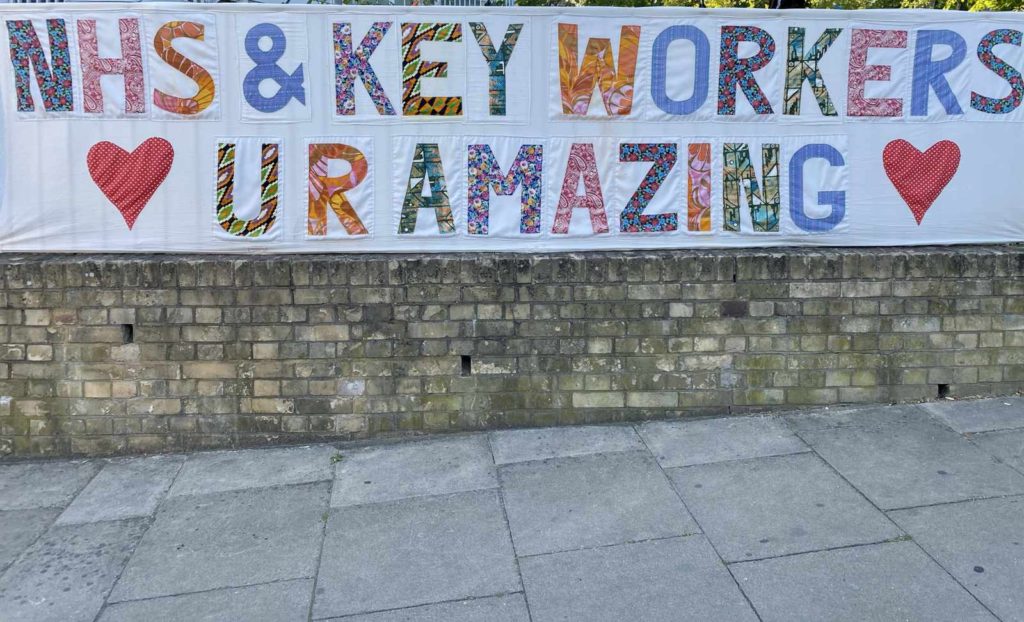
Wednesday 20 May
I can shop for a new house but I can’t get a haircut. I’ve seen how other countries have let hairdressers open at the start of their lockdowns loosening, and that with customer limits and protective clothing, caution seems to be in place. Grooming products like hair clippers and dyes are regularly selling out on our virtual shelves, but we have to wait until July at the earliest for hair salons to come back. Maybe the thinking is that if they are allowed to open now than all the other self-care places would demand the same right. It seems that every TV presenter or host is clearly having their hair done and I’m okay with mine growing longer. I’m actually more in need of acupuncture which cures the hand tremors I sporadically get. However I believe that hairdressers are sort of essential workers. A professional tending to your hair can so improve your well-being, like in the example of somebody, after a relationship break-up, who is renewed and more confident with a fresh haircut.
We are in Mental Health Awareness Week and some are also in a Catch-22. Sadness or depression can lead to self-imposed isolation and apathy, and, idleness and solitude can cause melancholy. I’ve known clinical depression and that inability to sleep, wash, eat, relax and make decisions without medication. I know what it’s like to stand rigid on a doorstep for ages, my brain not functioning to let me either move forwards or return to the sanctuary of my bed. I saw how my behaviour exasperated those who wanted to support me, who couldn’t understand how one moment I was calm and pleasant and the next sobbing, filled with self-hate and unfounded paranoia. Now that episode is in my faraway past but it’s made me a great believer in cognitive therapies and evidence based treatments for mental illnesses.
Anxiety is a long-standing epidemic, right now moving in tandem with our viral malady. There are many simple tools to cope with stress-related symptoms, and for me touching nature and looking skywards always help. Initially we must give ourselves permission to feel bad or cry, even if we have wealth or are not isolating in one room. As lockdowns slacken, some will find it hard to come out of their cages and others may fly the coop erratically.
My friend got a puppy a few weeks ago and I’m reminded what great healers dogs are, in the loyalty and love they give and because they can keep us purposed and exercised by their daily needs. I see the happiness this cockapoo has brought to her new family and how she has made my friend’s children feel more responsible and to drop into a gentler space.
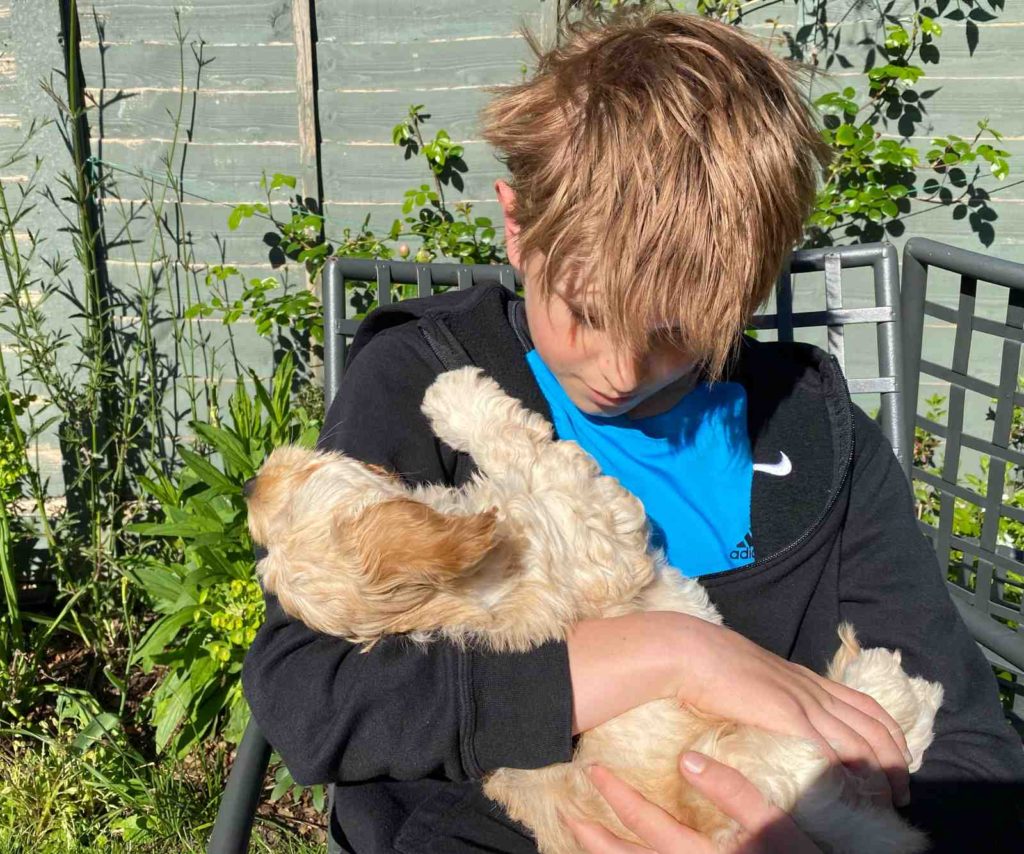
Thursday 21 May
I only need to send a text and a woman I found on Nextdoor who lives nearby will leave me a jigsaw puzzle in a bag on her doorstep. Every Thursday evening I catch up with the neighbours who live below me and on TV I’ve seen socially distanced street tea parties and barbecues. I read that some people are putting yellow hearts in their windows when somebody they have loved has died, so that others who are grieving will not feel alone. A national campaign has been launched to encourage children to write letters to elderly residents of local care homes and I’ve heard a few people suggest that what we should learn from this crisis is how important it is for children to hear their grandparents’ stories whilst they are still alive. I have always wished that I had talked more to my Austrian grandmother about her fascinating life and how she arrived to London penniless after World War II and became a well-known milliner.
Public spirit and generosity have been remarkable. Tom Moore, about to have a second upgrade and be knighted, has now set up his own charity which will focus on loneliness. The actor who played Gollum in the Lord of the Rings and Hobbit films raised over a quarter of a million pounds by reading The Hobbit in a non-stop eleven hour live-streamed performance. A recent figure says that to date over one hundred million pounds has been donated just to NHS charities, of which there are about two hundred and forty.
Inspiring though that it is, many other charities are experiencing a demand for their services but are running on reserve resources. Age UK, so relevant right now and busy sending out food parcels, it too needs money. It seems donating must become a regular part of richer people’s spending, especially if it’s true that we are only as strong as the weakest link. In the case of the Arts, which have kept us sane in lockdown, hopefully artists and venues will flourish in the future because of enough caring, benevolent patrons and supporters.
Coronavirus deaths continue to shine a light on the disparity in health, housing, education and employment between poor and rich. Having learnt that bus and taxi drivers, security guards and shop staff are risky professions, how can I now not have more respect for these essential workers. It took a few days, months ago, to learn the names, some of which needed spelling out, of all nine people who serve me in my local food store and the bakery, and what a difference it has made. I can’t speak for them but when they remember who I am, what I do, I get another buzz from belonging. I hope that I am witnessing a lasting trend in which the greeting how are you? becomes how can I help?
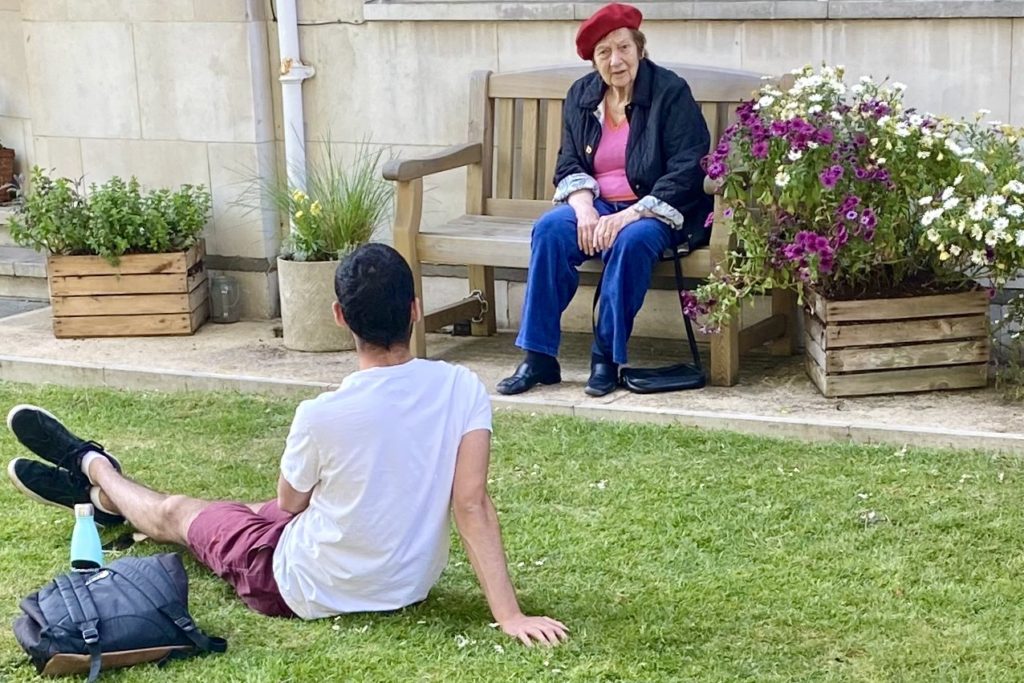
Friday 22 May
I have this weird jokey habit of making guesses. I say things to myself like “when I finish this bottle of whiskey, lockdown will be over.” I quickly deleted that prediction because I drink a dram occasionally and I’m only halfway through a bottle I bought two months ago. More recently I estimated that “freedom will return when I finish my book.” Then I had to bin that thought because I’ve just started two online dramas and I’ll probably watch an episode a night before sleep instead of reading.
Lately with these sandal-friendly days, I spend more time lounging in nature. Mostly I still have the same routine – research, write, make art and meals, keep in touch and go online. My to-do list, all domestic activities except for a big weekly shop, never ends, although lately it is becoming more of a to-be list. I stare at the lush green trees beyond my balcony, whooshing in the mighty breezes, and I have a new habit of drinking tea without doing something simultaneously.
I feel shielded (the new catchword) from worries by the insights that keep on coming in my unhectic, peaceful existence. I do wonder when I’ll be earning money again from my seven different jobs; yes seven – a perk of living solo is that you have time to pursue and organise varied professions. These jobs include face-to-face life coaching, ghost writing, decluttering people’s homes, selling handmade childrens’ clothes at craft fairs and working on a Friday at an accountancy firm which has furloughed me since April.
Yesterday I met my sister-in-law offline for the first time in two months. I was so excited to see her I put on a skirt. She arrived with a frappuccino for me as her local Starbucks had just opened with a click and collect method. We sat on either end of a bench and took a photo together, metres apart. Later on my way to my flat, blissful from our reunion, I saw two men toiling as usual with heavy crates of food to be delivered. I asked if I could take their photo and, like all the key workers who have posed for me, they were delighted to be reminded of their celebrity status.
When I got back home, still sipping on my cold coffee which must have been extra-large size, I switched on the evening News. The reporter said that the number of unemployed in the USA, thirty-eight million, has just exceeded the population of Canada. The American belief in liberty and livelihood is right now literally and largely a dream, and my heart aches for more of my global family.
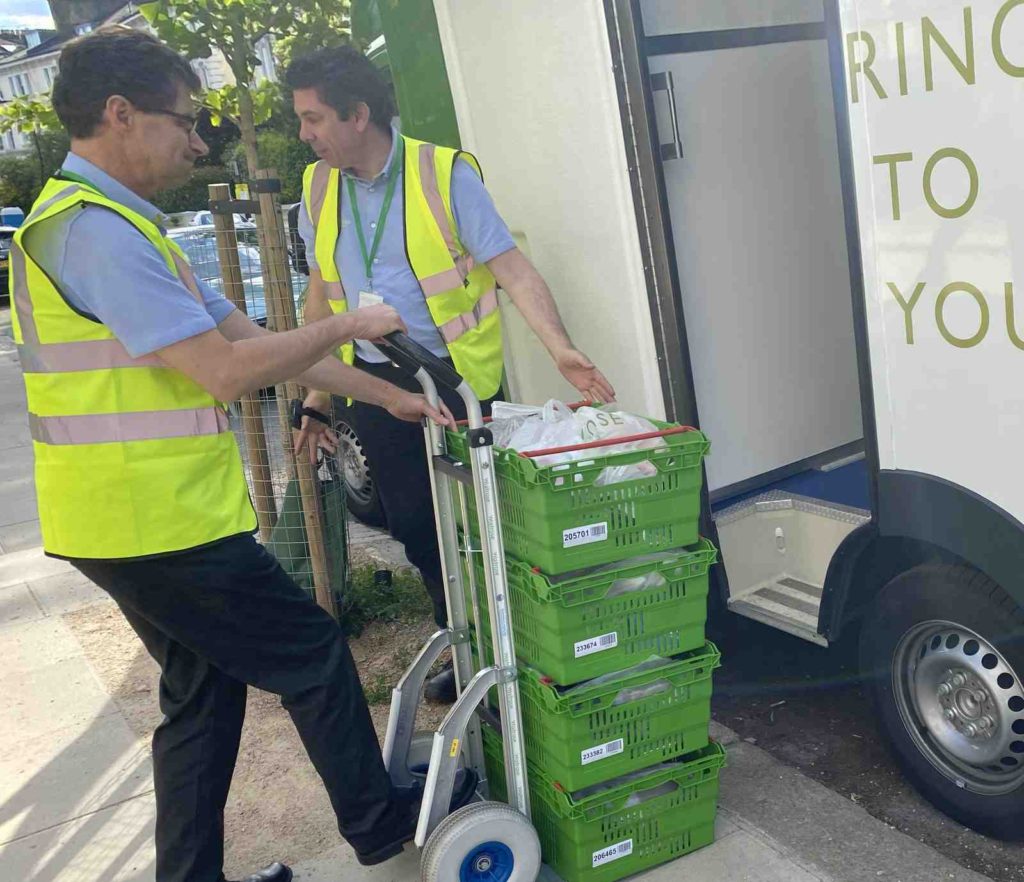
Sunday 24 May
Whilst this speck of a virus, eight times smaller than bacteria, has managed to control, derail and end lives, that other influential and dominating phenomena, Climate, can’t be ignored or underestimated. In May torrential rains across East Africa caused floods and landslides and people in Uganda, Kenya, Somalia, Rwanda and Ethiopia had to flee their homes. Climatologists said these rains, which washed away roads and villages, were the worst for decades. Now there is talk that a tropical cyclone fast approaching Western Australia may also cause colossal damage. A few days ago the super cyclonic storm Amphan slammed into East India, Bangladesh and Sri Lanka, causing three million people to be evacuated hours before the waves flattened their homes, uprooted trees and contaminated once fertile soil. The city of Kolkata (aka Calcutta) has been badly affected and fear of catching coronavirus must be deferred as survivors cram together in temporary shelters.
India has had a tough time of late. In March its people had four hours to prepare for a lockdown from a virus some hadn’t even heard of. When they did understand that Covid-19 is a killer most migrant workers naturally wanted to get home to their villages, at least to die amongst family. However state lines were rapidly closed and many moving around on the roads were hosed with disinfectant. Then in the first week of May an explosion at a factory in Andhra Pradesh killed thirteen people and made more than one thousand sick after being exposed to the gas. Days later two Bollywood legends, Irrfan Khan and Rishi Kapoor, died within twenty-four hours of each other. All over India hospitals are now at full capacity because of coronavirus and many streets are lined with people, plates in hand, hoping to get a daily meal of rice and lentils.
I started this day’s entry because extreme and brutal climate has been back in the headlines and I feels it needs to stay in my consciousness. Even after lockdown we need global carbon emissions to continue to drop around eight percent every year to make a difference, to focus on greener policies and habits, invest in renewable power, face our waste and realise that economic and environmental prosperity can co-exist. I fear that profit-based business methods that seek to conquer nature will turn against us because we are not the makers of nature, just one part of it. In the words of Satish Kumar, environmental expert, education director, eloquent orator and author of Soil Soul Society: A New Trinity for Our Time – ‘ecological peace is a prerequisite for world peace.’
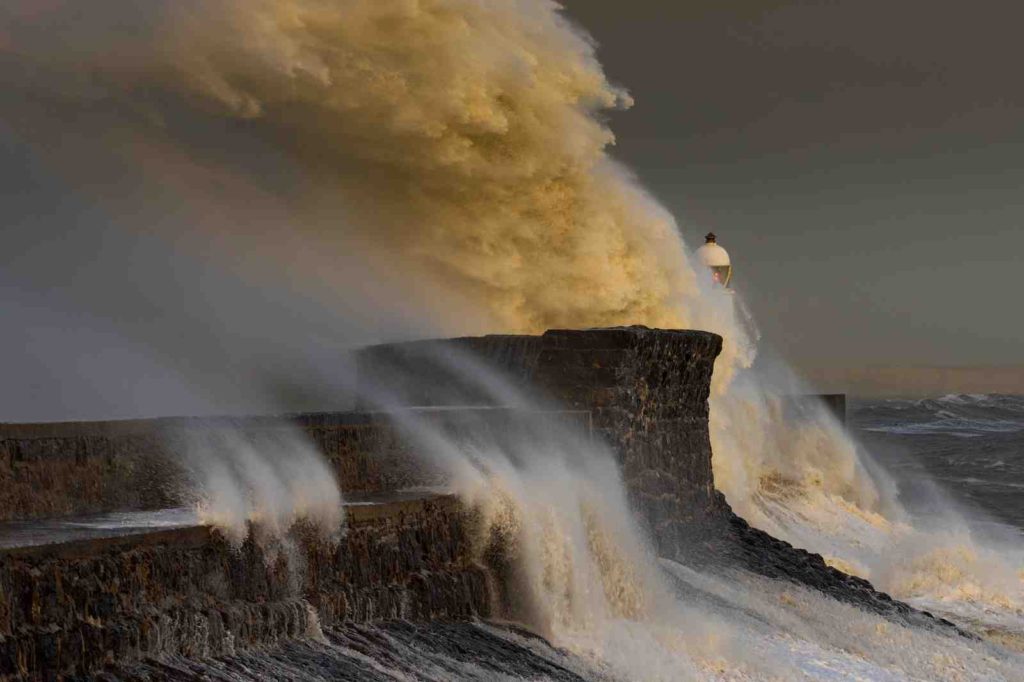
Week 9
Monday 25 May
Last Friday I got a cold call that I haven’t had since before lockdown. “We have been informed that you were involved in a car accident,” a voice said. Usually I respond in a scathing way to these anonymous callers but this time, adapting to present circumstances, it was a computer on the other end. With internet so integral to our lives, scams and viral crimes seem to be getting worse, or maybe I’m just hearing about them more often.
I’ve always known about how people looking for romance online can be targeted and conned into emptying their bank accounts or giving their pensions away. Apparently nowadays fraudsters pose as nurses needing money on online dating sites, and the latter have not really been affected by lockdown. In fact soon after we shut shop in the UK, Tinder users worldwide made three billion swipes, the most the app has ever recorded in a single day. Zoom dates and messaging are on the increase and I suspect people like not traveling somewhere to have at least one drink with somebody whom they may realise in the first minutes of actually meeting is not a match.
I’ve started following a radio series about the twenty-year fight for justice against the Post Office which prosecuted hundreds of sub postmasters after their new IT system mistakenly showed that money was missing in branch accounts. Five hundred and fifty people are to be recompensed but some of them have already spent time in jail. More recently I heard about a student living with his parents in Camden Town who was arrested for emailing people about a government tax rebate they were entitled to. He stole their credit card details without even having to request that specific information.
Action Fraud says that because we are expecting messages which might inform us that are bills are subject to change during this crisis time, there are more online thieves circulating. I got an email from the recently cyber-hacked airline EasyJet saying that I’m one of nine million people who have had their recent travel details stolen. Then I got another email about claiming a refund on a cancelled flight but, even with a new password, I’m afraid to press ‘click here’ and start a dialogue. In the larger world of crime I am mostly saddened to hear that in the last months there have been about six hundred cases of key workers, including many nurses, who have been assaulted. Unfortunately human viciousness is age-old and our united exasperation with Covid-19 and limited freedom will not make it go away. Some good news is that recent reports show that UK robberies and knife crimes have significantly decreased.
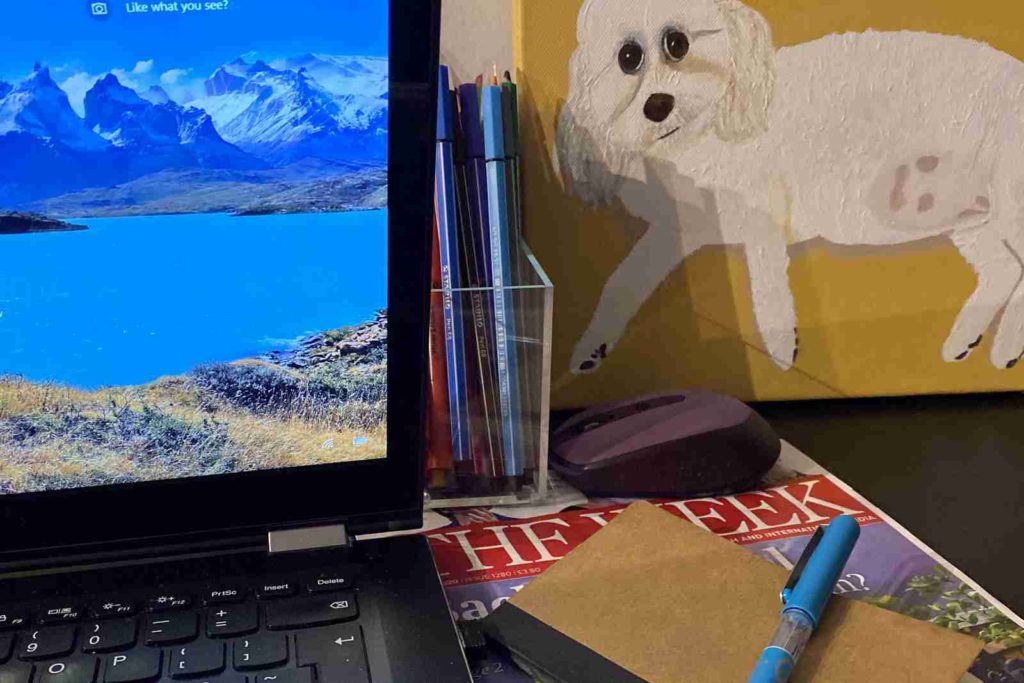
Tuesday 26 May
It has been confirmed that from June there will be a compulsory two weeks of quarantine for anybody flying into Britain, except if you’re coming from Northern Ireland. What! Why now? I shouted at the radio. As countries are coming out of lockdowns, some preparing for tourism and Portugal is lifting its quarantine rule, our home secretary Pritti Patel says it’s the right time to introduce border control. Surely during March and April it was the appropriate time to make it difficult to visit or re-enter the UK and we should now be devising an exit strategy on how air travel can resume, perhaps with laser thermometers at airports or giving people the option to show proof that they’ve already been tested for coronavirus?
With the infection rate and deaths decreasing, as London has much less than fifty new cases per day, it’s no surprise that one airline chief has said the new quarantine rule is ‘bonkers’ and many travel companies are calling it ‘the final nail in the coffin.’ One member of the public remarked, ‘it’s like shutting the doors once the horse has bolted.’ What about those who want and need to visit family abroad? How will this quarantine be enforced, especially as many people take public transport from airports?
When the virus was first spreading it was a plausible reaction to restrict global movement or test people coming from abroad. Slovakia, a relatively poor country without a strong healthcare system, has achieved the lowest per capita death rate in Europe, and new infections are presently in single digits. Within days of the first confirmed cases the Slovakian government closed its borders. Greece, with fewer than two hundred deaths, has been swabbing essential fliers at airports and quarantining them, not for two weeks, but for twenty-four hours, whilst they await test results. Perhaps our government’s thinking is that we still have to get ahead with testing and tracing before encouraging travel and foreign visitors.
Meanwhile the Dominic Cummings scandal continues to rumble on in the news. Is this key cabinet adviser who travelled from London to Durham in lockdown and drove to a castle at some point during or after being infected, to be forgiven or fired? If he stays in position, will people’s trust in government rules be affected? As much as we need those in authority to guide and manage effectively, again we are witnessing the public take the lead, as they prosecute and defend Cummings in this dominating drama.
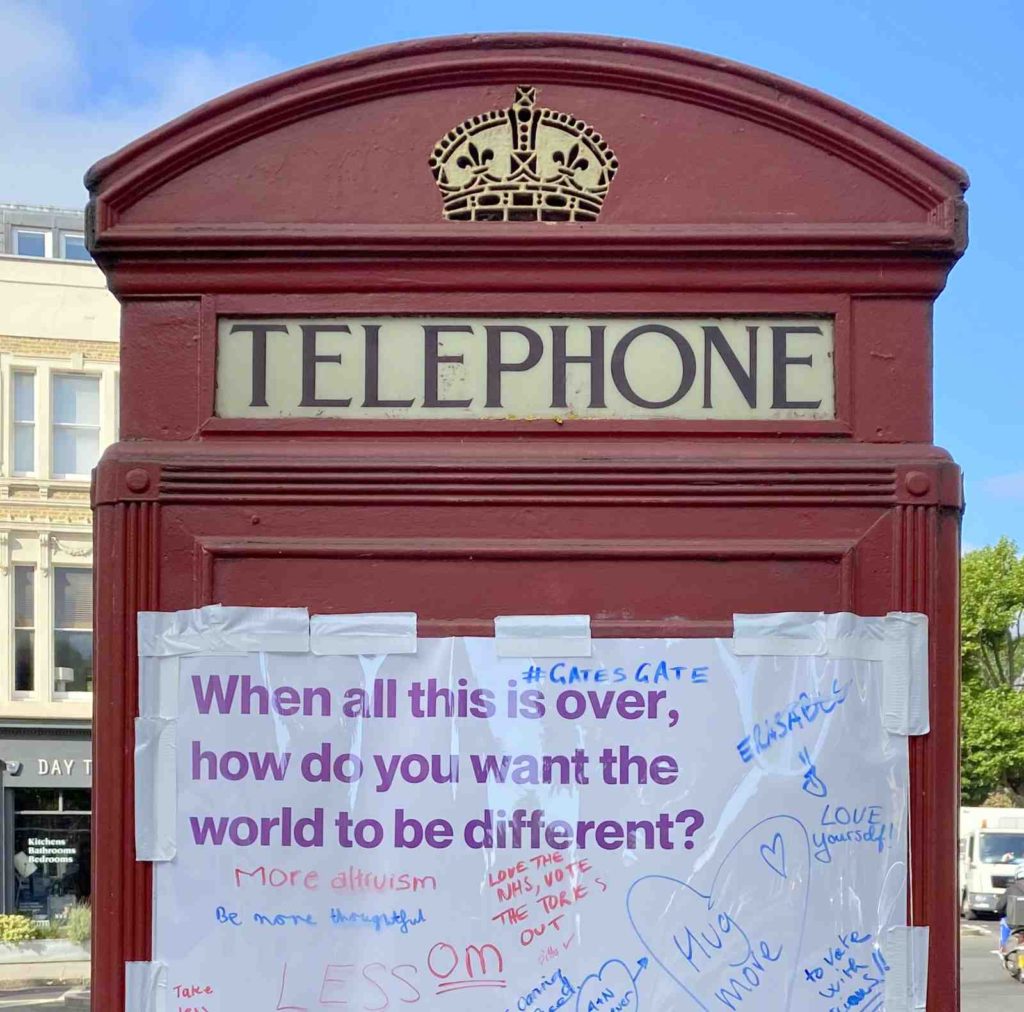
Wednesday 27 May
On Bank Holiday Monday the public crowded on beaches as we had another record temperature high. It was to be expected although nobody thought to hire some lifeguards. I was in Primrose Hill and the streets were super busy, at best strangers a metre apart. In the past I may have peeved by this, especially as young people stood in clusters. Truth is I am getting over lockdown. I still wash my hands every time I arrive home – a nice habit like taking off your shoes – but my cloth face mask is at the back of my sock drawer.
For one thing, I have become distrustful of the figures. How many deaths have been solely caused by Covid-19 or has this virus just speeded up the deaths of people with underlying conditions who have compromised immune systems? What about those who have died because, afraid to go hospital, they didn’t seek treatment for other illnesses? Lockdown itself has caused casualties – some people with disabilities have lost professional care, and others are self-harming because of the solitary confinement imposed upon them at the assessment units where they have been forced to isolate.
Dr Zach Bush, a physician with expertise in internal medicine, endocrinology and hospice care runs an organisation to develop solutions for human and ecological health. He points to the fact that influenza is a far more vicious killer than coronavirus which, as we have seen, mostly gives people mild symptoms and is critical for just five percent of the population. Inspired by this comparison I googled cancer, which a number of my relatives have had, and was shocked to learn how many people die every day from different cancers.
Widespread microbes have been around forever and viral genomes are constantly expressing themselves, something I learnt when mad cow disease first appeared. Dr Bush believes the problem is not Covid-19 but how we give pathogens a niche and allow them to be largely responsible for deaths, when we destroy biodiversity. Viruses, he says, ‘unmask the toxicity in our environments,’ for instance when there is more air pollution, we have more cases of flu and other respiratory diseases. The flu season, between October and May, is when Vitamin D levels drop and trees are not taking in all the atmosphere’s poisons like carbon dioxide and methane. To prevent a pandemic when a virus spreads out, Bush recommends that every autumn we need to consider how we travel and decrease pollution. He thinks that we may have one more season with coronavirus before its natural death by the summer of 2021.
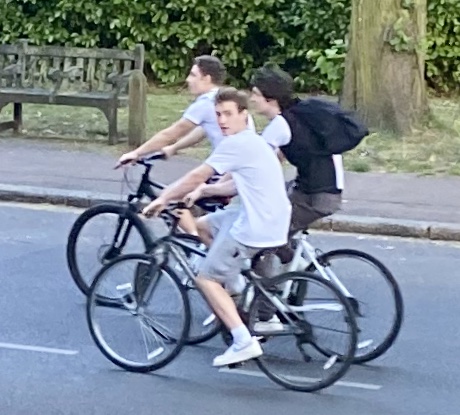
Friday 29 May
Everybody seems to agree that lockdowns trouble the disadvantaged and underprivileged the most. Even in our wealthy country and despite government intervention, there is a new portion of society who need food banks and are chasing financial benefits, rent and bill reductions, payment freezes and refunds, hardship grants and loans. We may have housed over ninety percent of those who were sleeping rough but back at the start of lockdown, a wise child said something I still remember, “how can you stay home if you don’t have a home?”
During this isolation there has been an exploding demand for some businesses and services, especially digital ones, whilst others, like where contact is involved, have shrunk or temporarily disappeared. The three and a half million people in the hospitality industry still don’t have a date as to when their businesses can re-open. Yesterday I met a restaurant owner who has become a greengrocer because “either I adapt or hand the keys back to my landlord.” Clothing sales were down fifty percent over the last two months but it’s not just the retailers who lose, outsourced workers are also afflicted. Even if the small businesses who can’t afford to buy expensive online presence survive lockdown, they will be affected by the rule of customer limits in shops. Perhaps the UK will soon follow other European countries who have taken the latest WHO guidance that one metre distance is safe enough because it could make a big difference for shops and other venues.
Meanwhile over in Sub Sahara Africa, where normal life is thousands dying every day from viruses like tuberculosis, malaria, HIV and cholera, recession will mean the poor have less money for running water, to repair pipes, buy mosquito nets and medicine. Journalist Charlotte Ashton has said that despite an indefinite lockdown, coronavirus has not really materialised in Zimbabwe where she now lives, and the official figure is fewer than one hundred and fifty cases. There hunger-related illnesses are a bigger problem and even before Covid-19 a third of under-fives were malnourished. Although hunger can be solved cheaply, Ashton says that money is being spent on improving intensive care units and ventilators. She believes this is because Covid-19, mostly imported via airports to Africa by politicians, businessmen and tourists, is a virus that the powerful and wealthy can get. Understanding how viruses threaten and lockdowns damage, I do believe that worldwide we need to find a balance between health and hygiene and individual security and freedom.
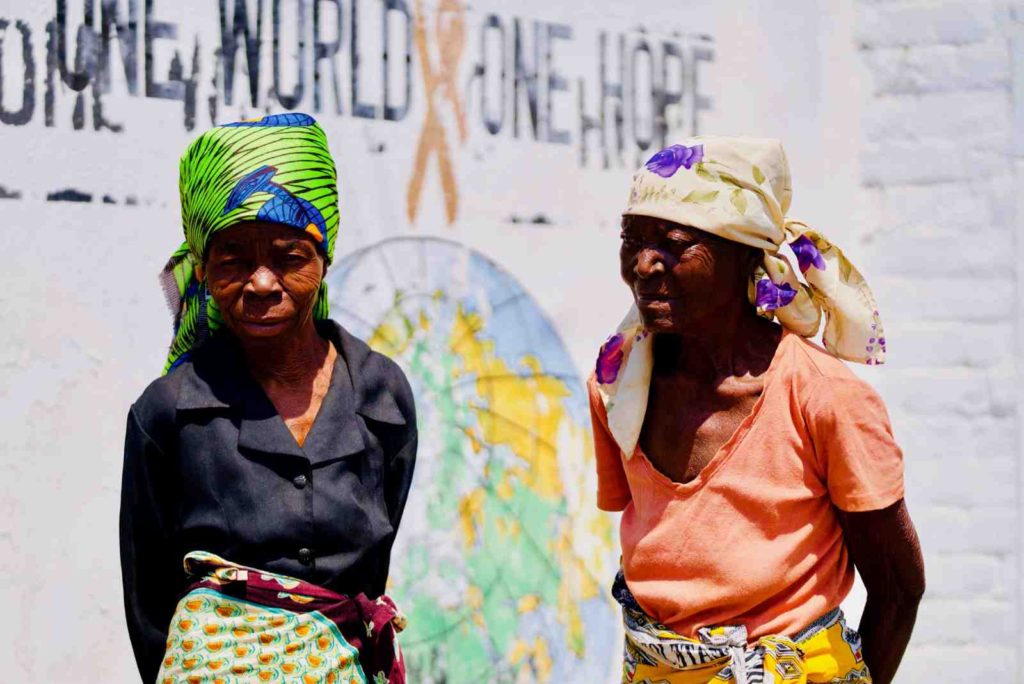
Sunday 31 May
What a week it has been. I feel like somebody has just opened their garage door where they have been storing untouched stuff for years and want me to declutter the space. In the middle of this neglected room heaped with so many things, I spy a box that has been handed down through generations and it’s bursting open with the contents spilling out and in my imagination the box is labelled racism. The brutal suffocation of George Floyd by a policeman has of course caused worldwide focus and fury and even some press are saying discrimination is ‘the greatest virus.’ Since the 2014 murder of Michael Brown and having seen the documentary Time: The Kalief Browder Story, I would have hoped that this kind of racial violence would not still be in storage.
George Floyd’s death was filmed by a passer-by on Tuesday and the rioting and burning in Minneapolis continues, with night curfews being ignored. On Friday the cop who held his knee to George’s neck for about nine minutes was arrested and the three other policemen who watched him do it have, for now, been fired. Today I heard that there are protests in more than forty American cities and the anguish has also reached Washington. Trump, whose second response was to tweet that the looting will be dealt with by shooting, has mobilised the National Guard and, for the second time in a week, he’s been reprimanded by Twitter, this time for glorifying violence. As I watch people of all skin colours set fire to buildings and face off against batons, tear gas and rubber bullets, I think this latest murder must be the straw that has broken the camel’s back, a camel that’s in a desert where there is high unemployment and coronavirus has not been contained. Also over the weekend it was announced how in the UK people of colour were more likely to be randomly stopped, questioned and possibly fined by the police during lockdown and there were peaceful Black Lives Matter protests in London, Manchester and Cardiff.
Another box in this imaginary cluttered garage, and which looks like it will take time and effort to sort through is labelled Hong Kong. Inside there’s the hurt and anger of protesting Hong Kong residents who feel their autonomy and ‘one country, two systems’ principle has been bulldozed by Beijing and fear more Chinese surveillance and the erosion of Hong Kong’s democracy.
Whenever I approach a big decluttering job I have to be optimistic, believe that the chaos can be resolved and know that any organising I accomplish is a step in the right direction. However I do need my clients to be willing to throw away what needs to go and to store with love and care that which is precious.
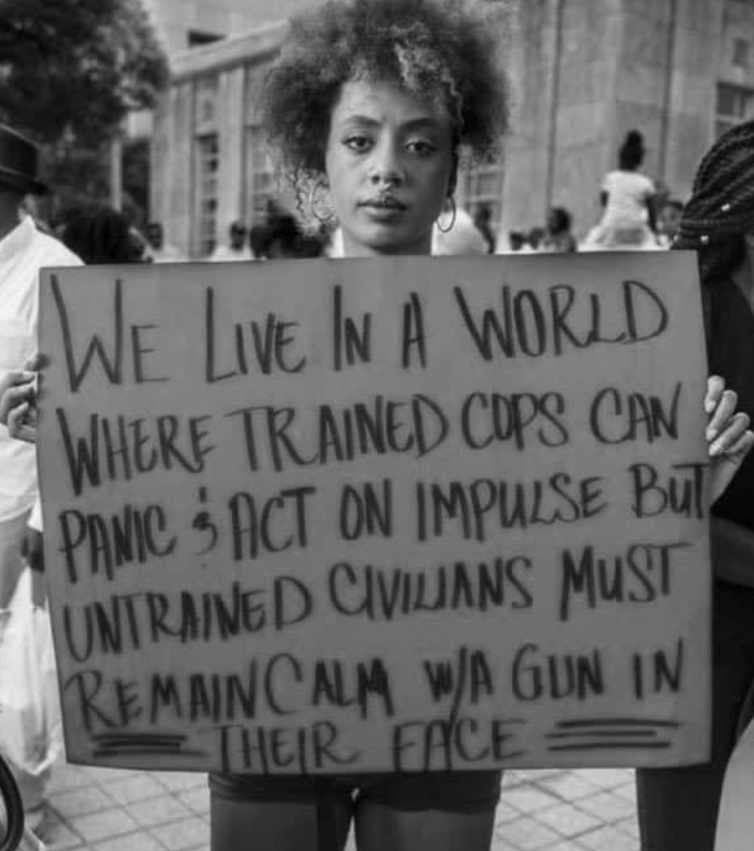
Monday 1 June
The time has arrived when toddlers can enter their nurseries whilst their parents keep distance and some pupils can go back to school. Today over two million people who have been strictly shielding for ten weeks will venture outside if they wish with one other person. For the rest of us, we are officially allowed to meet in groups of six in gardens, a liberty that has been dubbed ‘the joy of six.’ Some SAGE scientists think it’s way too early for this lockdown relaxing which Boris Johnson announced before the hot weekend we just had. Perhaps he wanted to give people good news after a week of reactions to Dominic Cummings who became more unpopular with the public after his rose garden press conference in which he defended his flouting of lockdown rules.
Yesterday as I passed by the Primrose Hill shop Press, I saw an item of clothing in the window and thought, with a spark of excitement, about how in two weeks-time I will be able to do non-essential shopping. There was a sign on the door explaining the new shop measures, like UV sanitising of clothes after they’ve been tried on, and how Press will provide hand sanitising, optional gloves and seating outdoors for those waiting to enter.
Although many UK shops are predicted to open with huge discounts on the stock they received just before lockdown and haven’t had a chance to sell, some say that the public will continue to conveniently buy online. Hearing of this morning’s enormous queues outside some IKEA stores, I believe our desire for offline shopping will return. Perhaps initially shops selling fancy clothes will fare less well whilst social gatherings are limited, and, I do wonder how much browsing will be done. Also today outdoor markets and car showrooms are re-opening but companies like Rolls-Royce and Renault have had to make many employees redundant. Apparently during our lockdown less than two hundred cars were made, down from one hundred thousand.
One or two of the popular pubs in Primrose Hill were selling take-away pints and after chatting with a few thirsty locals happy to join long queues, I realised people are really missing their pubs. Despite liquor shops being considered essential throughout lockdown, it’s clear that people value placemaking, or in other words, being able to come together in the real, non-digital world for favourite and fun activities. Even with my ongoing resolution to buy less clothes and be more mindful with my purchases, I’m looking forward to when I can go shopping with a friend and we can end the trip hanging out at a café.
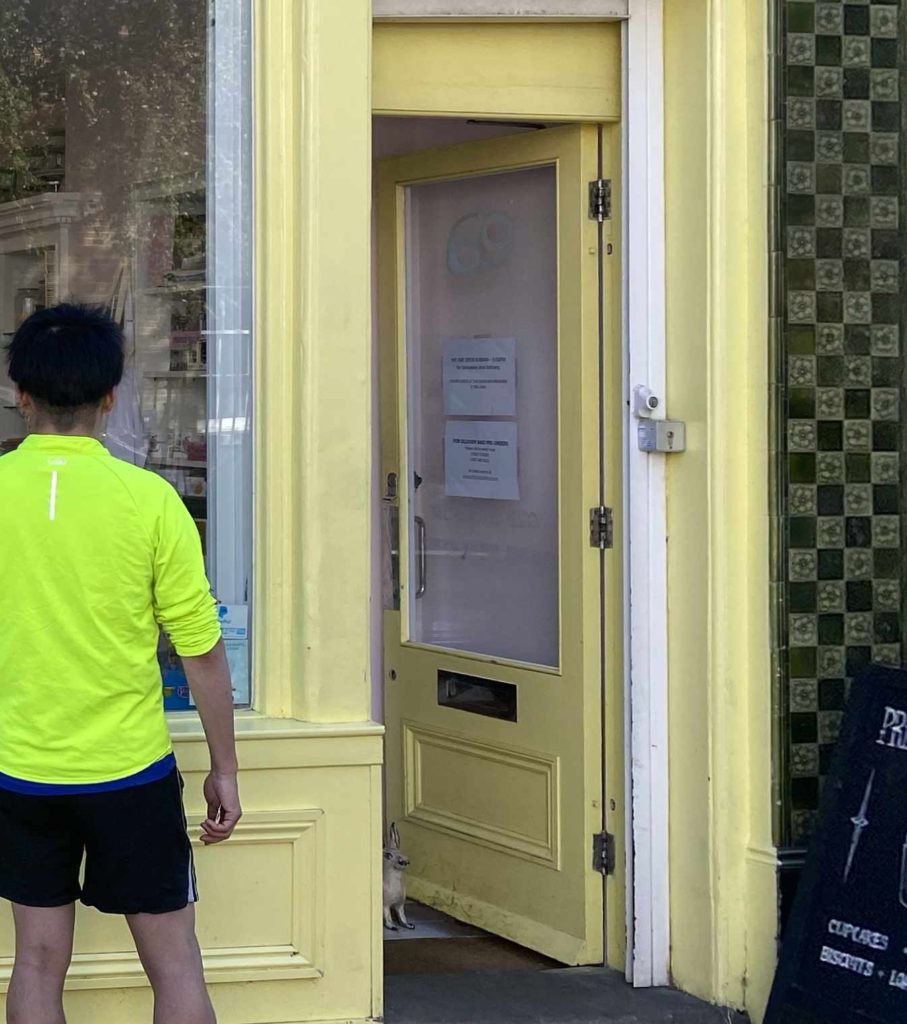
Tuesday 2 June
We still don’t have an app ready to go in the UK to trace or track coronavirus. At present about twenty-five thousand people are working as tracers at call centres for a system which relies on our ‘civic duty’ to report when we have Covid-19 symptoms. The people who have come into contact with an infected person will then be asked to stay home for fourteen days. Some people may be asked to isolate repeatedly even if they have had the virus. It is not compulsory for somebody with symptoms to book a test and give out the phone numbers and emails of those they have met and there are fears that people who don’t have financial security or statutory sick pay will not stay home. Younger people who are less likely to get seriously ill from the virus may also be more blasé.
Today the Statistics Authority is claiming that the number of actual tests being carried out is far less than the government has been suggesting. Apparently the total number of tests being announced in the daily briefings has included those that are in the post or where one person has been multiply checked. There is also strong feeling that many tests are ‘not fit for purpose,’ and it’s been reported that at least thirty percent give false negatives. Unreliability has been shown with the finger-pricking antibody tests which some pharmacies are now no longer selling.
The consensus is that we can only feel secure with our freedom and increase it if we have accurate and faster testing and tracking. I’m happy that Premier League footballers will be back on their pitches from mid-June because the players are being tested regularly, but what about people still waiting for medical treatments and dentistry and the many, especially in the older generation who have been really isolated, who want to return to their places of worship and gather with the communities which support them spiritually?
Along with more practical hunting of the virus, it’s also been pointed out that industries like hospitality, tourism, aviation and events need strategic support and stimulus so that even without a summer bounce back they can survive until next March. In New Zealand Jacinda Ardern has urged businesses to consider a four-day week so that domestic tourism can be boosted. I like this idea but if this were to happen in the UK, alongside the new trend we may see for staycations, we would need to make sure that we have enough public toilets and guidance regarding litter. Even in my neighbourhood far too often I come across discarded single-use plastic gloves on the pavements or in the baskets of bikes you can hire.
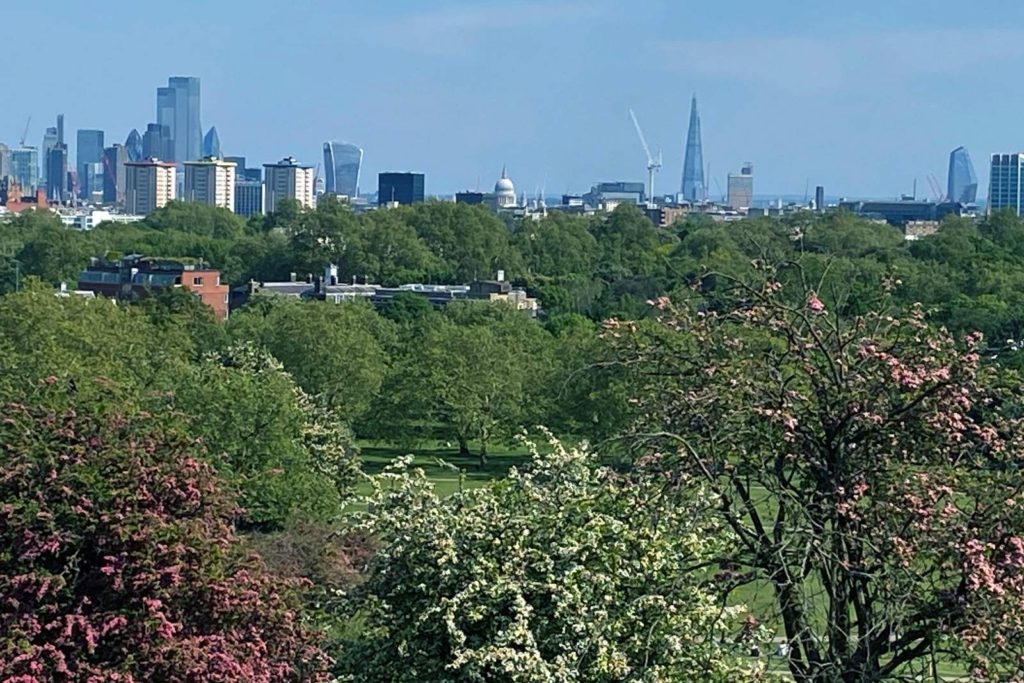
Wednesday 3 June
As another human ordeal also provoked by somebody who ‘can’t breathe’ dominates headlines and worldwide people continue to protest that ‘black lives matter,’ I decided for this diary entry to focus on positives, only to be reminded that life is not just good or solely bad. For instance I love these sunny days we’ve been having but our record-breaking hot and dry May has caused alarm for a few water boards which have suggested we let our lawns go brown.
For a while now I’ve been worrying about rumours of increased poaching in Africa and the accelerated deforestation of the Amazon. Covid-19 is causing chaos in South America and especially Brazil where changes in law make it easier to take land away from indigenous populations. However I promised myself to write about the inspiring stuff like lower global pollution levels and how after six hundred years, rare birds have been spotted hatching in the wild in the UK. Recently some of the biggest food and beverage companies started to fund the making of plant-based bottles that can degrade easily and foremost fashion brand Gucci announced that it will reduce from five to two seasonless shows a year because as its creative director said, “the fashion industry has become excessive and outrageous greed has made us lose harmony and care, connection and belonging.”
Now that we know the government can very much intervene when it comes to saving lives, I hope we will see more policies focused on health, like measures to help curb obesity. As many people have admitted to over-eating comfort food during the pandemic, perhaps we could have less TV advertisements that encourage us to snack on unhealthy food. The National Farmers Union’s petition, asking that the UK stops importing food that has been produced in ways that would be considered illegal here, is gaining momentum since the chef Jamie Oliver, one of my personal heroes, has recently been promoting it.
Some teachers have told parents not to worry that their children are not getting full-time formal education. We do have a real problem for those children for whom school is a lifeline but these teachers believe that adults can grow their kids so much through exampling calm, strength and joy. My friends who are parents say they enjoy having this extra family time, and with my relatives I find I have more meaningful and reflective conversations. I do hope that all the many tragedies, disruptions and painful discoveries that have come about and been exposed because of Covid-19 will allow us all to realise and embrace new and fairer ways of living in love and oneness.
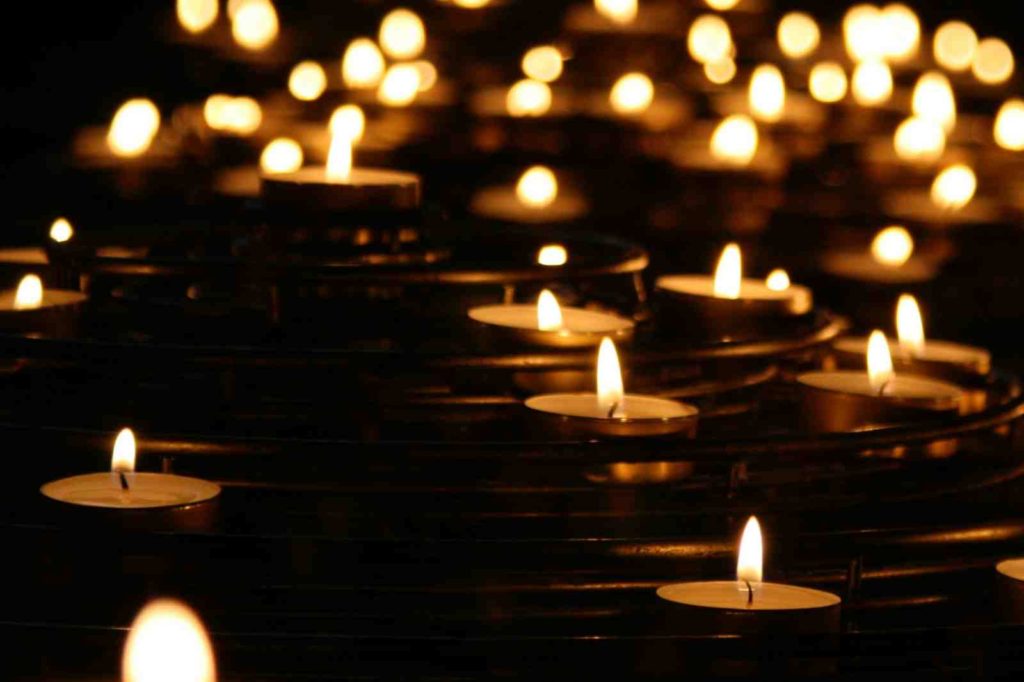
Find me on Facebook here | Instagram here
Or email on nicolamanasseh@gmail.com


